Sections
Selected media organisations
Manufacturing consent
Liberating readings
Disinformation
No Fear 😬 No Favour
“Don’t shoot the messenger” is a commonly heard refrain. Regarding journalists, it may be something of a figure of speech in some countries (contexts), but, by no means all countries. Reporters Without Boarders data unequivocally shows the countries of the Arabian Gulf do not have a free press by any stretch of the imagination. The same applies to the wider Middle East and North African context to varying degrees — Qatar and Al Jazeera are a notable exception to the rule (highlighted below). While journalists on the Arabian peninsula may not be shot for critiquing government policy by default, fines and imprisonment are par for the course and occasionally, things do indeed turn out far worse (consider, for instance, the case of Jamal Khashoggi).[1]
Moreover, Freedom House’s “Freedom on the Internet” indices shows too that the Gulf’s citizens do not have unfettered access to the internet (see: Arabian Gulf datasets). Leading efforts to pre-emptively stifle possible threats to regime security have been Saudi Arabia and the UAE. These two states’ have been mobilising cutting-edge surveillance technology and foreign expertise to suppress dissent within their borders and amongst their citizens abroad (Bing & Schectman, 2019a, 2019b; Deibert, 2023; Uniacke, 2021, p. 980). The story of “Project Raven” reveals how former U.S. government hackers have employed state-of-the-art cyber-espionage tools on behalf of a foreign intelligence service that spies on, amongst others, journalists. According to Bing and Schectman (2019a, 2019b), various reports have highlighted the ongoing cyber arms race in the Middle East, as the UAE and Saudi Arabia and other nations attempt to sweep up hacking weapons and personnel faster than their rivals. The Reuters investigation is the first to reveal the existence of Project Raven — in the UAE — providing a rare inside account of state hacking operations usually shrouded in secrecy and denials.
Uniacke (2021, pp. 979-980) evaluates the attempts of Saudi Arabia and the United Arab Emirates to depoliticise and de-civilise online debate through promoting regime-friendly narratives that “expose, criticise, crowd-out, delegitimise and ultimately deter political dissidents.” It is said that Saudi security officials “sought to galvanise regime supporters into policing the online space, adding an extra layer of surveillance capability to their already muscular communications interception technology.” According to Deibert (2023) the rise of authoritarian regimes in many parts of the world in the past decade has raised new questions about the durability of the liberal international order. As has been widely noted, many ruling elites have been able to slide toward authoritarianism by limiting or controlling political dissent, the media, the courts, and other institutions of civil society. Yet. “far less attention has been paid to the pervasive role of the mercenary spyware industry in this process … there is little doubt, however, that spyware has been used to systematically degrade liberal democratic practices and institutions.”
Selected media organisations
Sections
Selected media organisations
Manufacturing consent
Liberating readings
Disinformation





































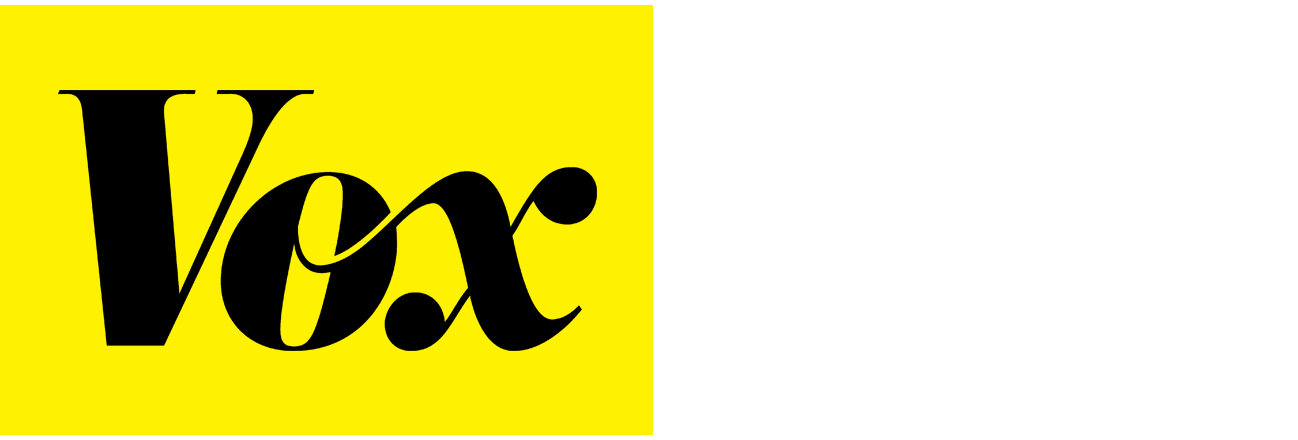
The Rule Breaker
Qatar’s Al Jazeera is the exception to the rule (the one that submits that journalistic pursuits in the Middle East region is fraught with restriction be it in Yemen, occupied Palestine or across the oil-rich Arabian peninsular). Al Jazeera is Qatari government-funded but, it really does offer free and fair coverage and rivals Western multinational media outlets in terms of its global coverage and quality of documentaries and reportage. If in doubt, check them out: Al Jazeera documentaries
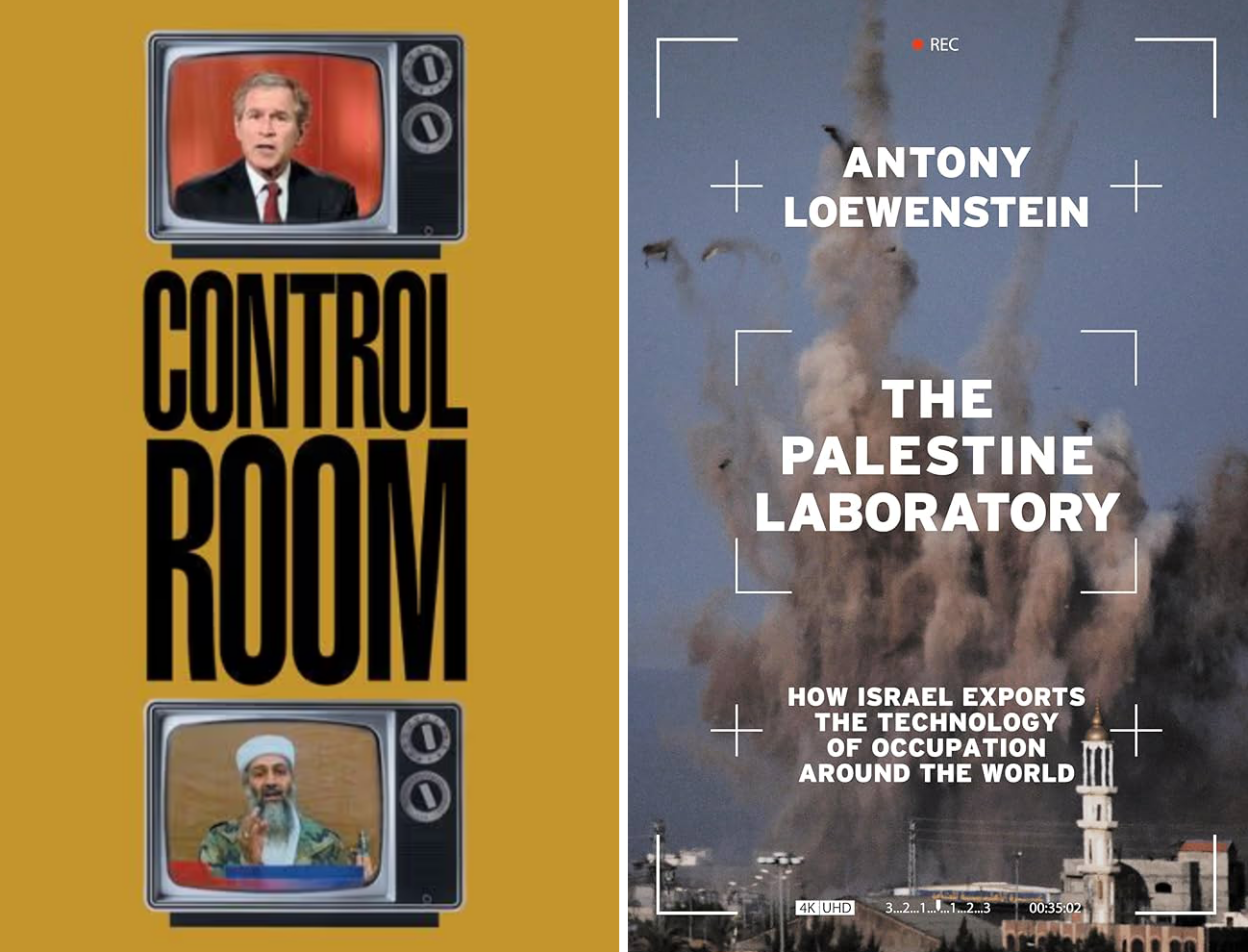
♦ The Palestine Laboratory (2025).

♦ Borderland (2014).
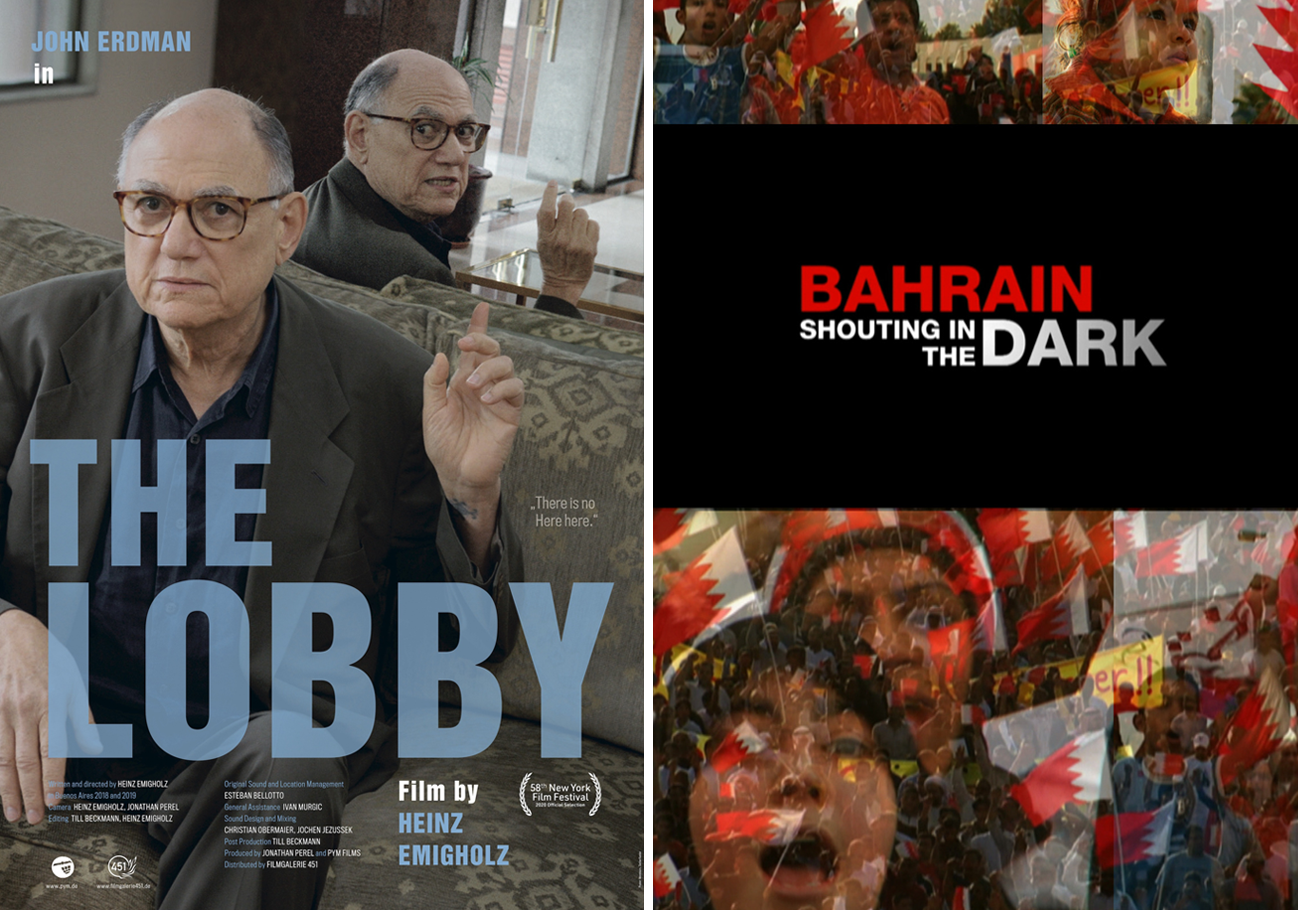
♦ Bahrain: shouting in the dark (2011).

♦ Israelism (2024).
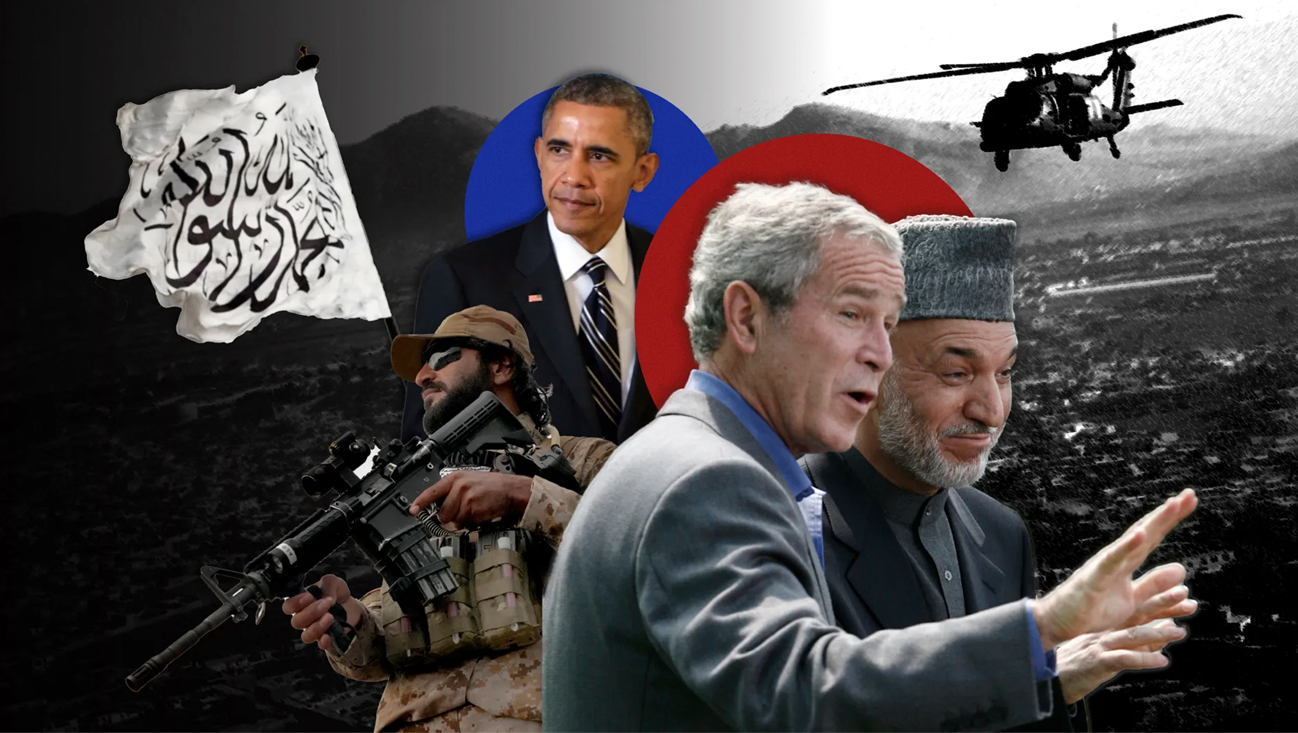
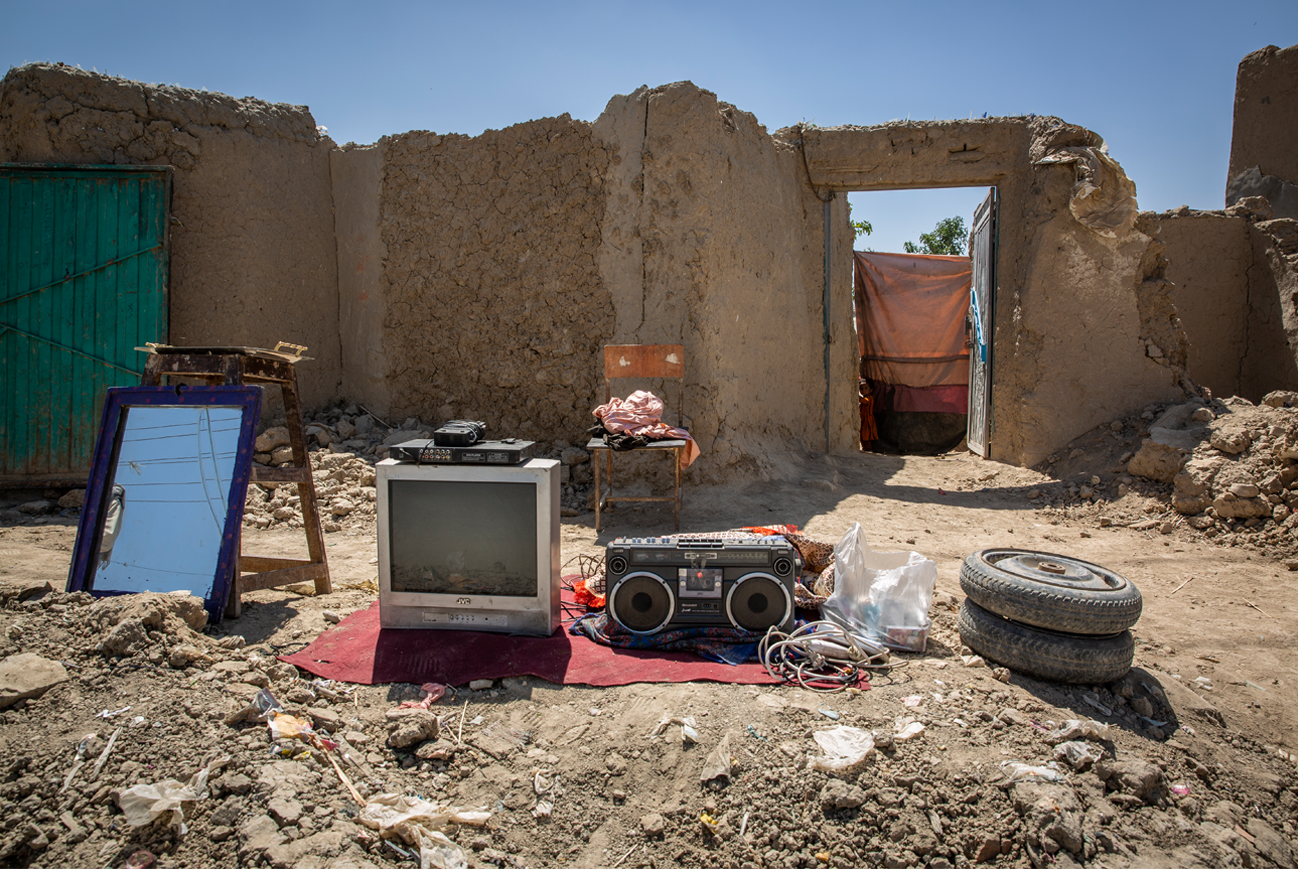
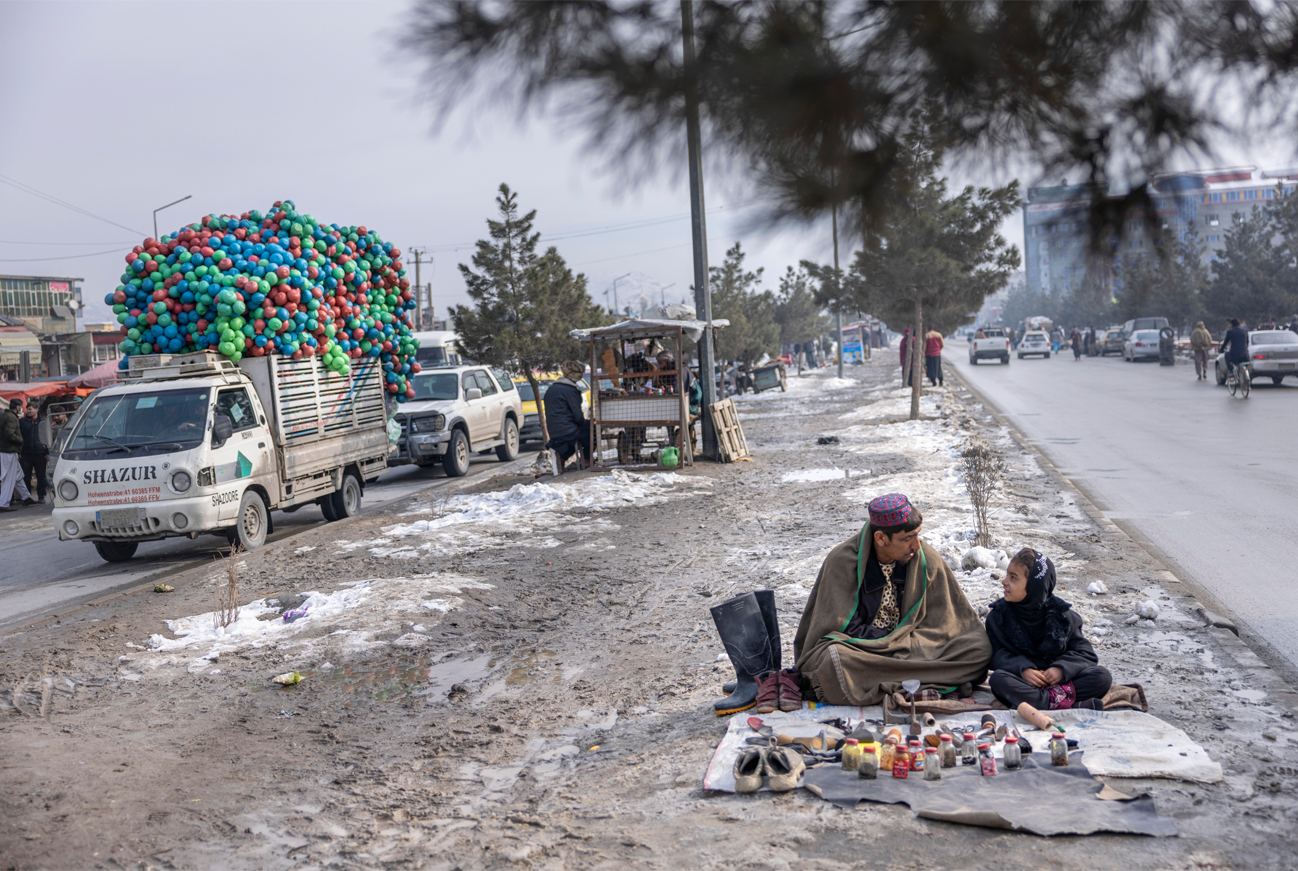
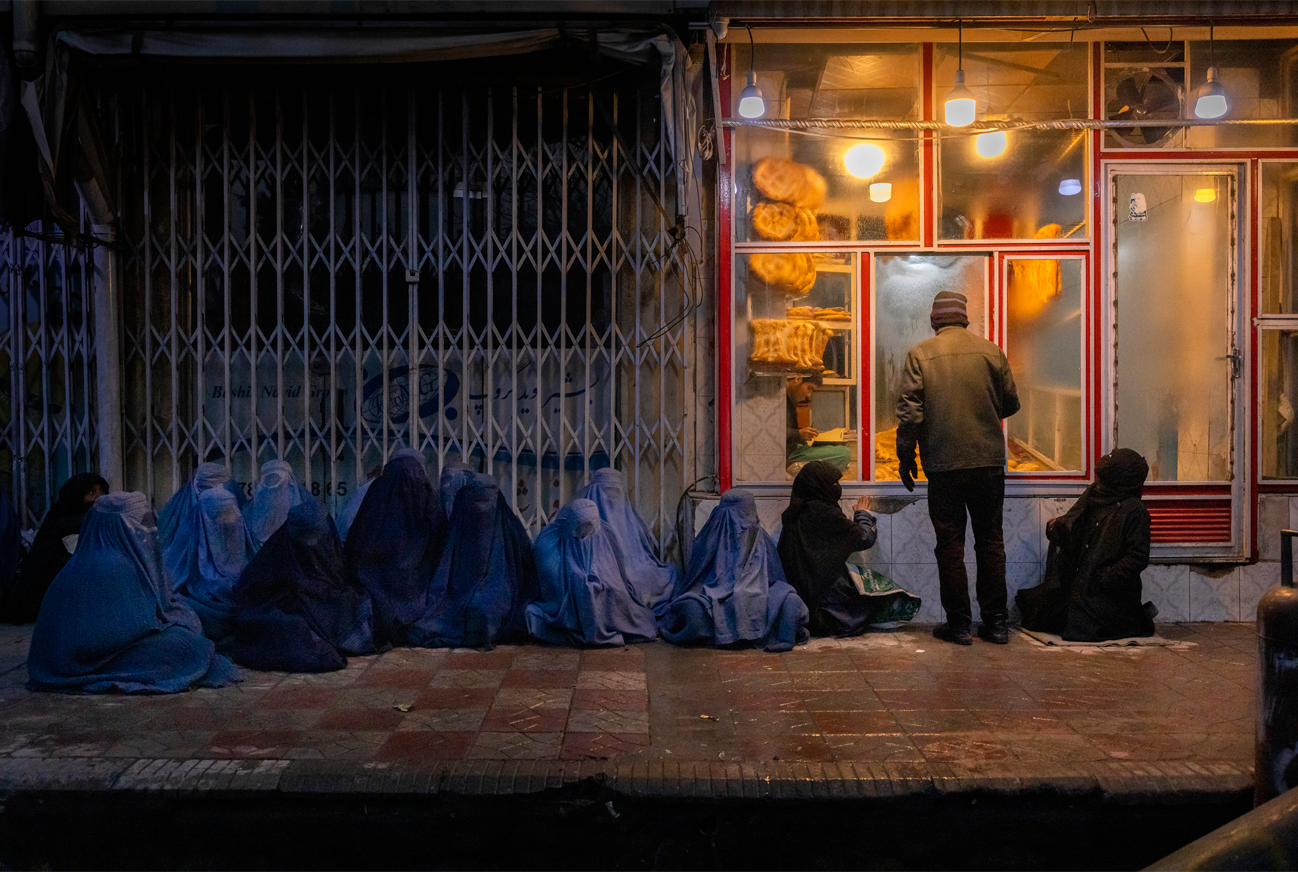
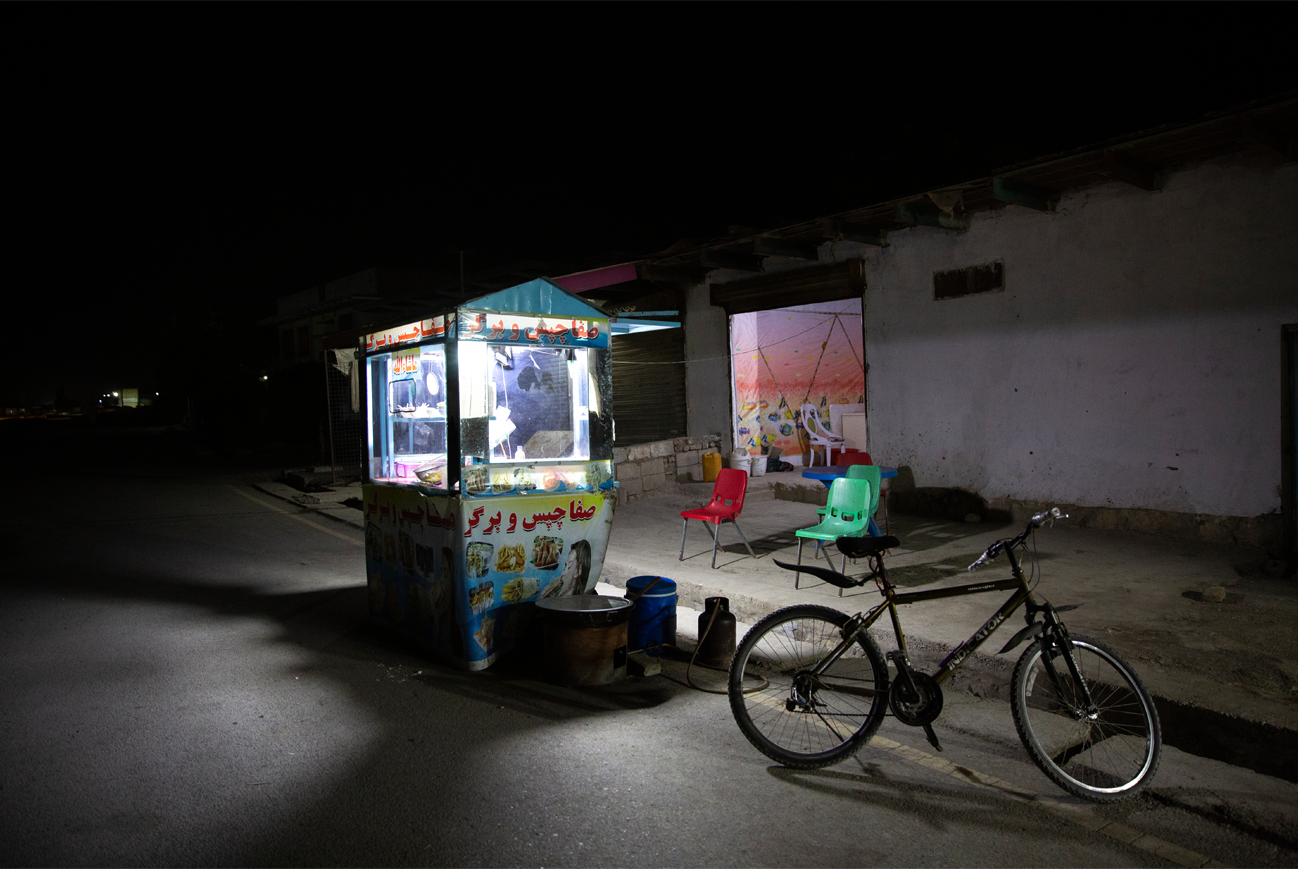
Manufacturing consent
Sections
Selected media organisations
Manufacturing consent
Liberating readings
Disinformation
In Manufacturing consent, Herman and Chomsky (1988) contend that the mass communication media of the U.S. “are effective and powerful ideological institutions that carry out a system-supportive propaganda function, by reliance on market forces, internalised assumptions, and self-censorship, and without overt coercion,” by means of the propaganda model of communication.
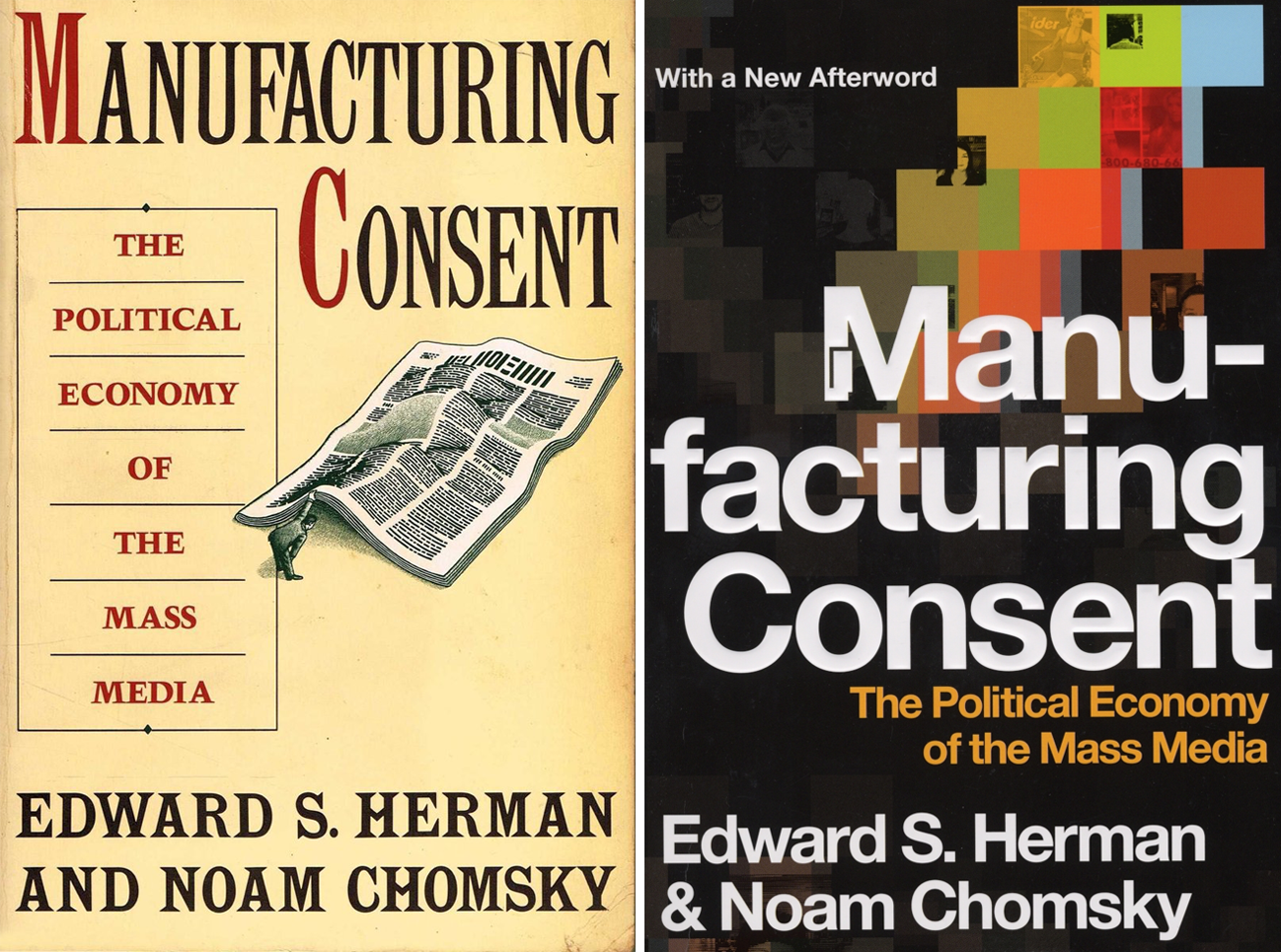
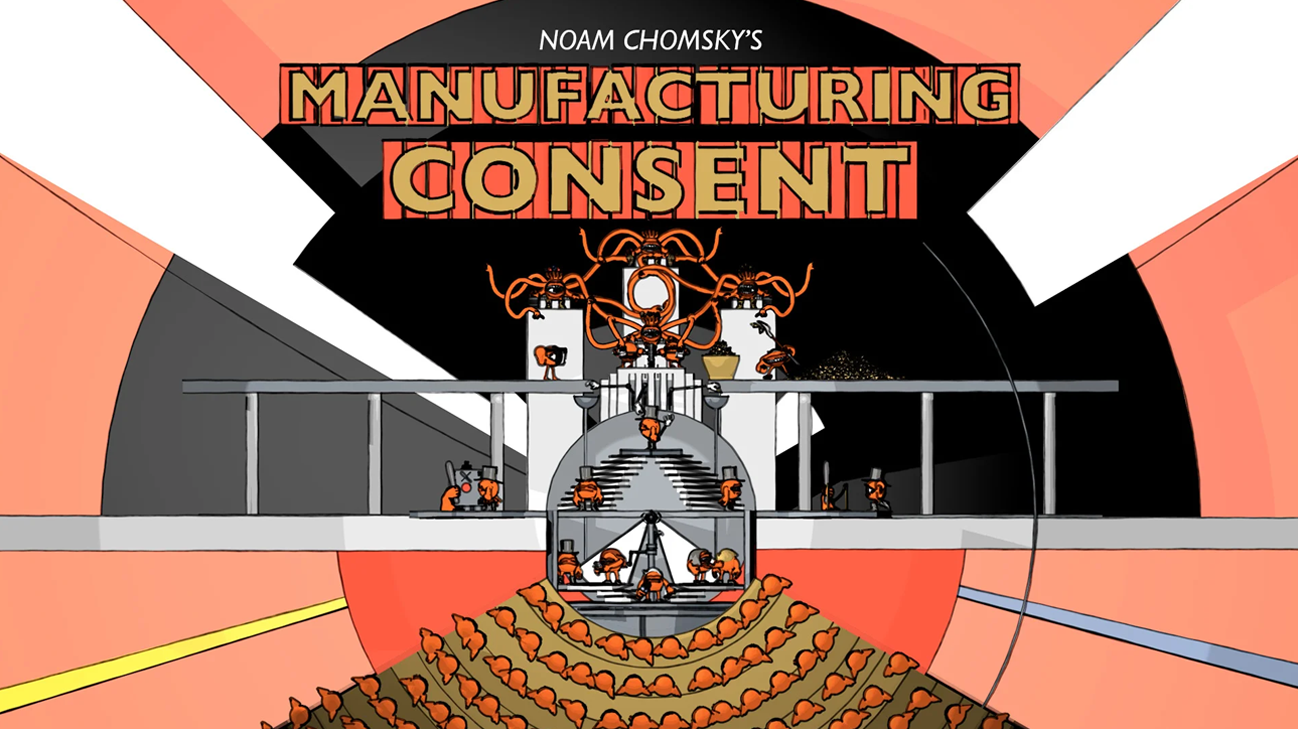
A pictorial overview
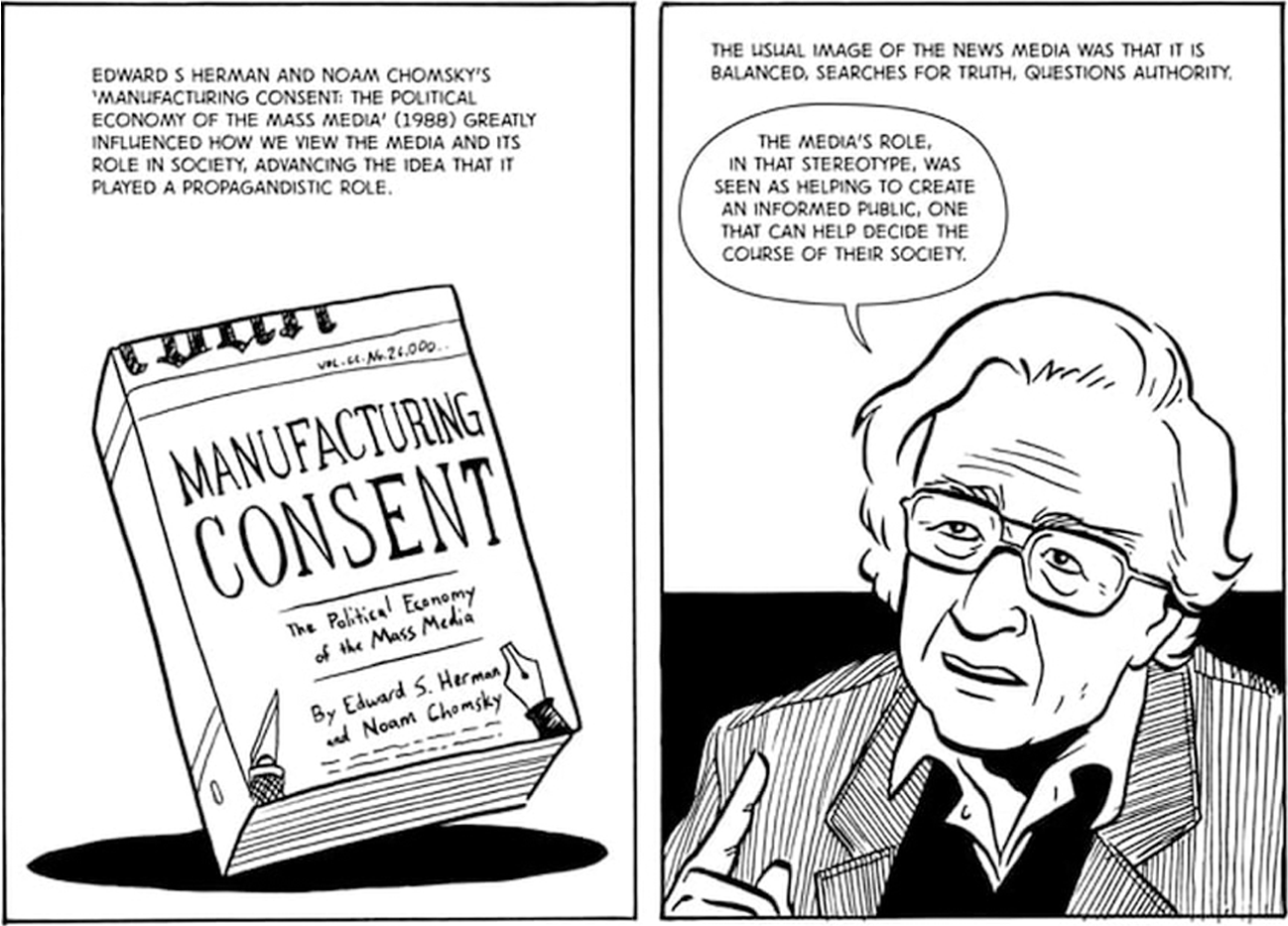
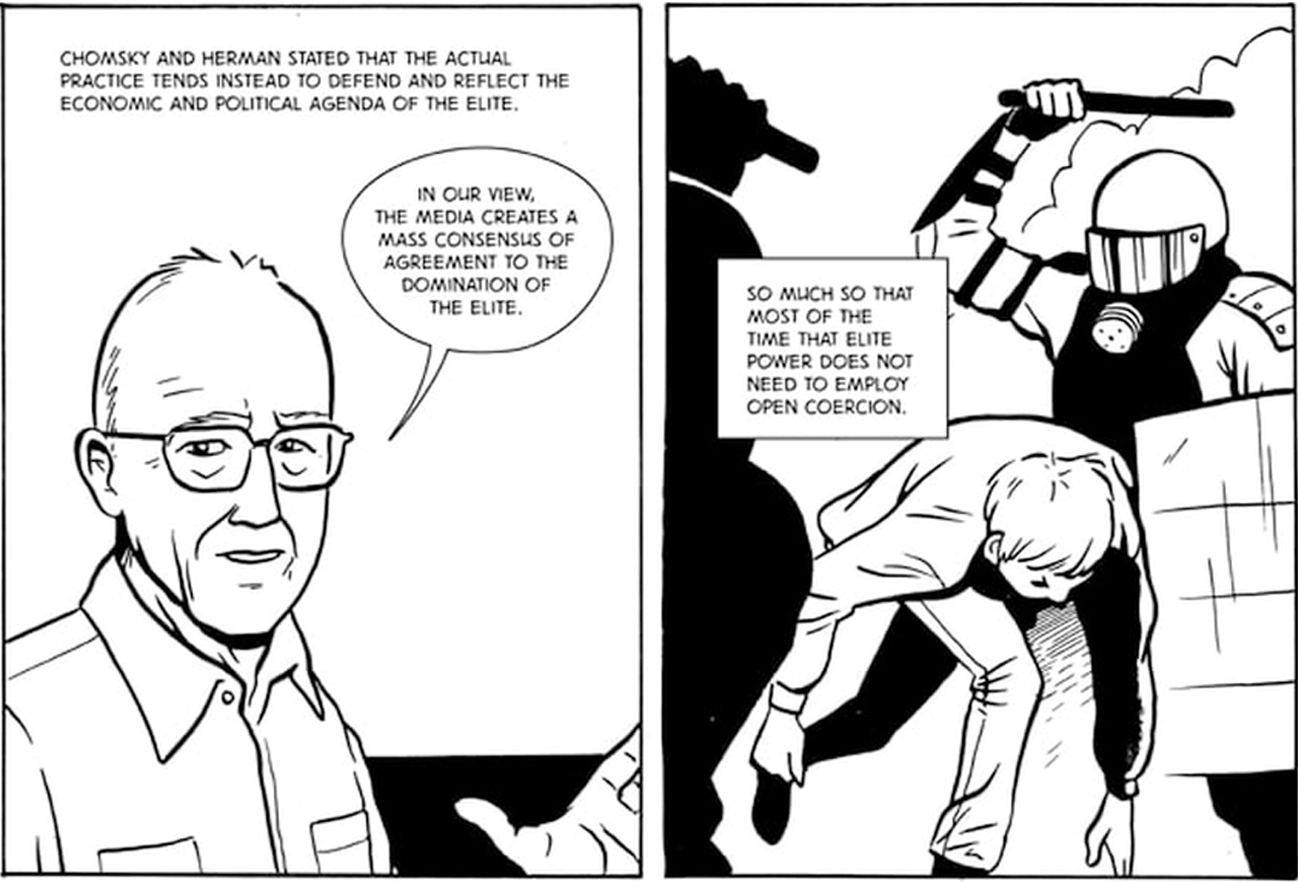
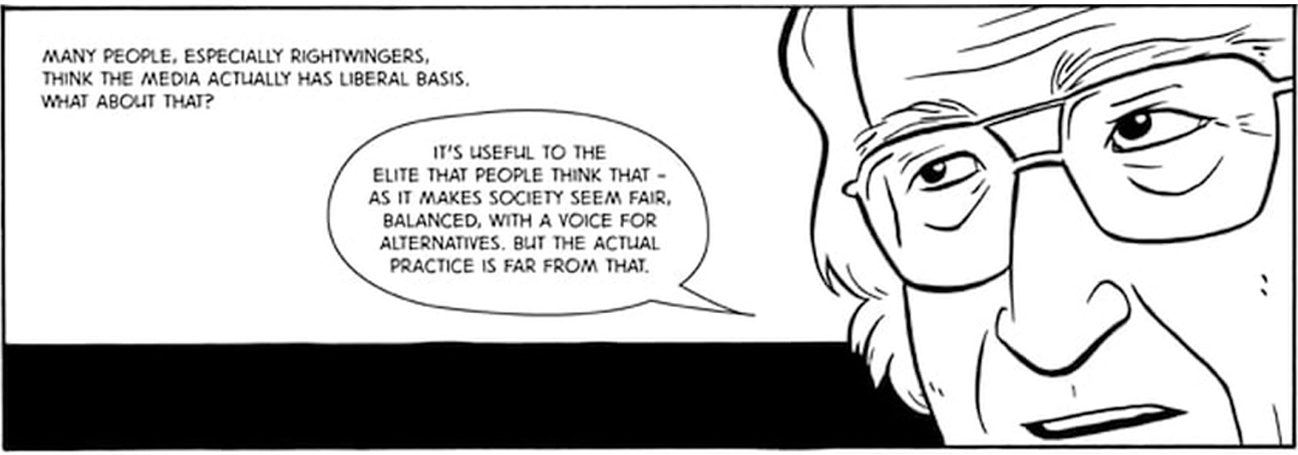
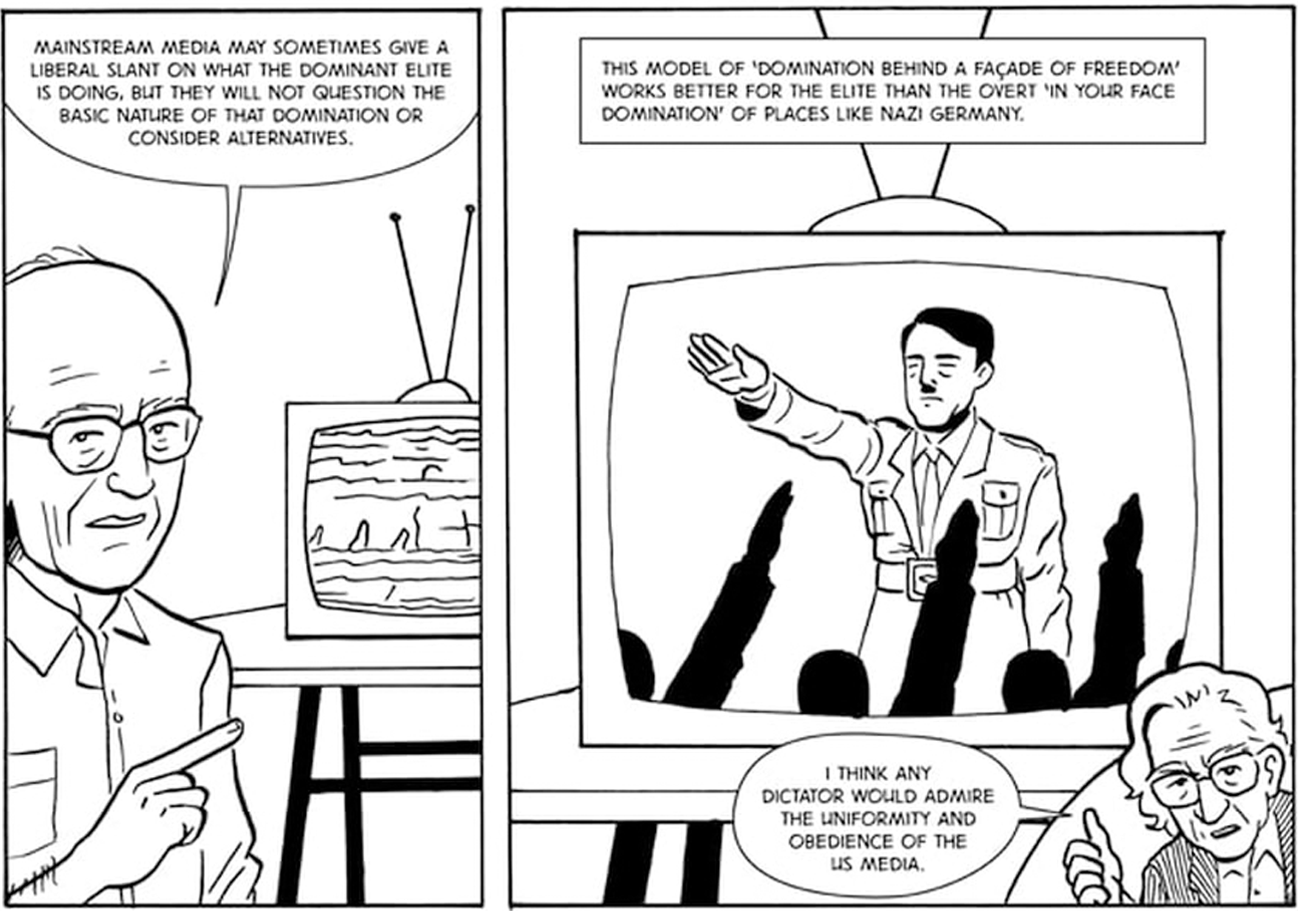
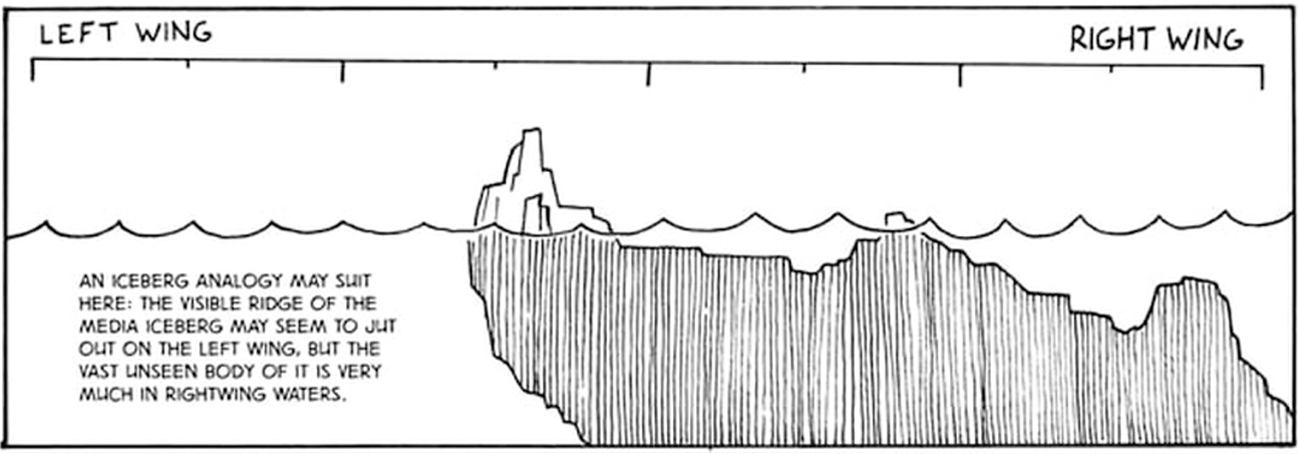
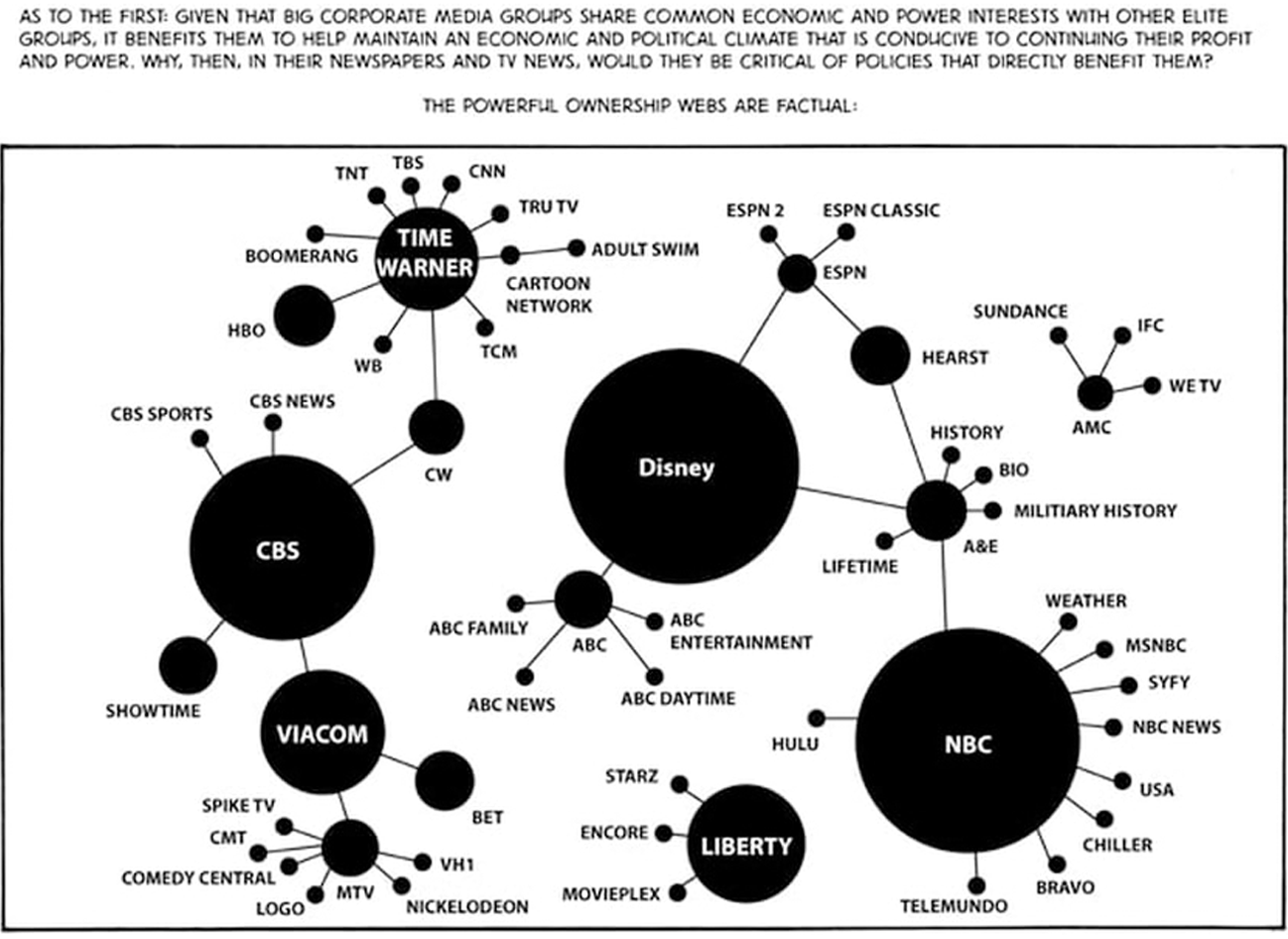
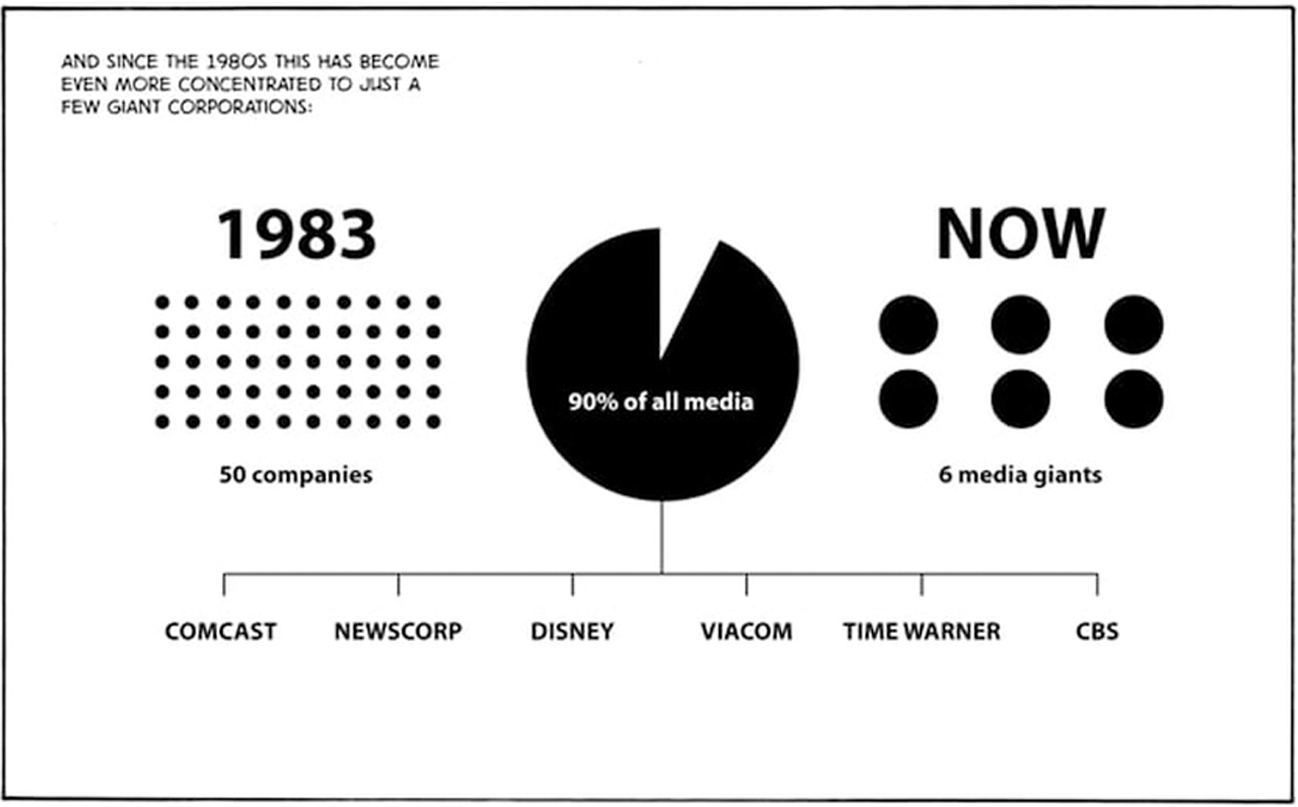
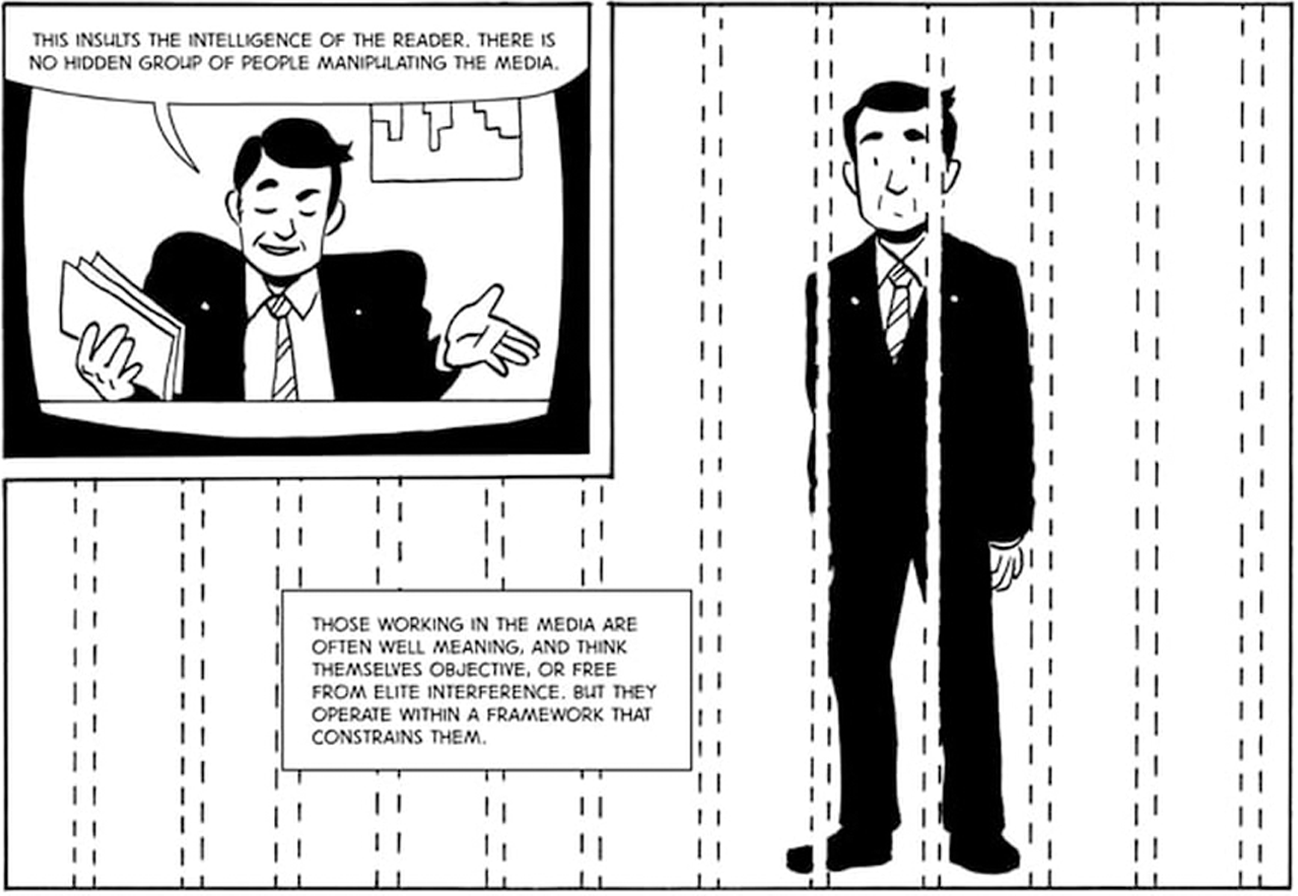
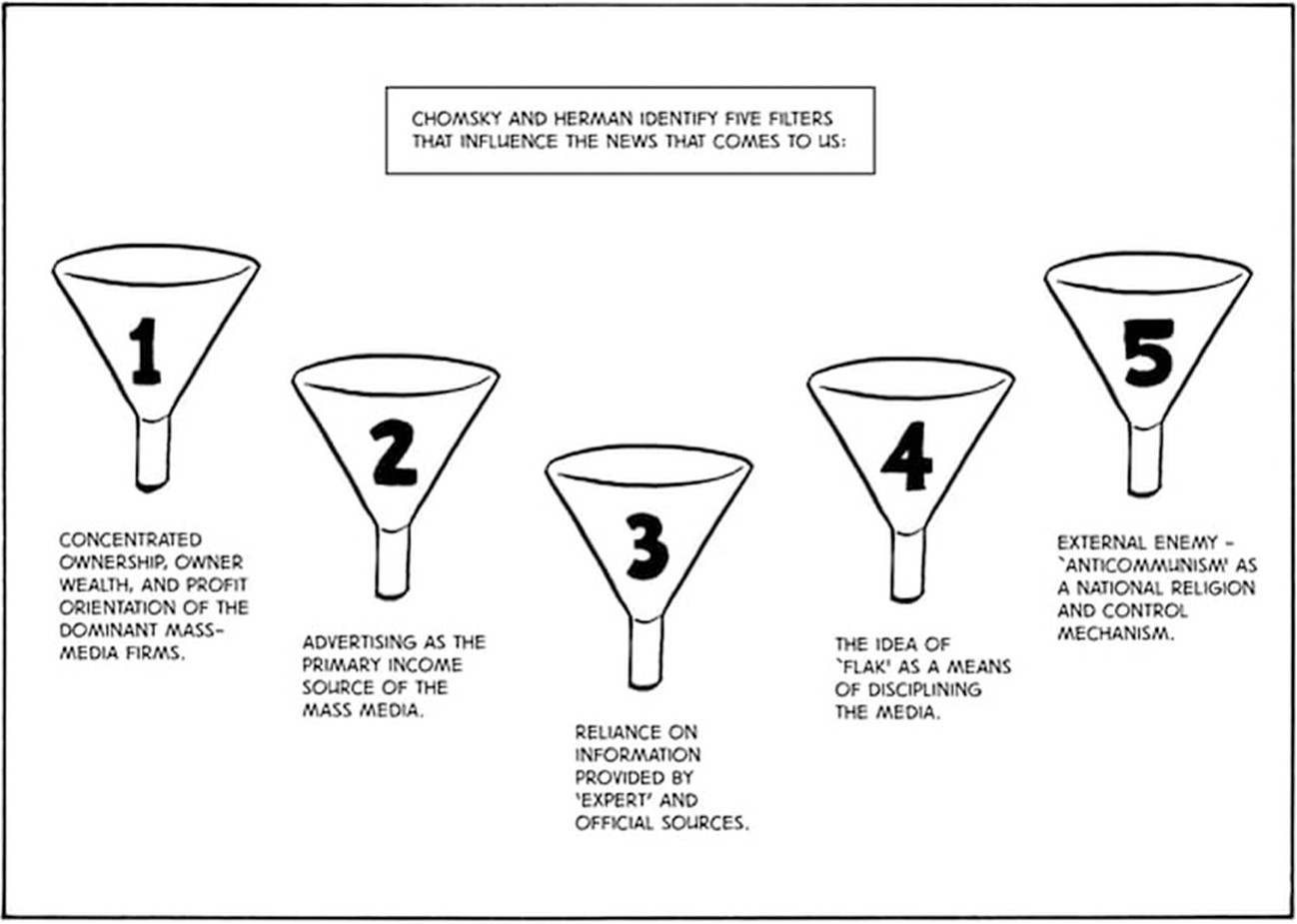
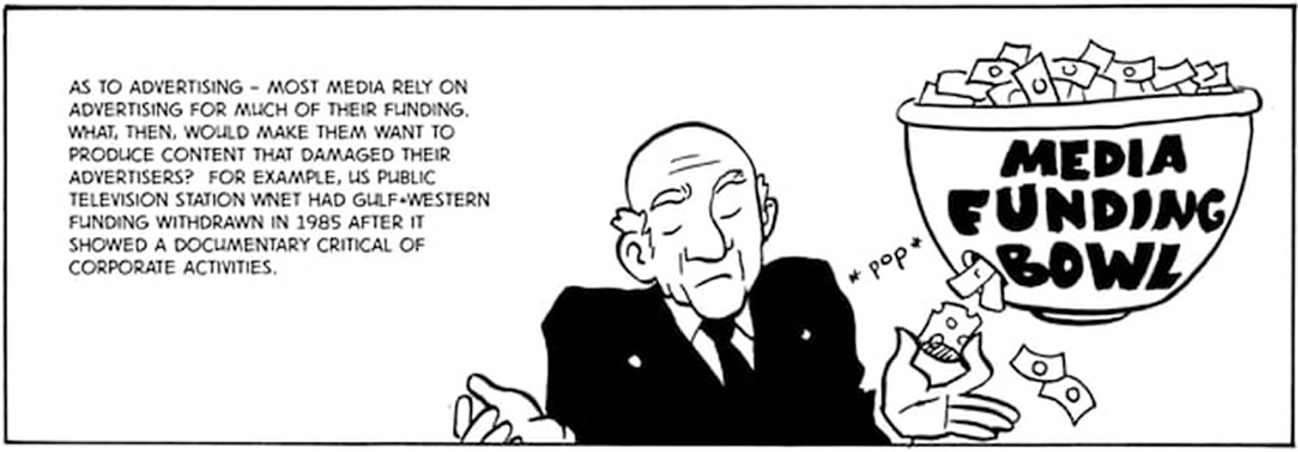
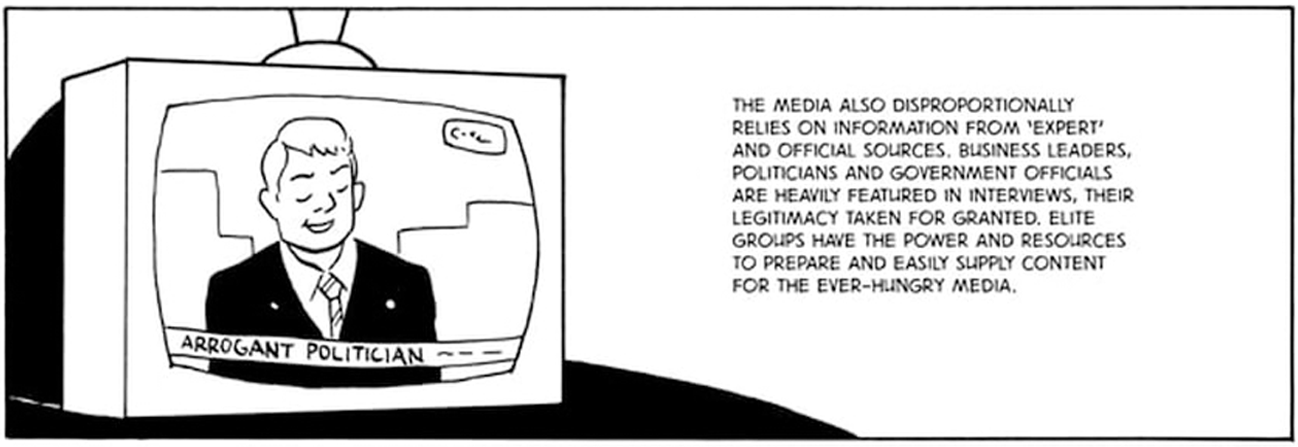
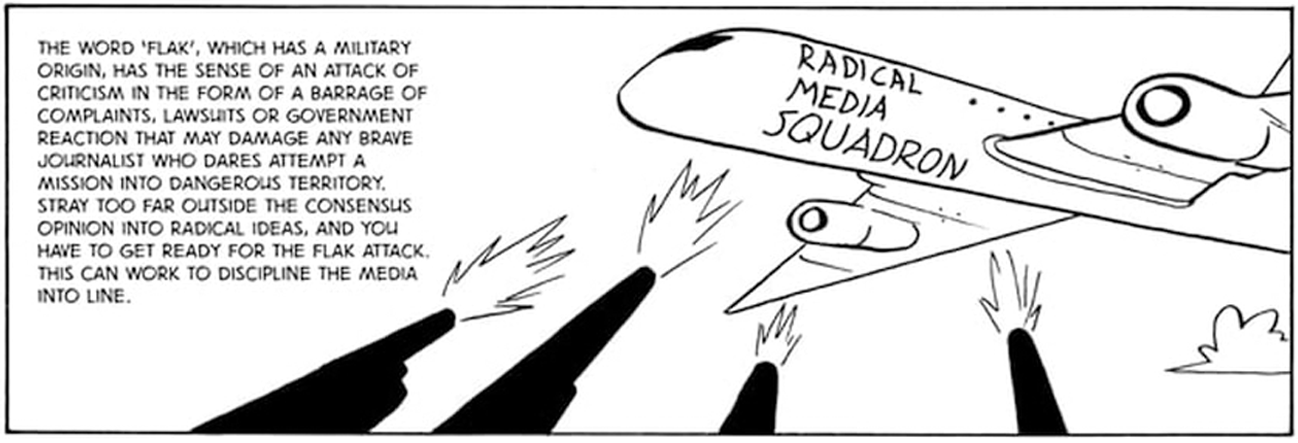
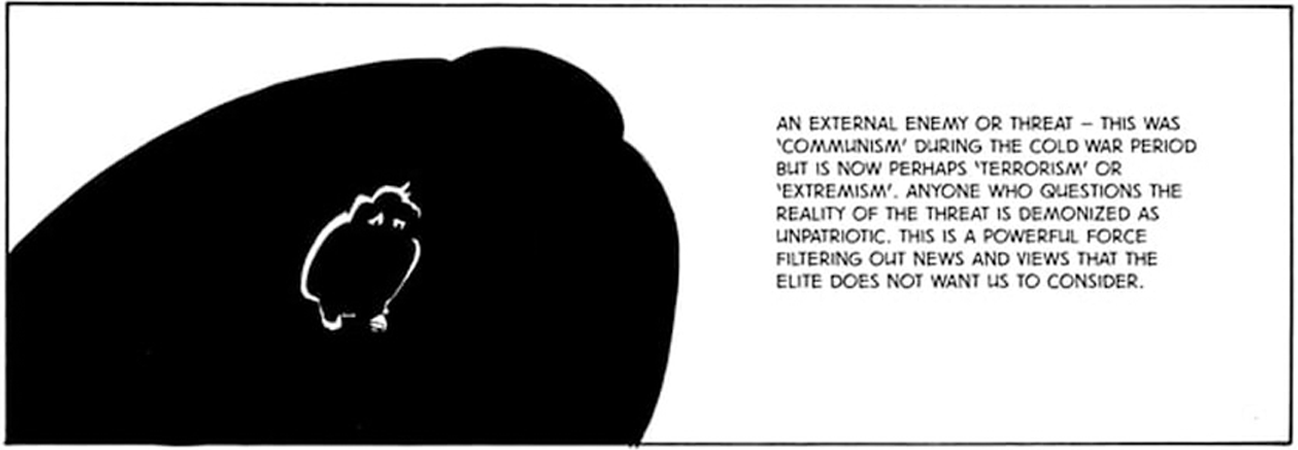
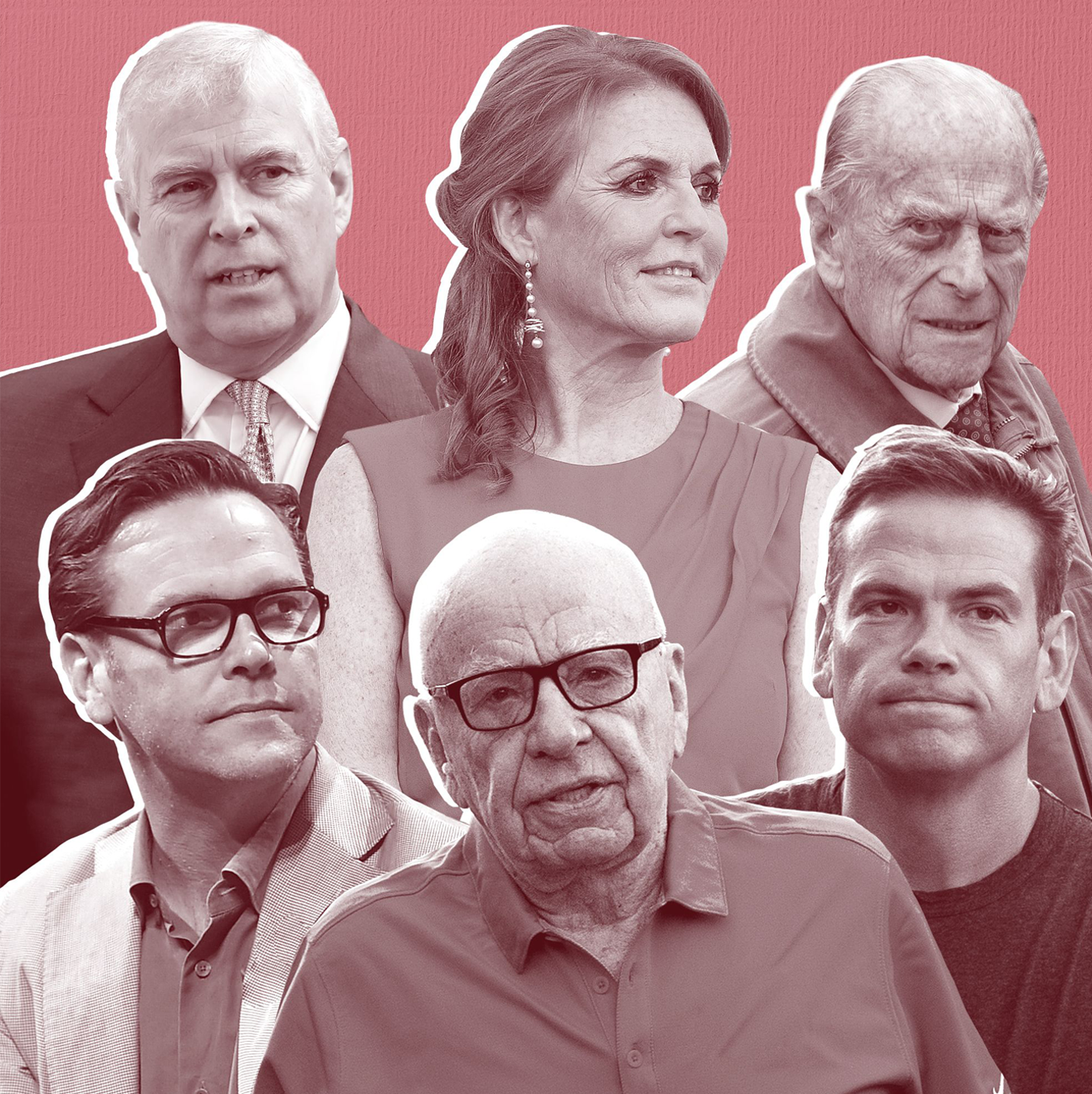

Toothless today?
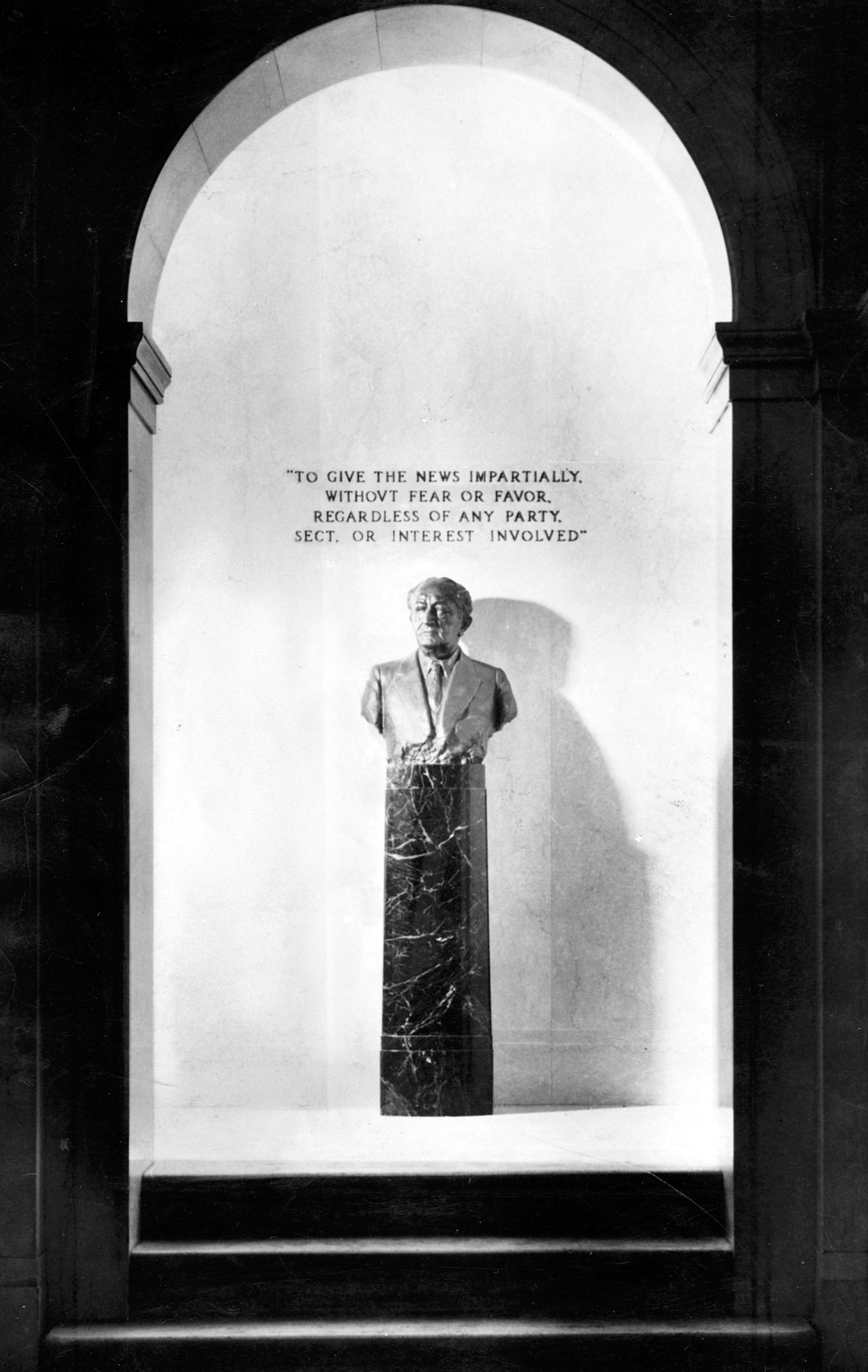
In an article for The Economist’s 1843 magazine, James Bennet writes that America’s media should do more to equip readers to think for themselves. The article can be summed up by its title, “When the New York Times lost its way” and the following passages:
The New York Times’s problem has metastasised from liberal bias to illiberal bias, from an inclination to favour one side of the national debate to an impulse to shut debate down altogether. All the empathy and humility in the world will not mean much against the pressures of intolerance and tribalism without an invaluable quality that A. G. Sulzberger [chairman of the NYT] did not emphasise: courage.
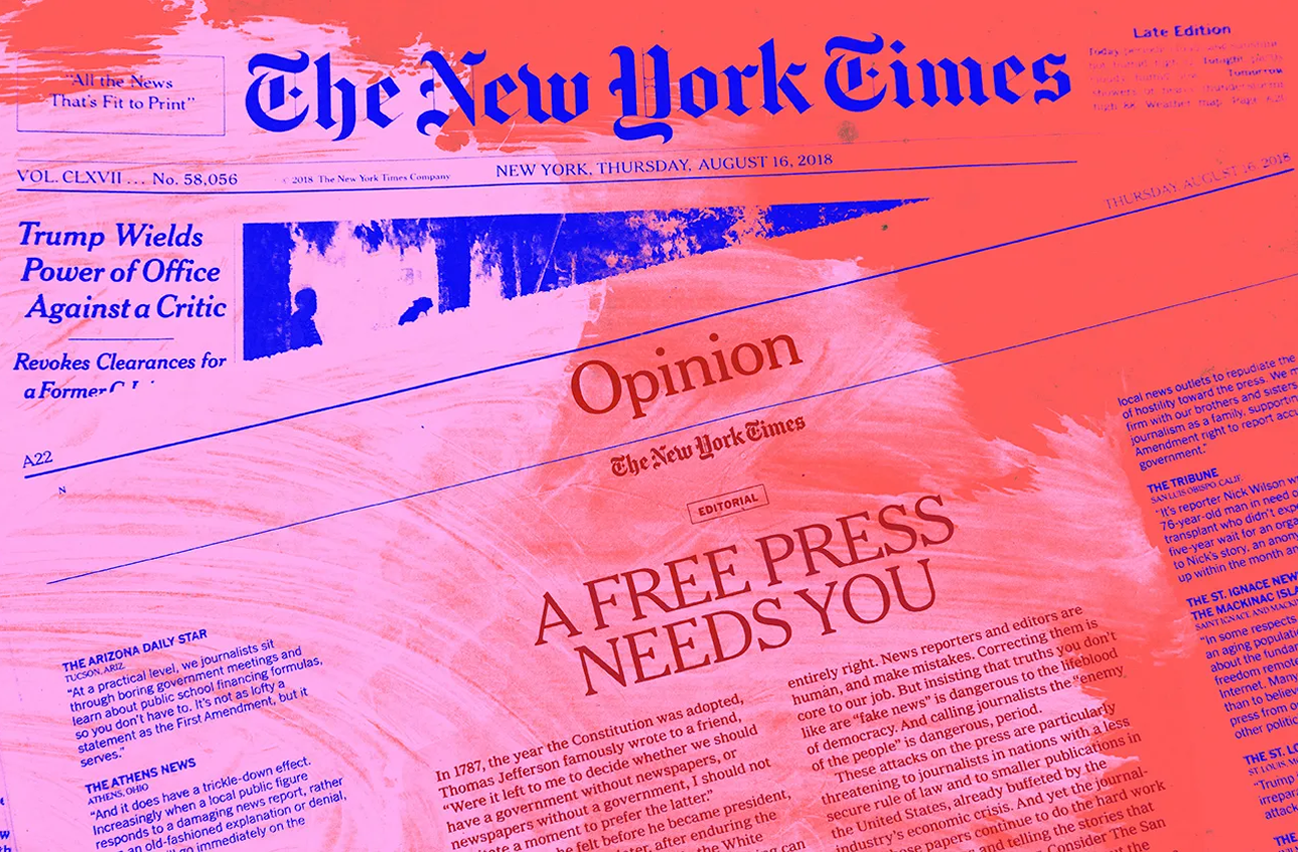
Bennet continues:
Most journalism obviously doesn’t require anything like the bravery expected of a soldier, police officer or protester. But far more than when I set out to become a journalist, doing the work right today demands a particular kind of courage: not just the devil-may-care courage to choose a profession on the brink of the abyss; not just the bulldog courage to endlessly pick yourself up and embrace the ever-evolving technology; but also, in an era when polarisation and social media viciously enforce rigid orthodoxies, the moral and intellectual courage to take the other side seriously and to report truths and ideas that your own side demonises for fear they will harm its cause. One of the glories of embracing illiberalism is that, like Trump, you are always right about everything, and so you are justified in shouting disagreement down. In the face of this, leaders of many workplaces and boardrooms across America find that it is so much easier to compromise than to confront – to give a little ground today in the belief you can ultimately bring people around. This is how reasonable Republican leaders lost control of their party to Trump and how liberal-minded college presidents lost control of their campuses.
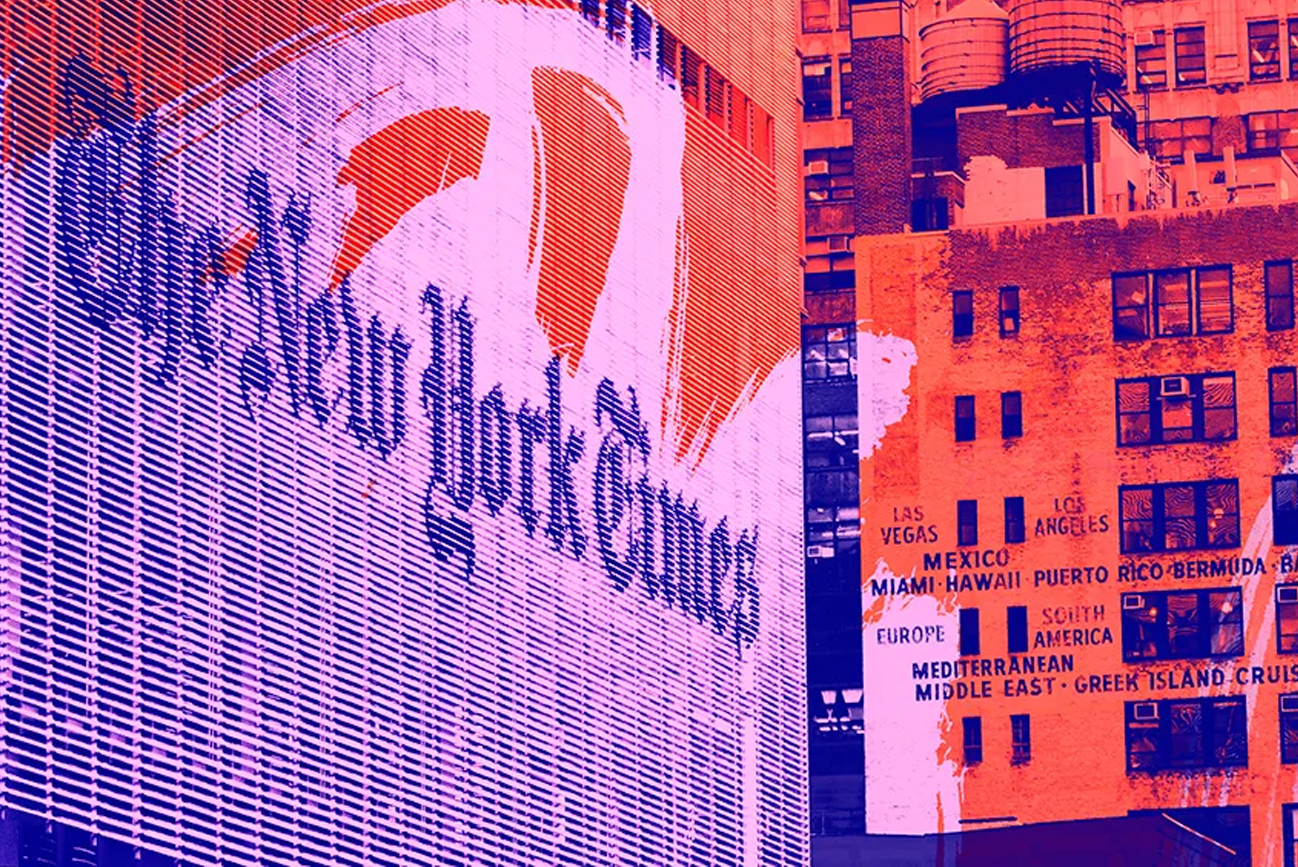
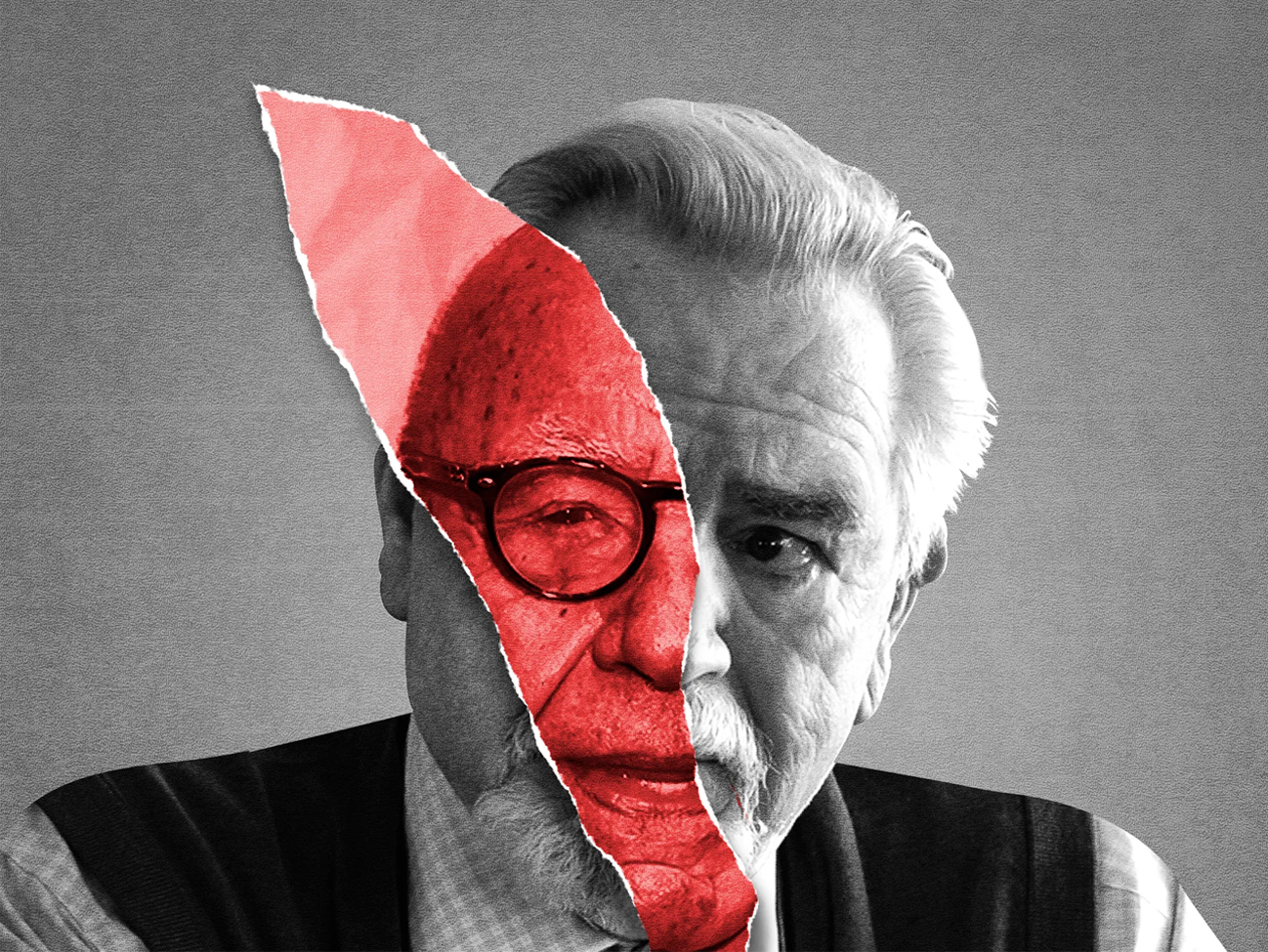
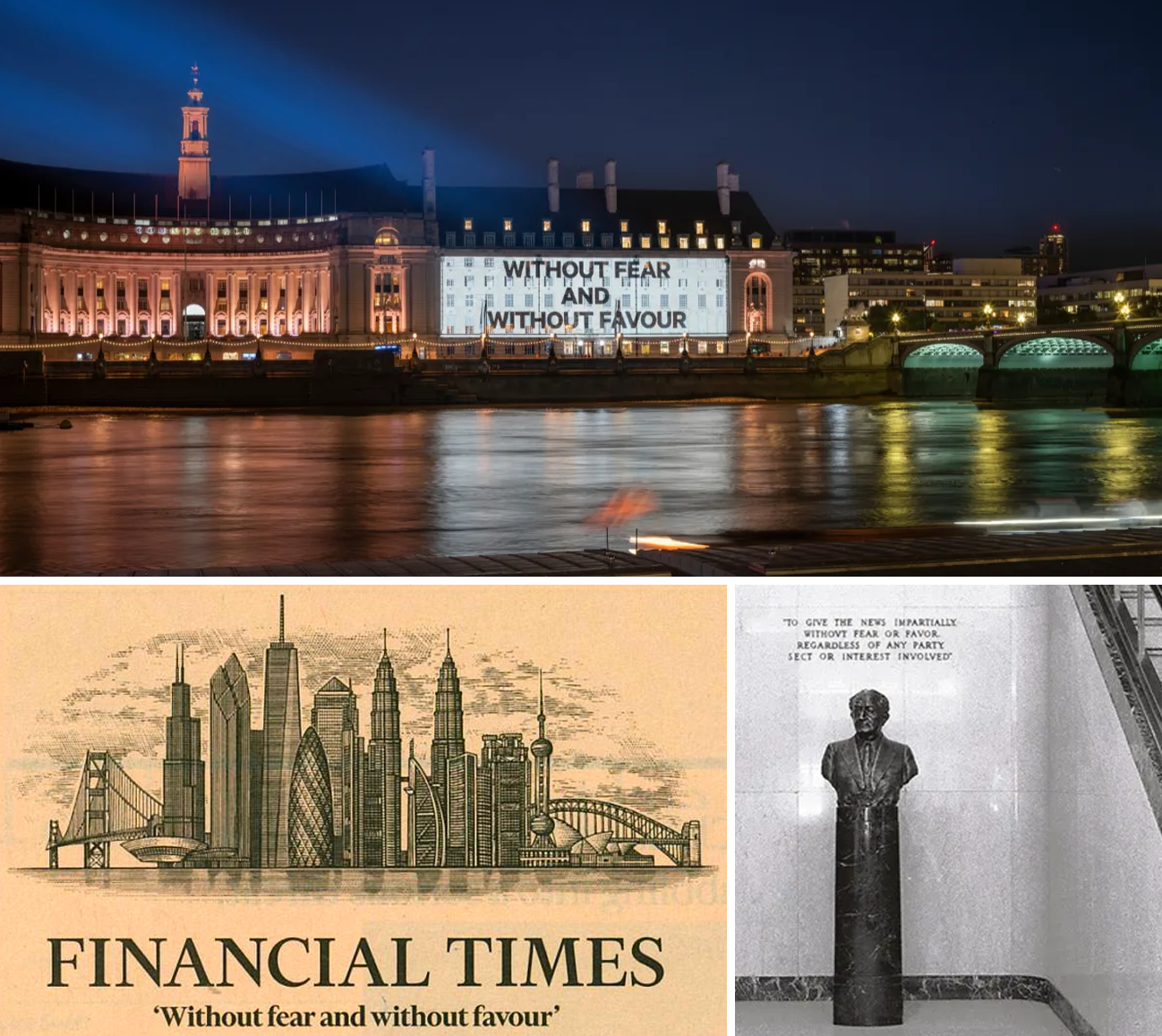
Liberating readings
Sections
Selected media organisations
Manufacturing consent
Liberating readings
Disinformation
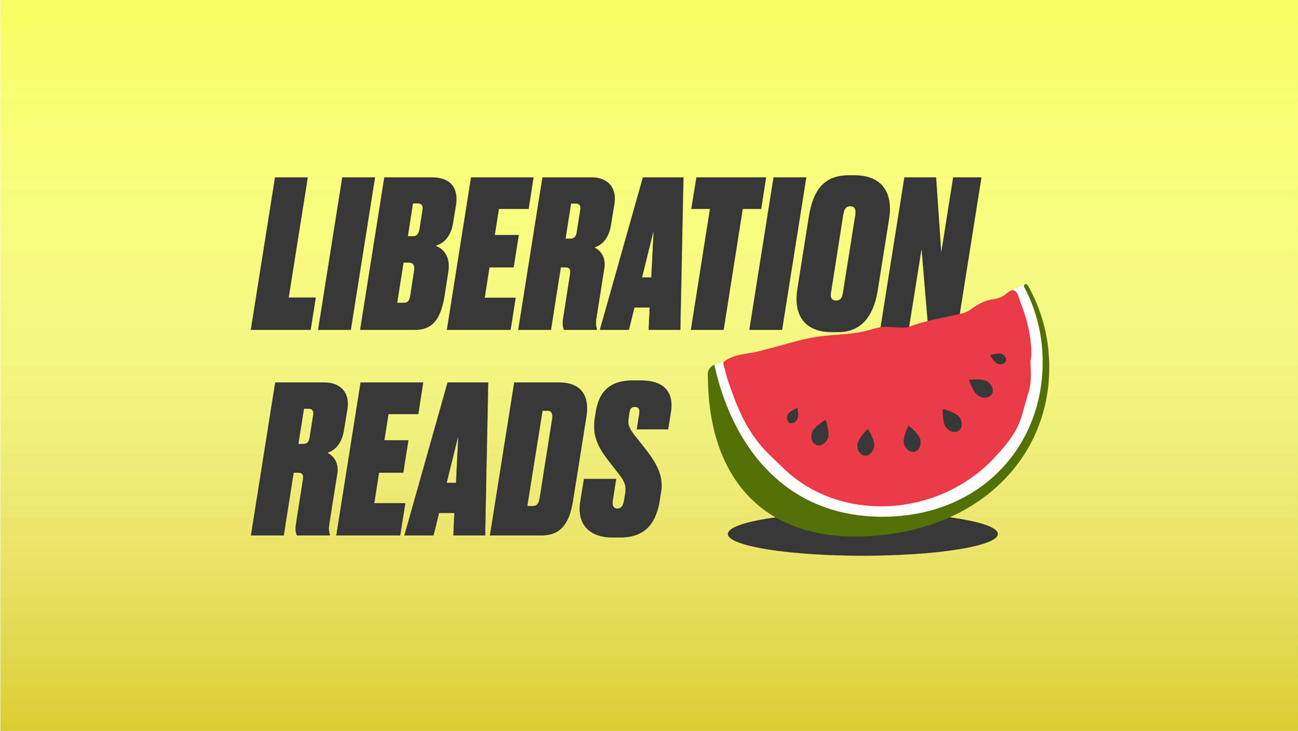
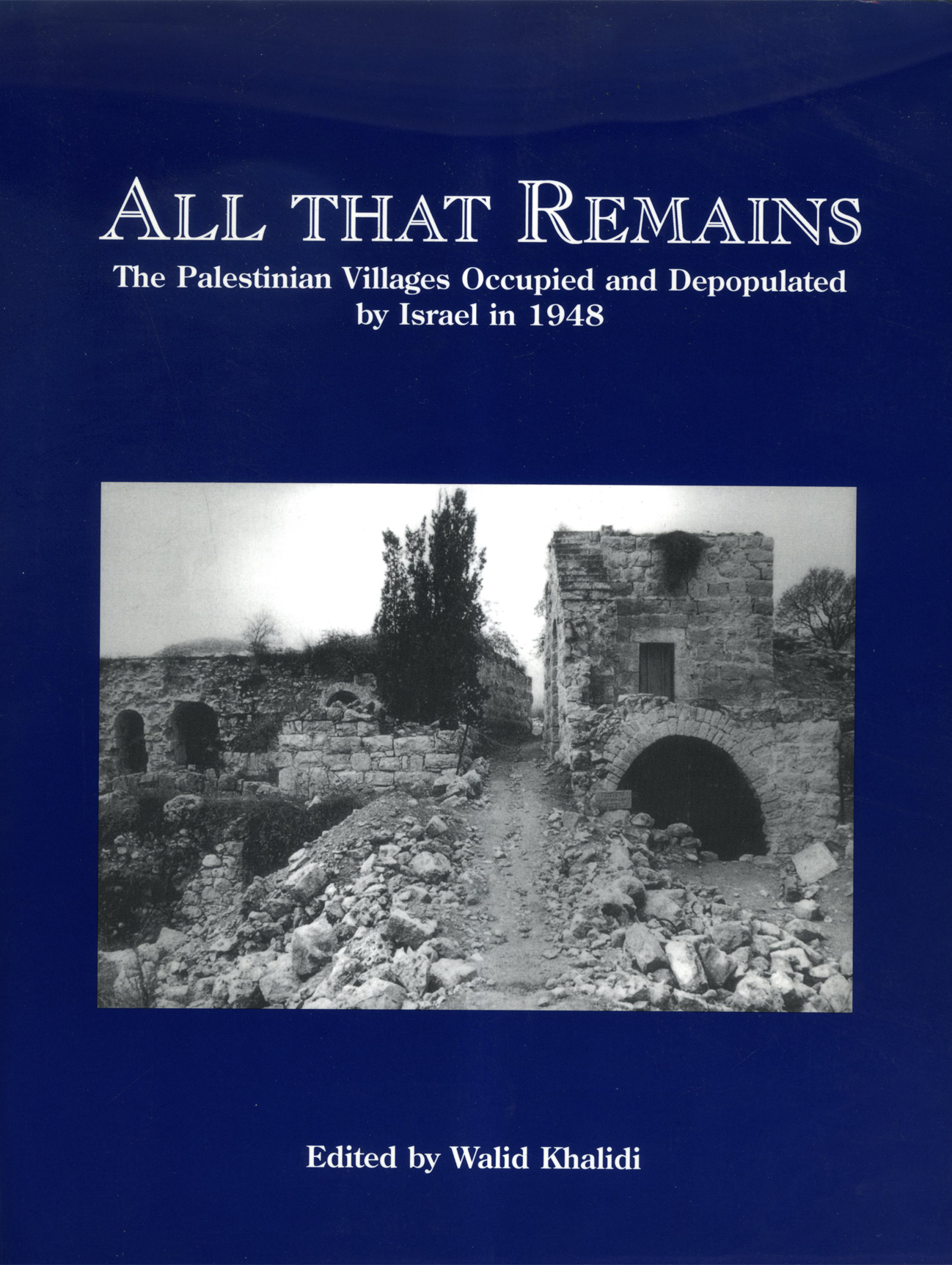

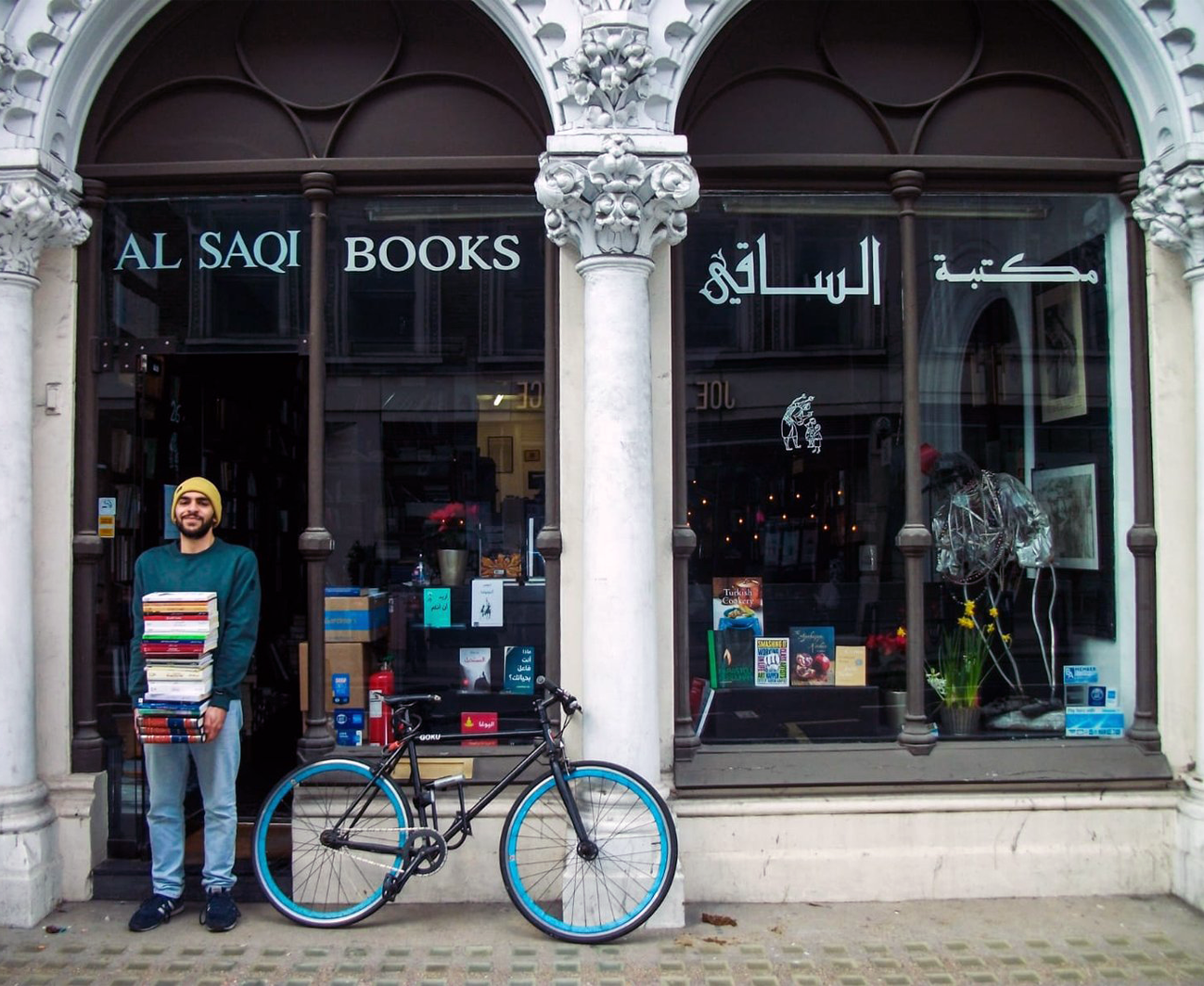
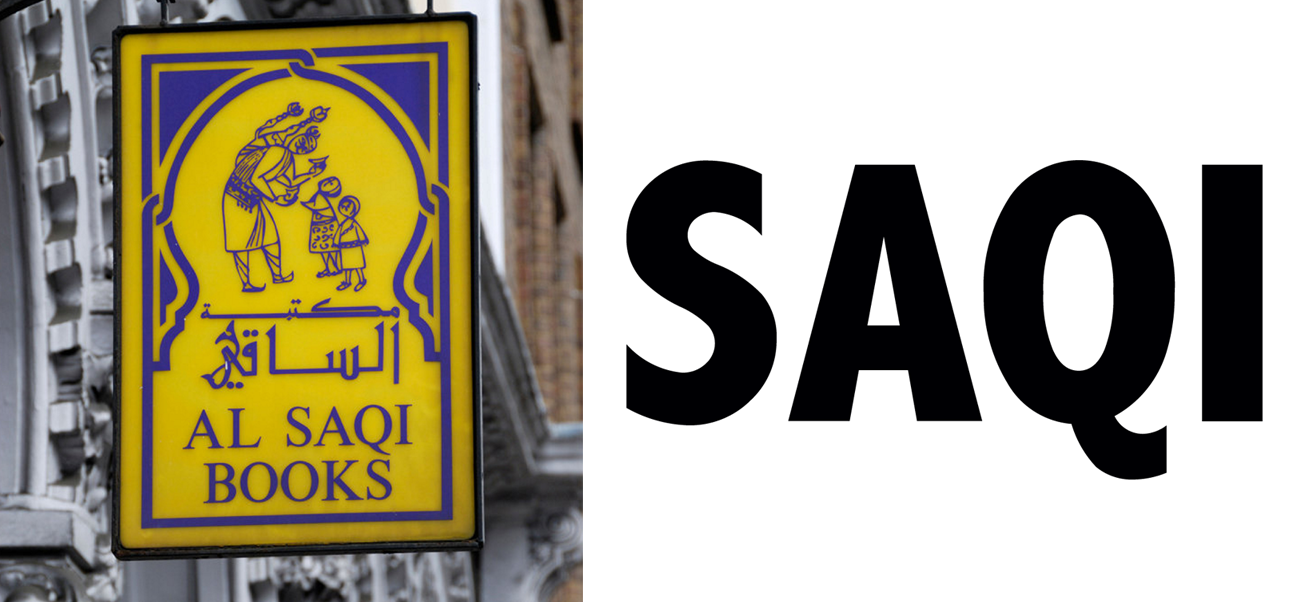
Chomsky
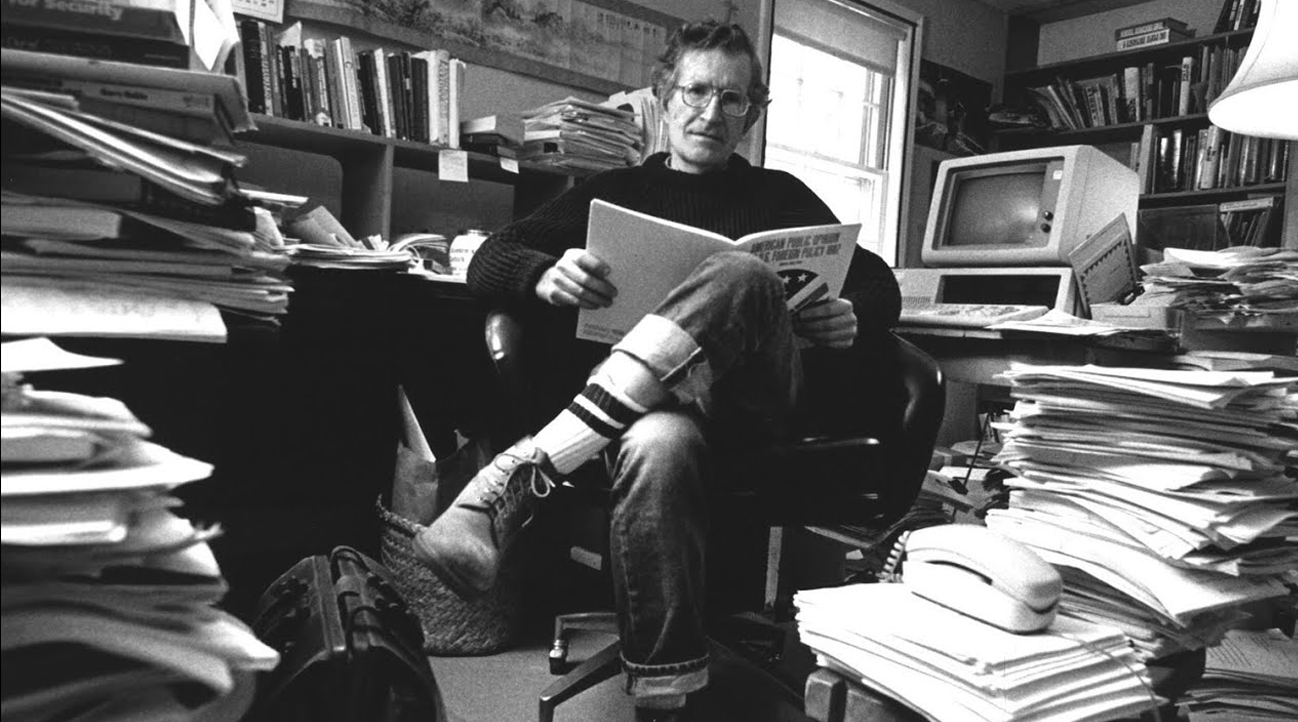
Where to begin? So much of Chomsky’s thinking is so pertinent today. He argued that the best way to keep people passive and obedient is to “strictly limit the spectrum of acceptable opinion.” For those amongst us who seek an egalitarian press and media landscape, Chomsky contends that “there can be no more urgent task than to come to understand the mechanisms and practices of indoctrination.” On Palestine and more timelessly, Chomsky said the following:
“European settlers coming to a foreign land, settling there, and either committing genocide against or expelling the indigenous people. The Zionists have not invented anything new in this respect.”
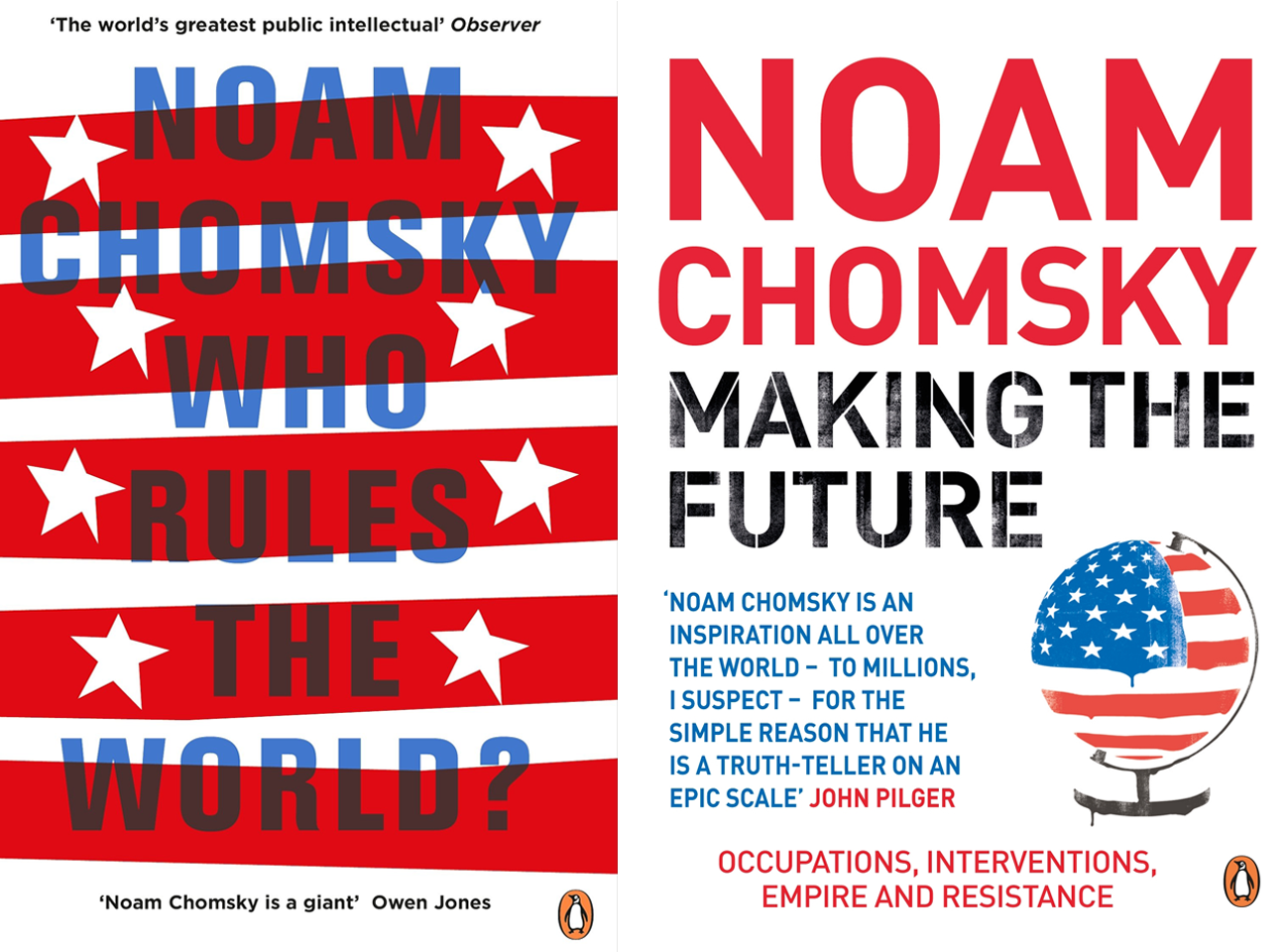
Thompson & Alshaer
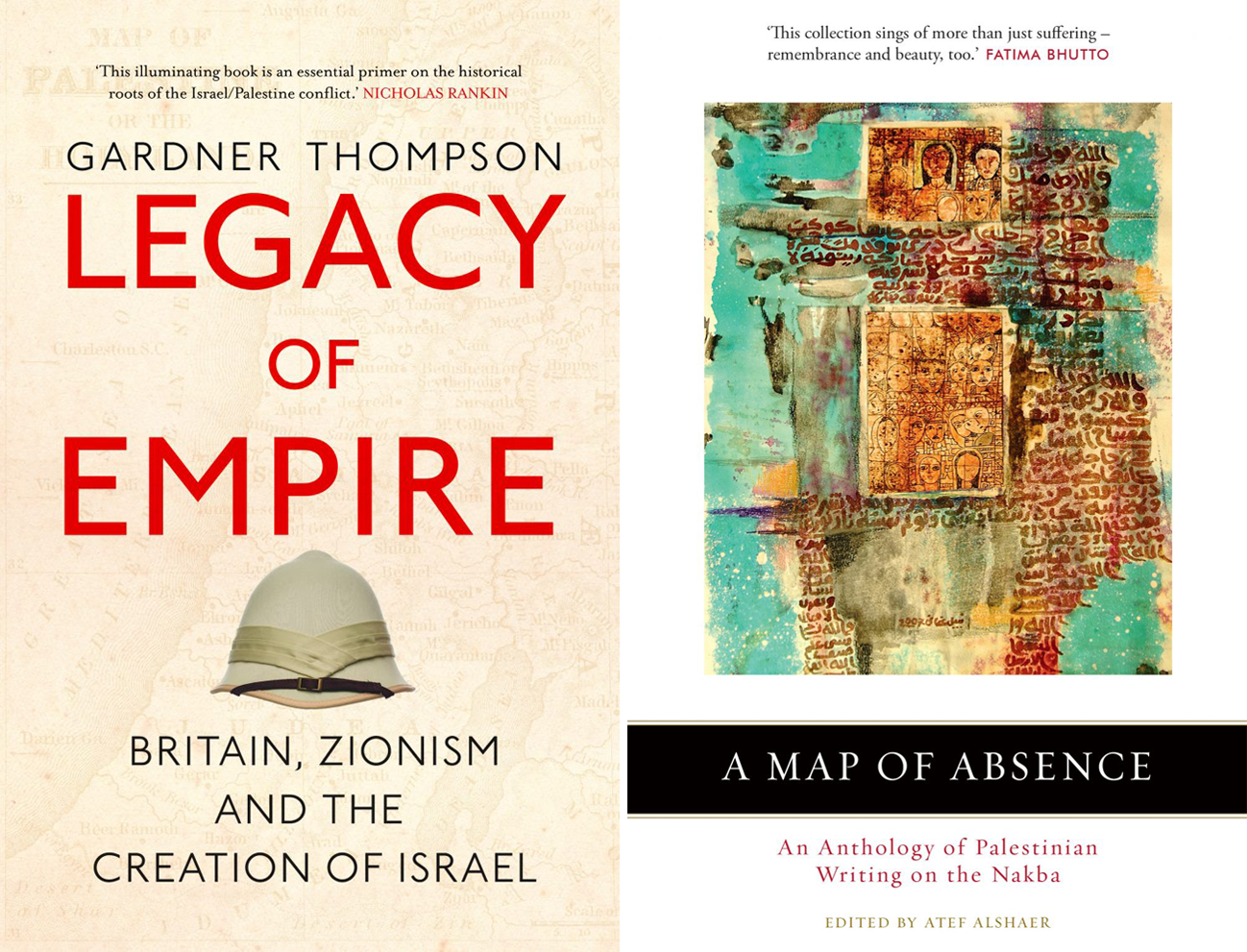
Sabbagh-Khoury & Erakat
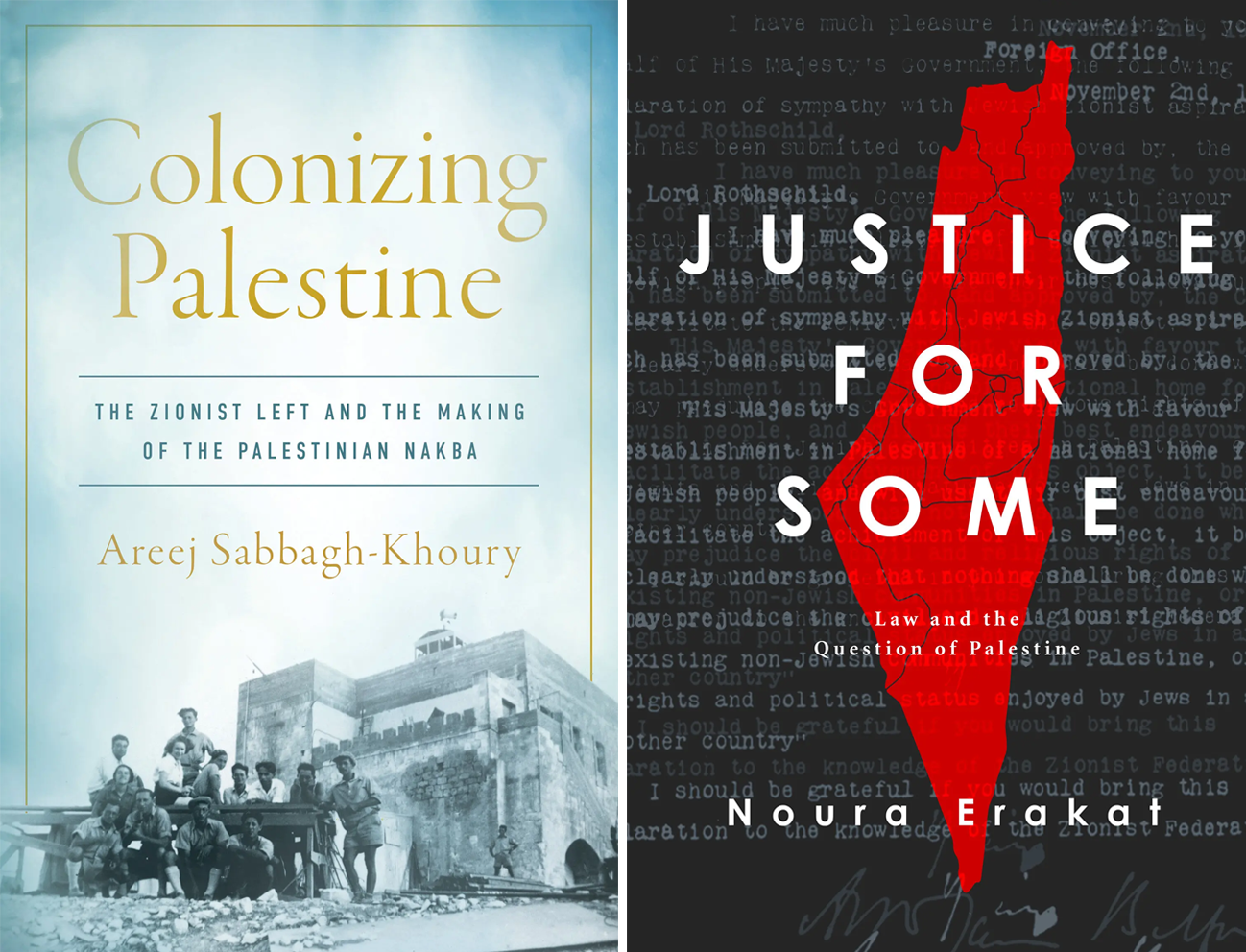
Finkelstein & Khalidi
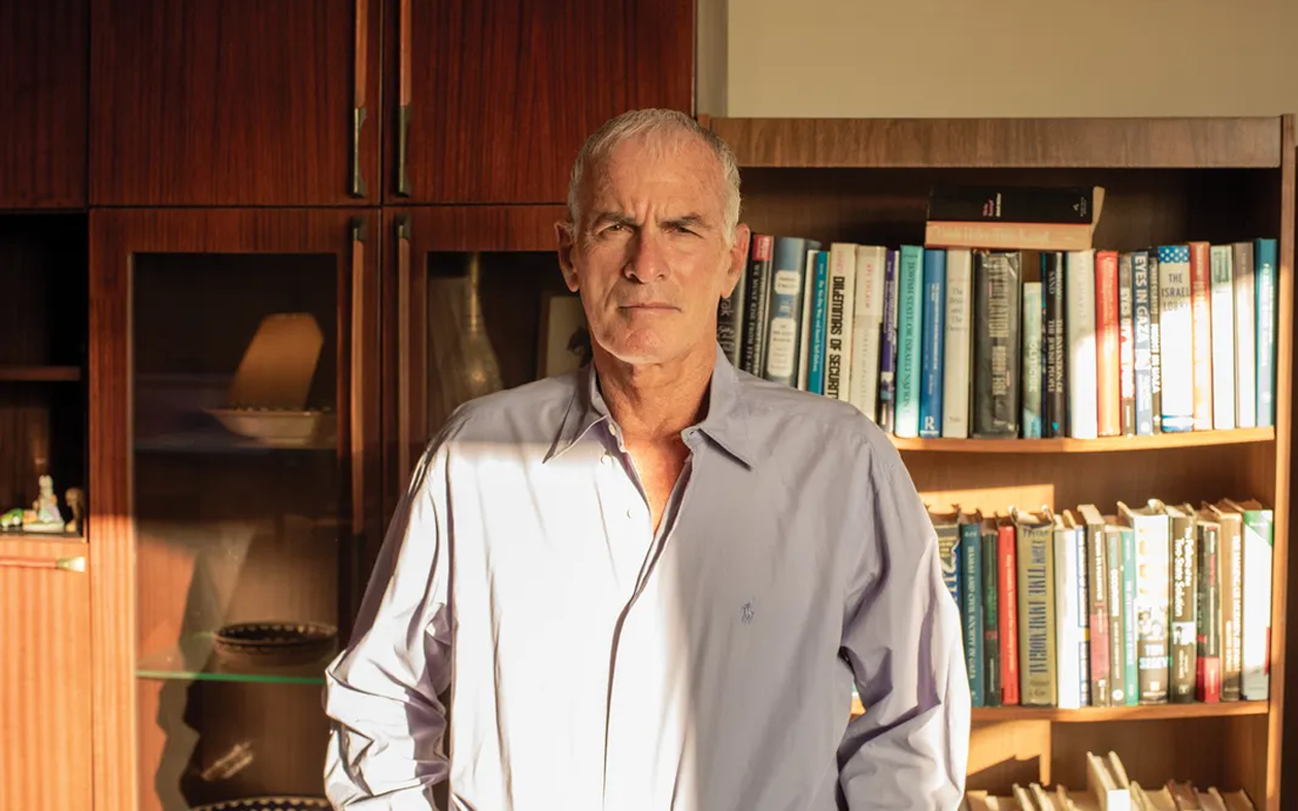
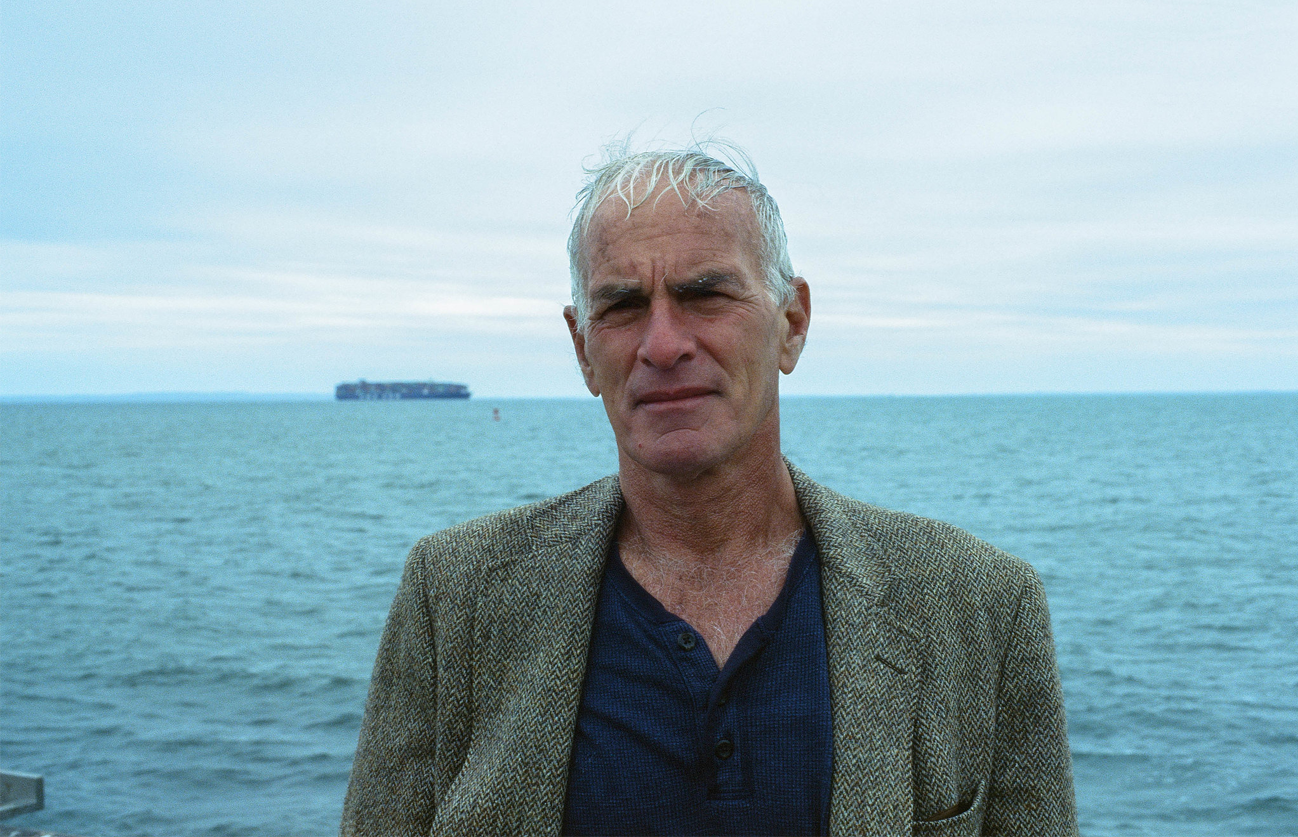
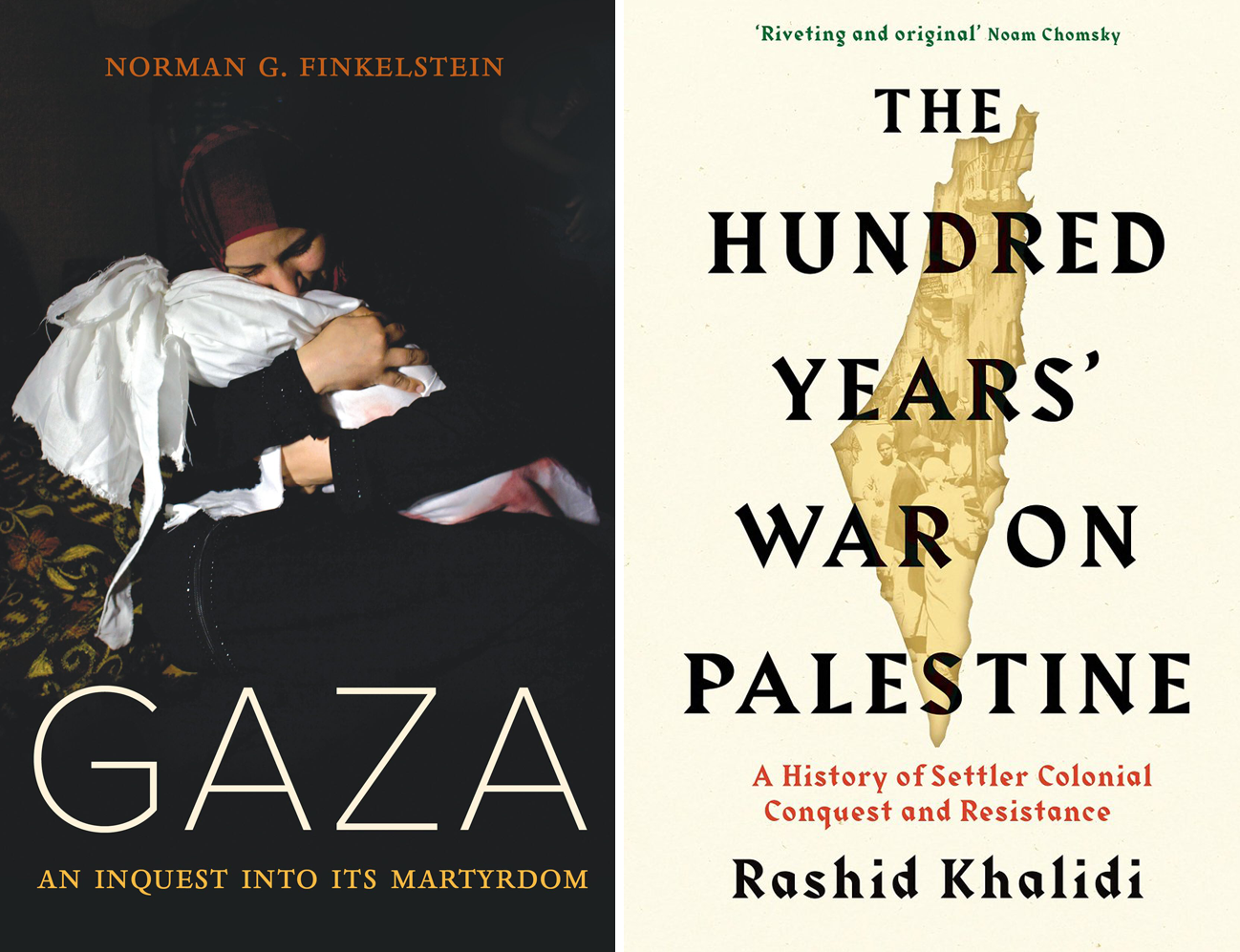
In Gaza: an inquest into its martyrdom, published in 2018, Norman G. Finkelstein wrote that since 2004, “Israel has launched eight devastating “operations” against Gaza’s largely defenseless population. Thousands have perished, and tens of thousands have been left homeless.” Additionally, since 2004, “Israel has subjected Gaza to a merciless illegal blockade.” Based on scores of human rights reports, this book by Finkelstein offers a meticulously researched inquest into Gaza’s martyrdom. He shows that although Israel has justified its assaults in the name of self-defense, in fact these actions constituted flagrant violations of international law. “What has befallen Gaza is a man-made humanitarian disaster.” In a review of the book by Paul Heron (2018), he concludes that Finkelstein’s systematic and analytical exposé is “a necessary read” and continues:
The outrage from Finkelstein is obvious, but each wail about injustice and hypocrisy is based on facts, and supported by evidence. The book presents and illustrates a pattern in that the state of Israel provokes Hamas, compelling a reaction in which Hamas appears to be the aggressor and the initiator of hostilities. At that point Israel claims its right to defend itself by any means necessary. … In this book Finkelstein expresses outrage that Israel is regularly pardoned not only by the usual suspects, but by the human rights industry itself and the United Nations. In doing so it allows war crimes and crimes against humanity to be a feature of Israel’s practices.
The work by Khalidi (2020), The Hundred Years’ War on Palestine, states that the twentieth century for Palestine and the Palestinians has been a century of denial: denial of statehood, denial of nationhood and denial of history. Drawing on his family archives, Khalidi reclaims the fundamental right of any people: to narrate their history on their own terms. Beginning in the final days of the Ottoman Empire, the book reveals nascent Palestinian nationalism and the broad recognition by the early Zionists of the colonial nature of their project. These ideas and their echoes defend Nakba — the Palestinian term for the establishment of the state of Israel — the cession of the West Bank and Gaza to Jordan and Egypt, the Six Day War and the occupation. Moving through these critical moments, Khalidi interweaves the voices of journalists, poets and resistance leaders with his own accounts as a child of a UN official and a resident of Beirut during the 1982 siege. The result is a profoundly moving account of a hundred-year-long war of occupation, dispossession and colonisation.
Roy & Elgindy

According to Foreign Policy magazine’s Stephen M. Walt, to understand the deeper origins of the brutal violence claiming the lives of Israelis and Palestinians there is no better place to start than Sara Roy’s Failing Peace. “In careful but compassionate prose, Roy, a political economist, chronicles the systematic immiseration of Gaza, the devastating consequences on the people trapped there, and the failed peace process that has enabled Hamas to endure and attract support.” Walt points out that Roy is the daughter of Holocaust survivors, and writes with “a keen sensitivity to the plight of people suffering under oppression and with a powerful moral commitment to finding justice for Palestinians and Israelis alike.” The tale Roy tells is a bleak one, and it is even more troubling to reflect on “how much the situation in Gaza has deteriorated in the years since her book was published.”
According to Jennifer Williams of Foreign Policy magazine, so much analysis of the failures of the Israeli-Palestinian peace process understandably focuses on how Washington’s close relationship with Israel has influenced negotiations and U.S. policy over the years. Yet there’s another critical element to the story that gets less attention: the U.S. relationship with and approach toward the Palestinians and their leaders. Khaled Elgindy’s book, Blind Spot, seeks to fill that gap. Elgindy served as an advisor to the Palestinian leadership in Ramallah on permanent status negotiations with Israel from 2004 to 2009 and thus had a front-row seat to Washington’s peacemaking efforts. His book provides a deeply researched historical examination of how U.S.-Palestinian relations shaped the peace process over the decades and contributed to the crisis of Palestinian leadership we see today.
Thrall & Bergman

According to Robbie Gramer (of Foreign Policy magazine), “the gruesome Hamas attacks on Israel that sparked the current war punched a giant hole in the reputation of Israel’s vaunted military and intelligence services” and begs the question: “How could one of the world’s most capable national security apparatuses be caught by surprise?” Gramer argues that:
In Rise and Kill First, veteran Israeli journalist Ronen Bergman sheds a spotlight on the dark corners of Israeli intelligence, including its targeted assassination programs aimed at keeping Hamas and other enemies of Israel on the backfoot. Bergman looks at Israeli intelligence’s historic triumphs and botched operations and examines how Israeli policymakers came to rely on assassinations as a “quick fix” for complex strategic problems—with predictably mixed results, including helping to embolden and foster more extreme militant groups. He doesn’t lose sight of the grim moral quandaries or human toll of the Israeli-Palestinian conflict, either, and the result is a book that offers foreboding insights into how the current war may play out.
According to Dalia Hatuq of Foreign Policy magazine Nathan Thrall’s A Day in the Life of Abed Salama paints an intricate picture of life under Israeli occupation through the prism of a horrid 2012 traffic accident on the outskirts of Jerusalem that left a permanent scar on the Palestinian psyche. Thrall, a journalist and former director of the Arab-Israeli Project at the International Crisis Group, reconstructs the day that a bus carrying Palestinian kindergarteners collided with a truck and burst into flames, leaving six children and one teacher dead. Due to the geography of occupation, emergency services were late to arrive—Israeli responders from the illegal settlements in the West Bank nearby took a while to locate the site of the accident, while Palestinian responders were stuck at bottlenecks due to Israeli checkpoints. The narrative centers on Abed Salama as he spends the day looking for his 5-year-old son, Milad, one of the children taken to different hospitals, and eventually learns that Milad has died. But Thrall, who has also written a 2017 book on the Israeli-Palestinian conflict, also highlights how the structural inequality and oppression Palestinians have long faced at the hands of the Israeli military contributed to the scale of the calamity. He weaves analysis, history, and personal stories of individuals on both sides of the Green Line to explain the greater tragedy of the holy land (a.k.a. “Palestine”).
Pappé, Saïd & Karmi
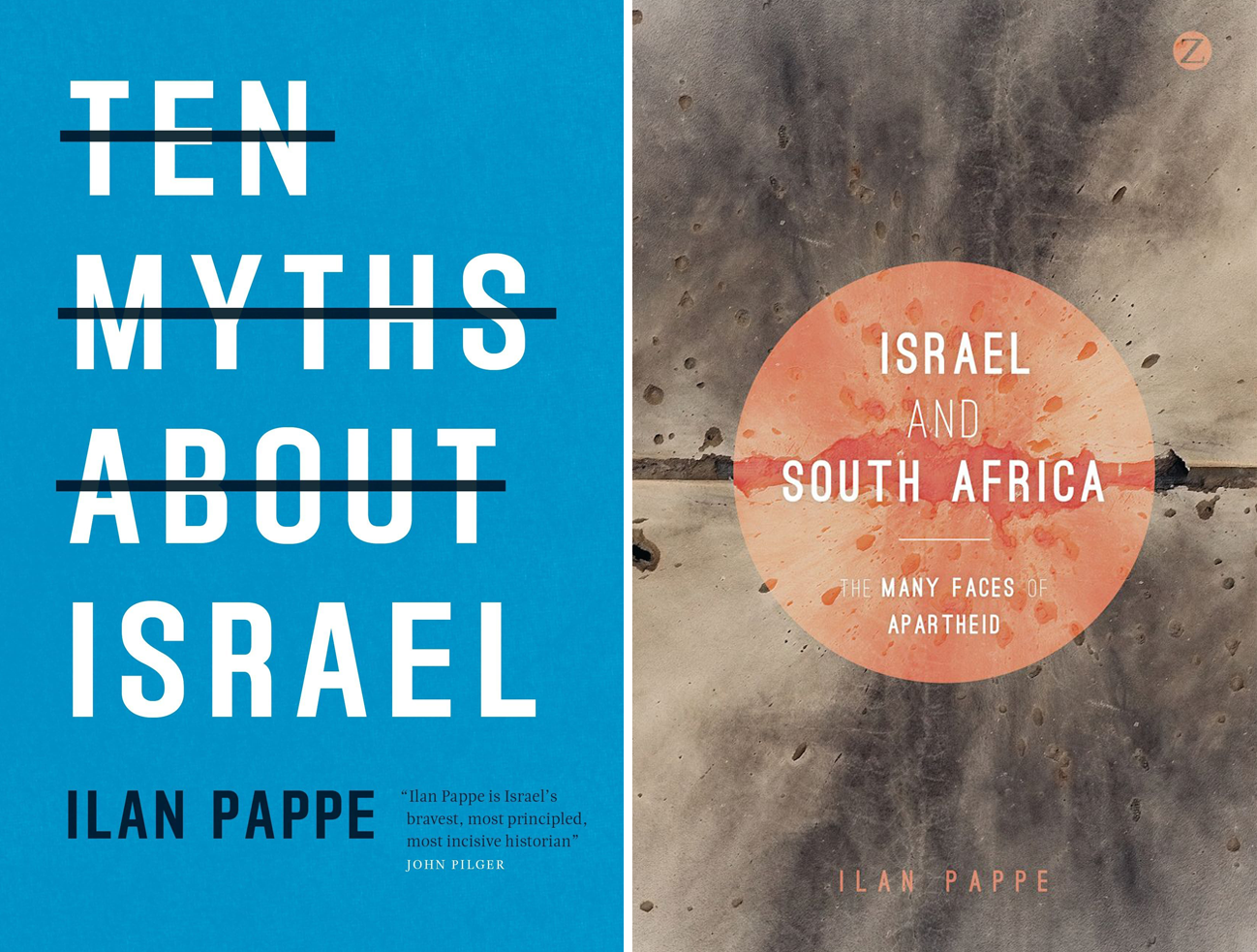
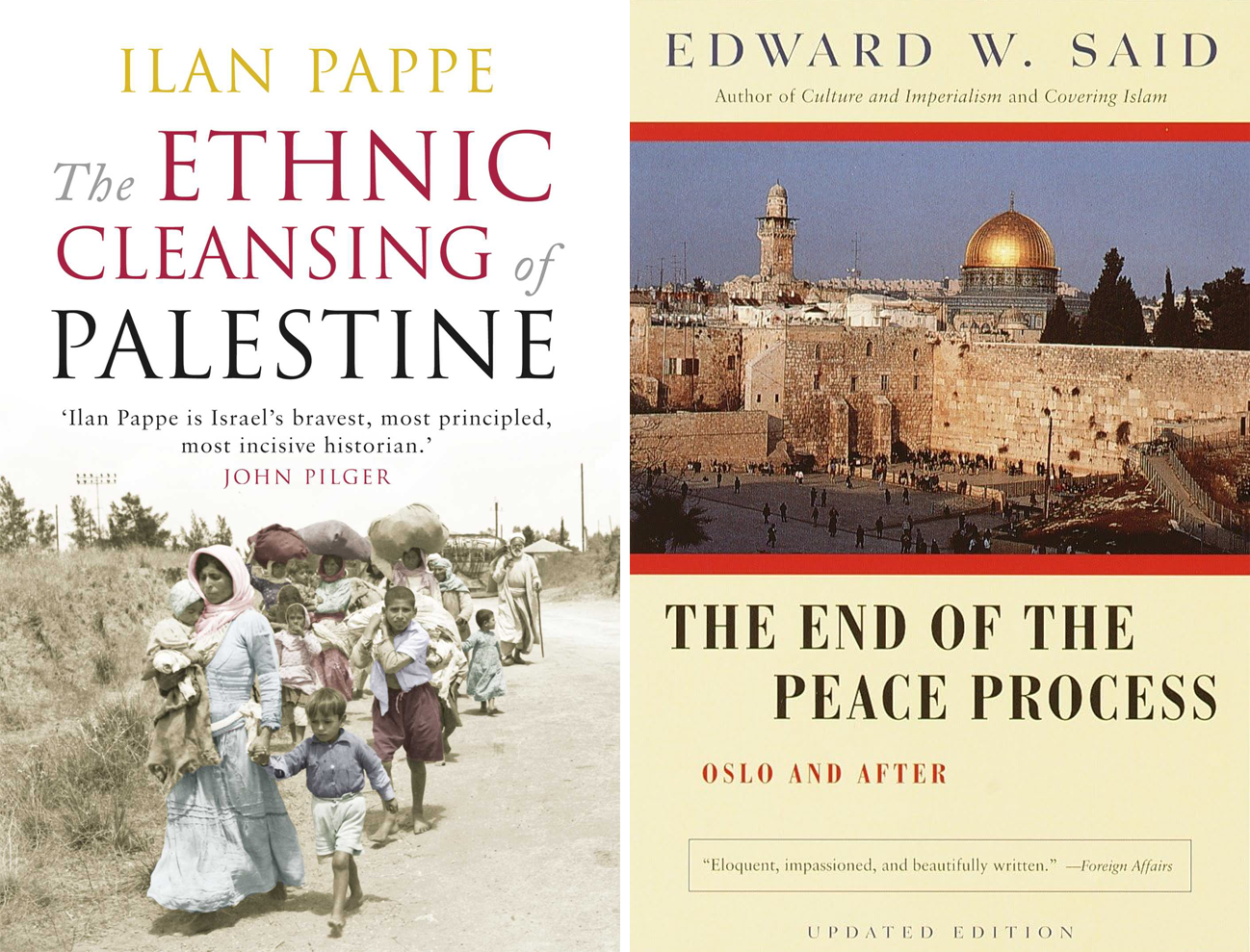
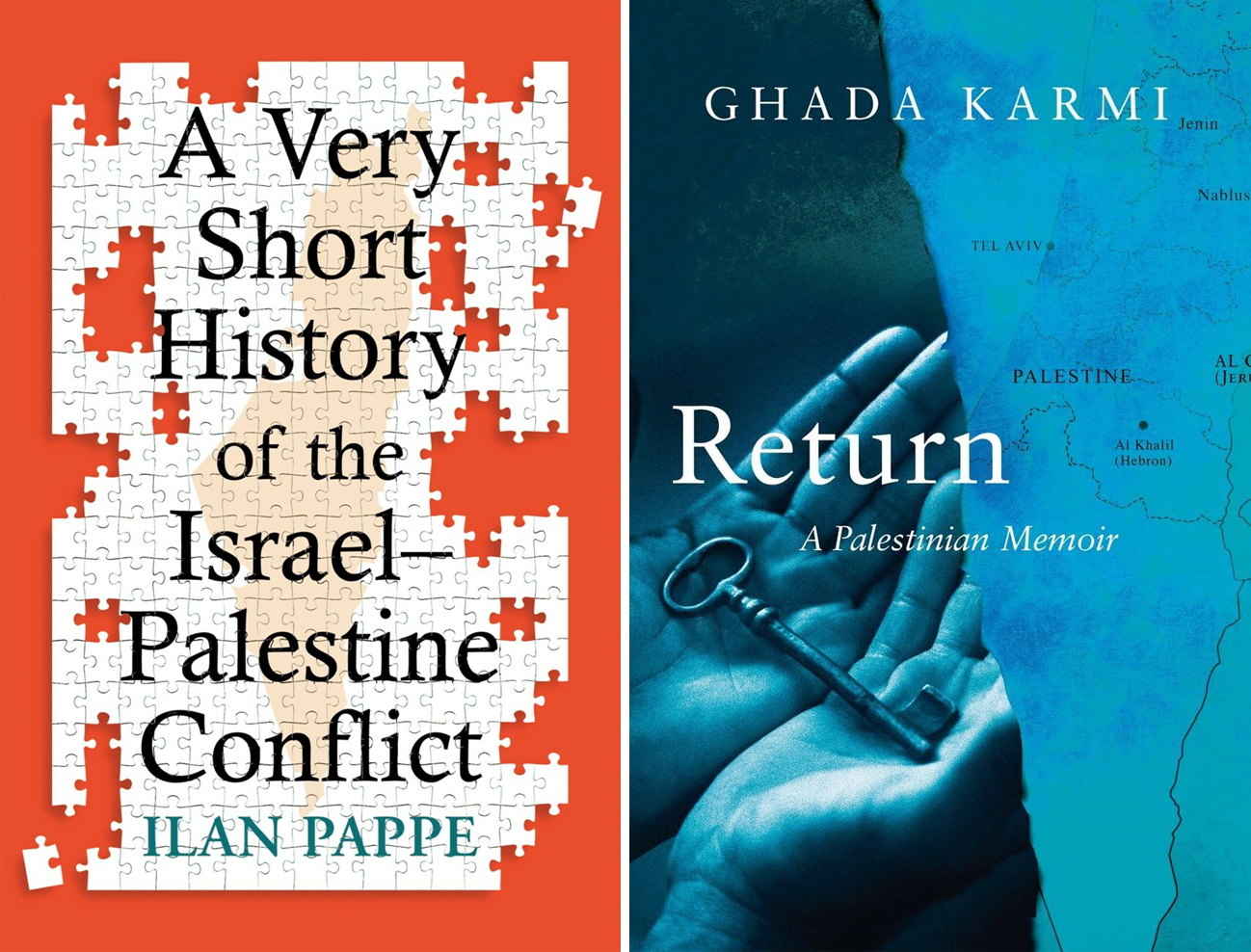
Loewenstein, Moor & Raz
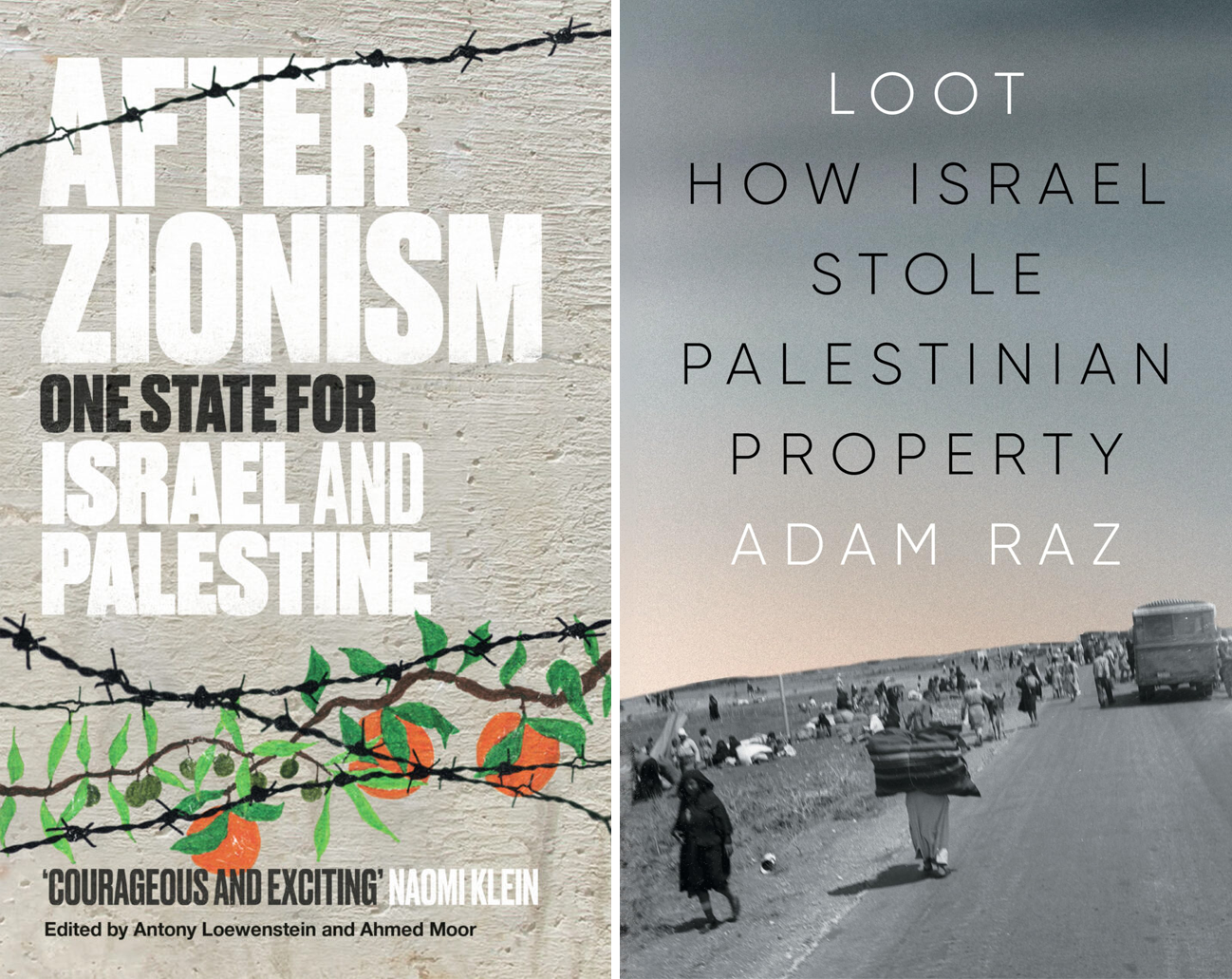
Muna, Teller & Levy
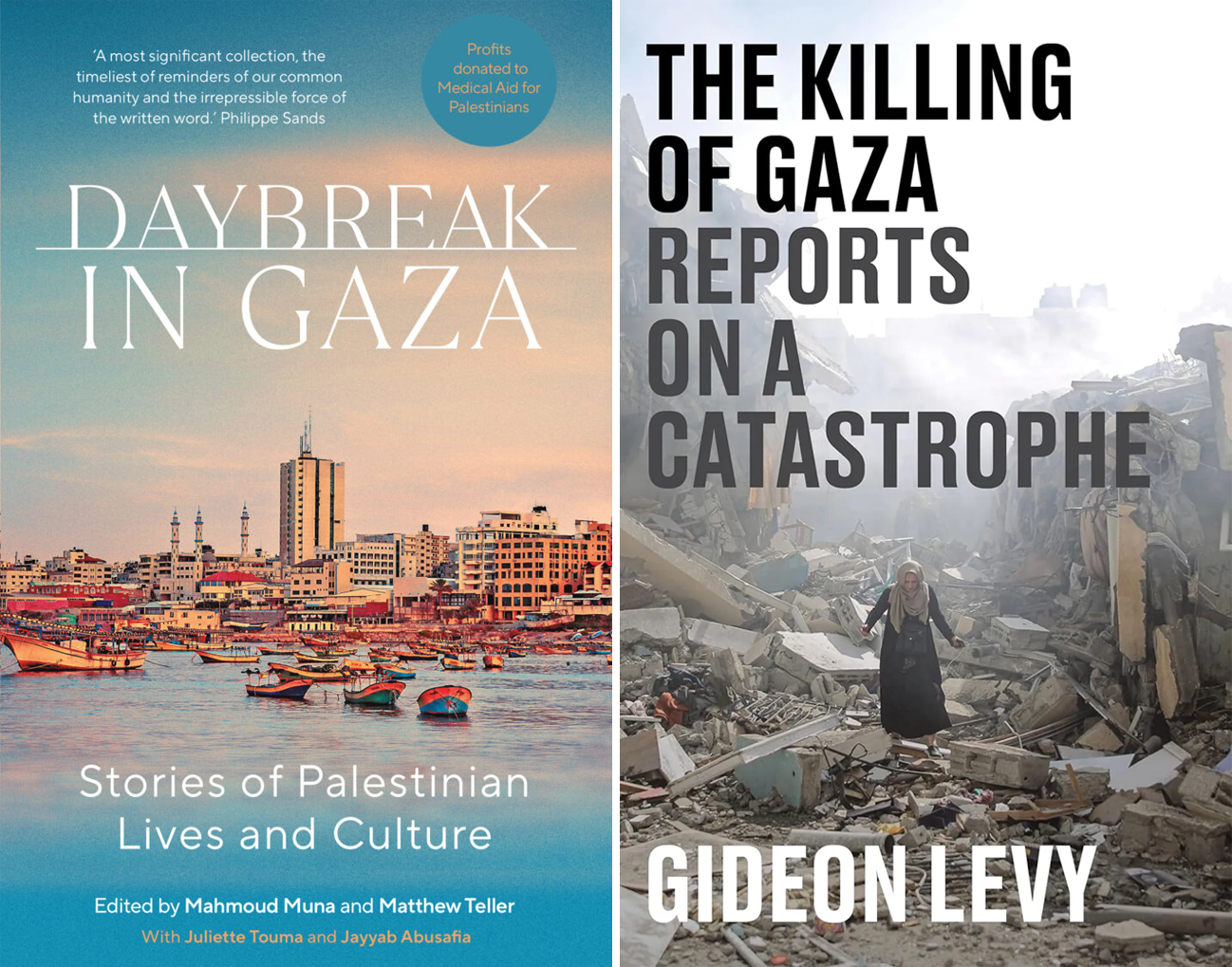
Disinformation
Sections
Selected media organisations
Manufacturing consent
Liberating readings
Disinformation
This section covers various aspects of disinformation, some verge on the comical (alternative facts, wild claims of fake news and the notion that truth isn’t truth) whilst others are downright sinister and scary (the NYT and wilful deception and cases of journalists being monitored without their knowledge by way of state-of-the-art spying technology). Disinformation is distinct from misinformation.
If one recalls (or researches) the “Gulf War” of 2001 (that’s the one that centred on fake-news W.M.D.) they’ll know the character Mohammed Saeed al-Sahhaf. He came to worldwide prominence around the 2003 invasion of Iraq, during which he was the Minister of Information under Iraqi President Saddam Hussein, acting as spokesman for the Arab Socialist Ba’ath Party and Saddam’s government. He gained the nicknames “Baghdad Bob” and “Comical Ali” for his notable and colorful television appearances where he made things up on the hoof and against the blatant obvious — seeing is believing. Mohammed al-Sahhaf was not alone: “There are unknown unknowns” is a phrase from a response United States Secretary of Defense Donald Rumsfeld gave to a question at a U.S. Department of Defense news briefing on February 12th, 2002, about the lack of evidence linking the government of Iraq with the supply of Weapons of Mass Destruction to terrorist groups. Verbatim:
“Reports that say that something hasn’t happened are always interesting to me, because as we know, there are known knowns; there are things we know we know. We also know there are known unknowns; that is to say we know there are some things we do not know. But there are also unknown unknowns—the ones we don’t know we don’t know. And if one looks throughout the history of our country and other free countries, it is the latter category that tends to be the difficult ones.”
But, in truth, subterfuge goes back to the beginnings of time. We need look no further than The Art of War and the musings of Niccolò Machiavelli. A great insight on all of this is an essay by George Orwell (1946) called, “Politics and the English Language.” The point of the essay according to Orwell was to inform people of how language used in ‘political writing’ is vague and incompetent so as to be abstract for the reader. ‘Political language,’ wrote Orwell, is designed to make “lies sound truthful” and, “murder seem respectable.”
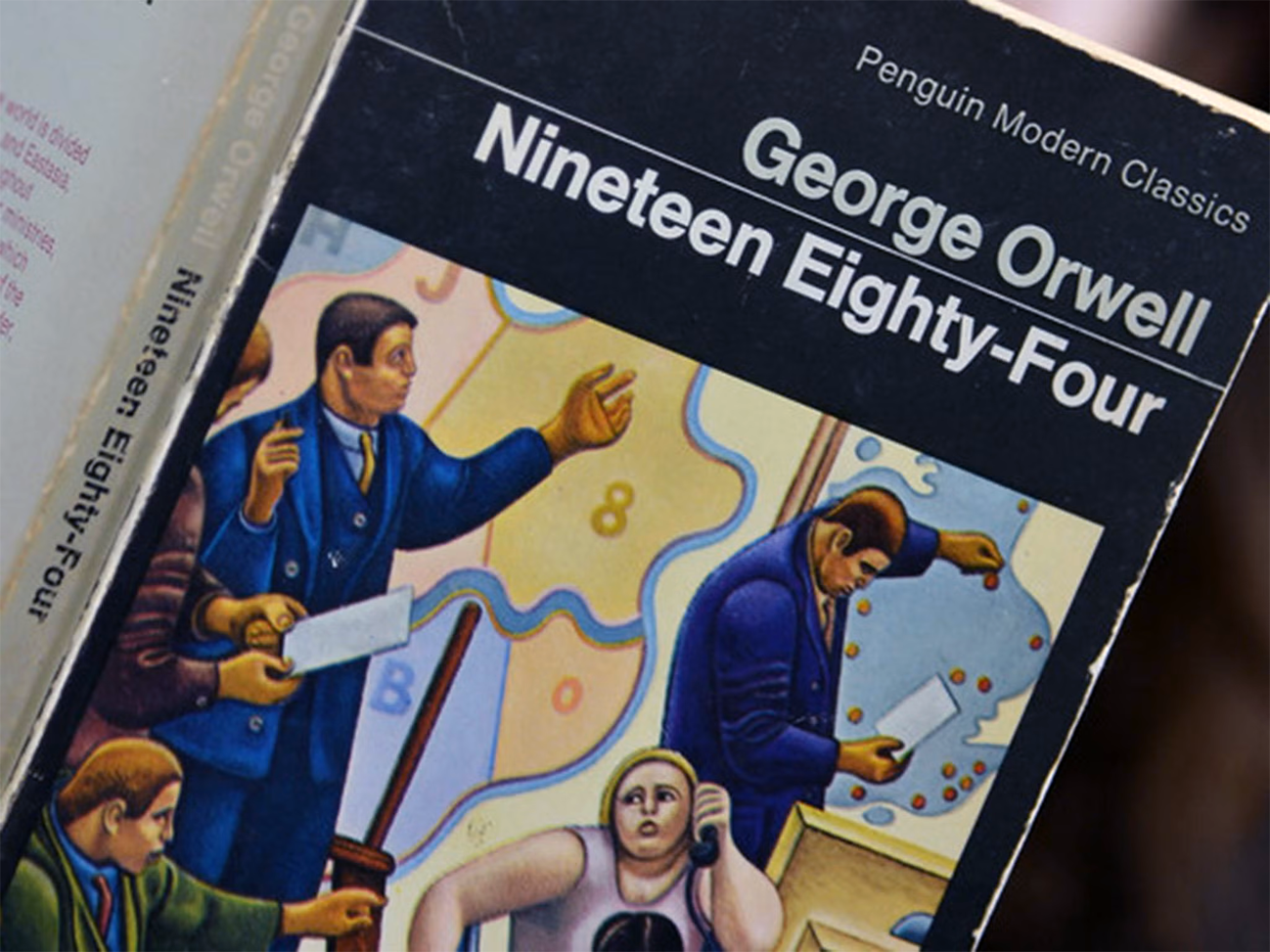
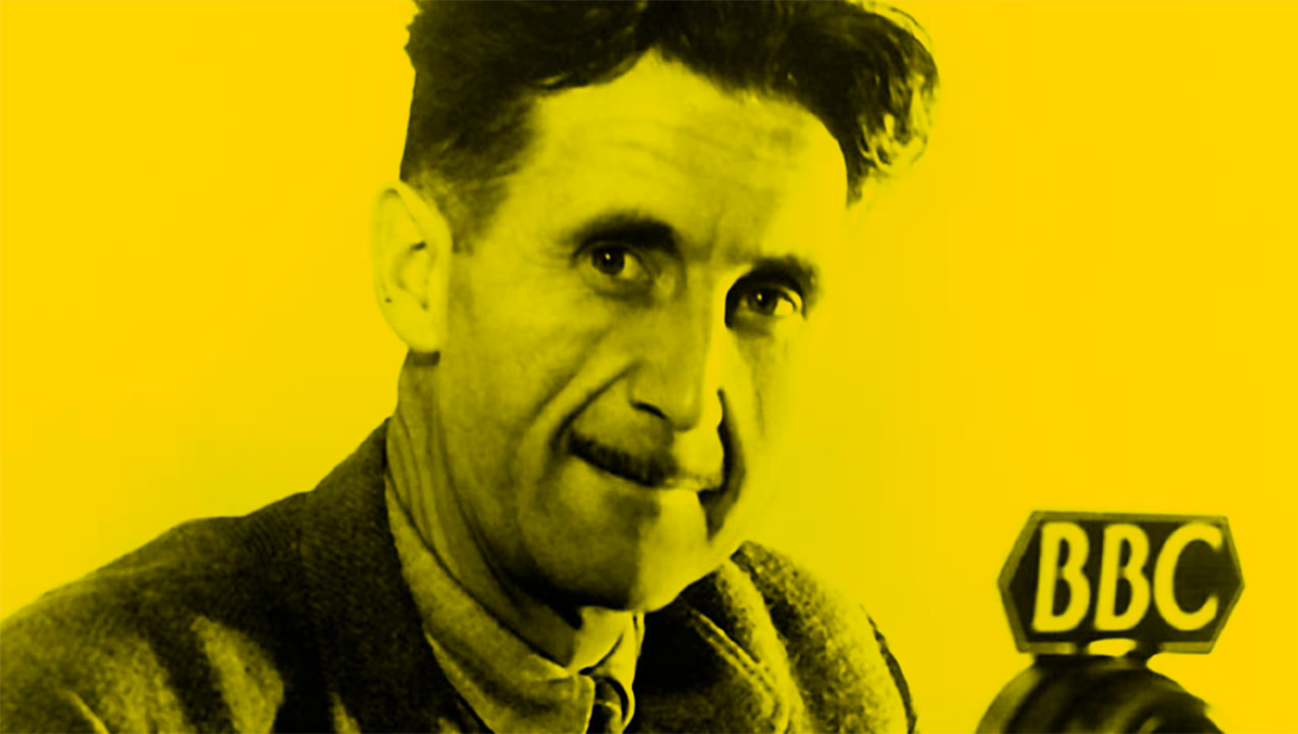
📕 “Politics and the English Language” →
Alternative Facts
“Alternative facts” was a phrase used by U.S. Counselor to the President, Kellyanne Conway, during a Meet the Press interview on January 22nd, 2017, in which she defended White House Press Secretary Sean Spicer’s false statement about the attendance numbers at Donald Trump’s first inauguration as President of the United States.
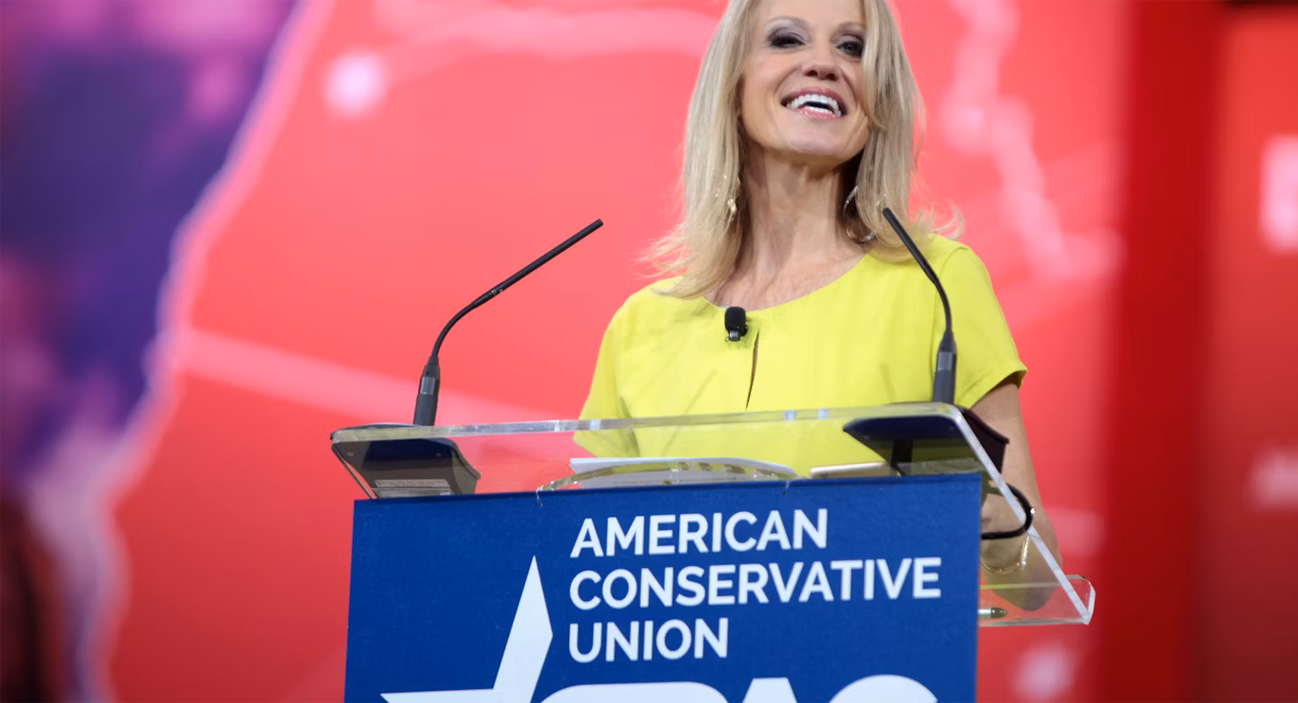
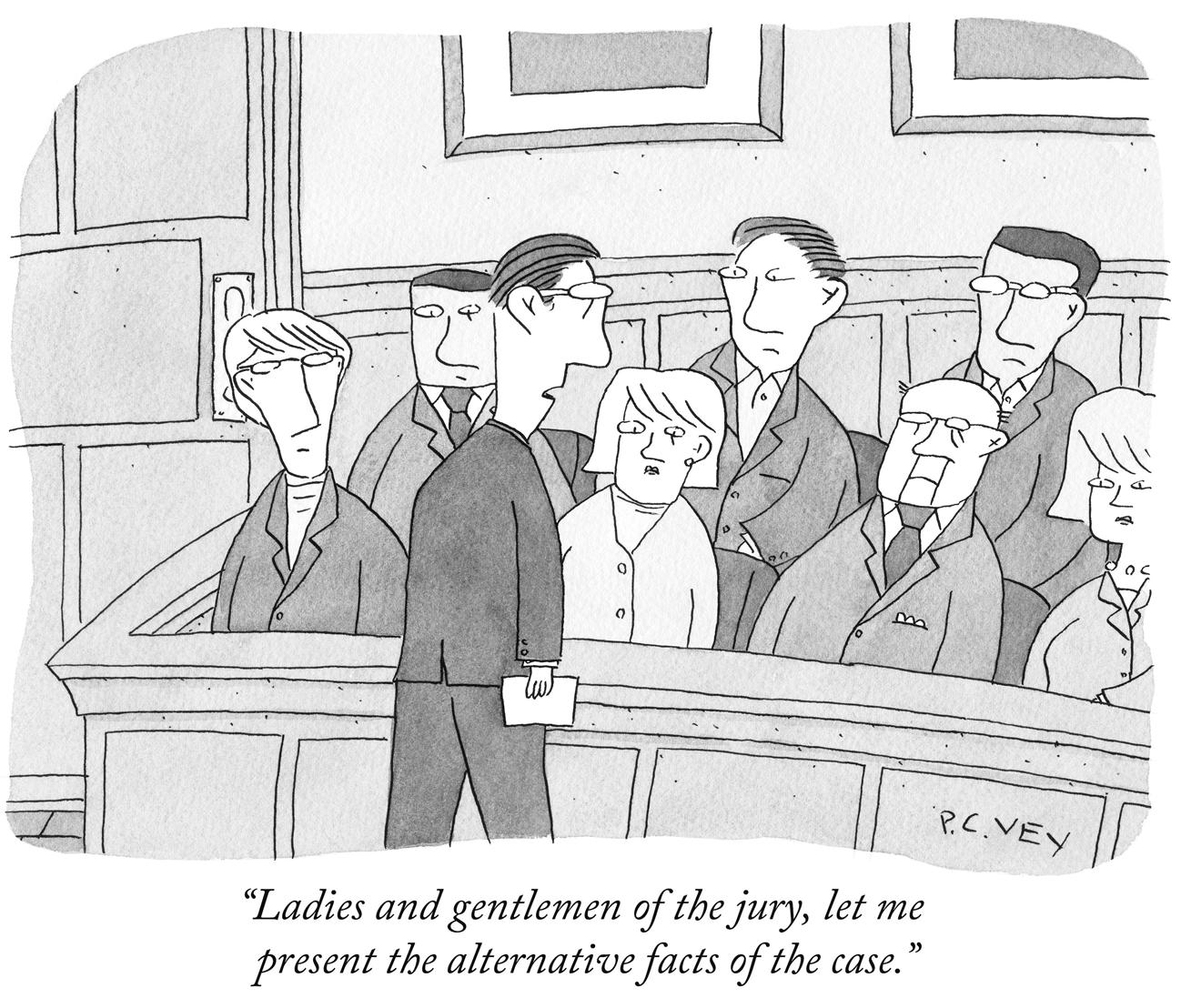
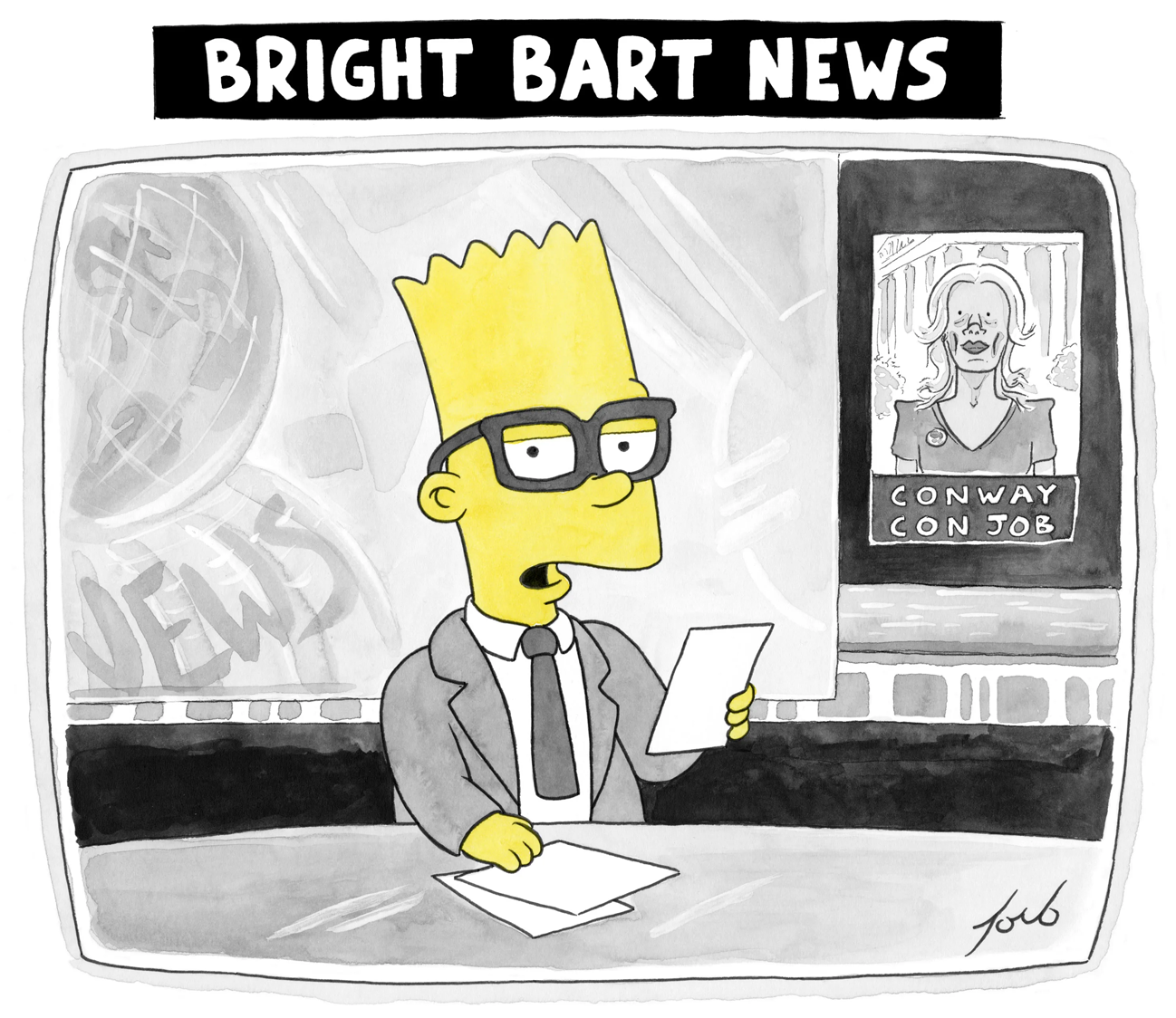
Fake News
Fake news or information disorder is false or misleading information (misinformation, disinformation, propaganda, and hoaxes) claiming the aesthetics and legitimacy of news. Fake news often has the aim of damaging the reputation of a person or entity, or making money through advertising revenue. Although false news has always been spread throughout history, the term fake news was first used in the 1890s when sensational reports in newspapers were common.
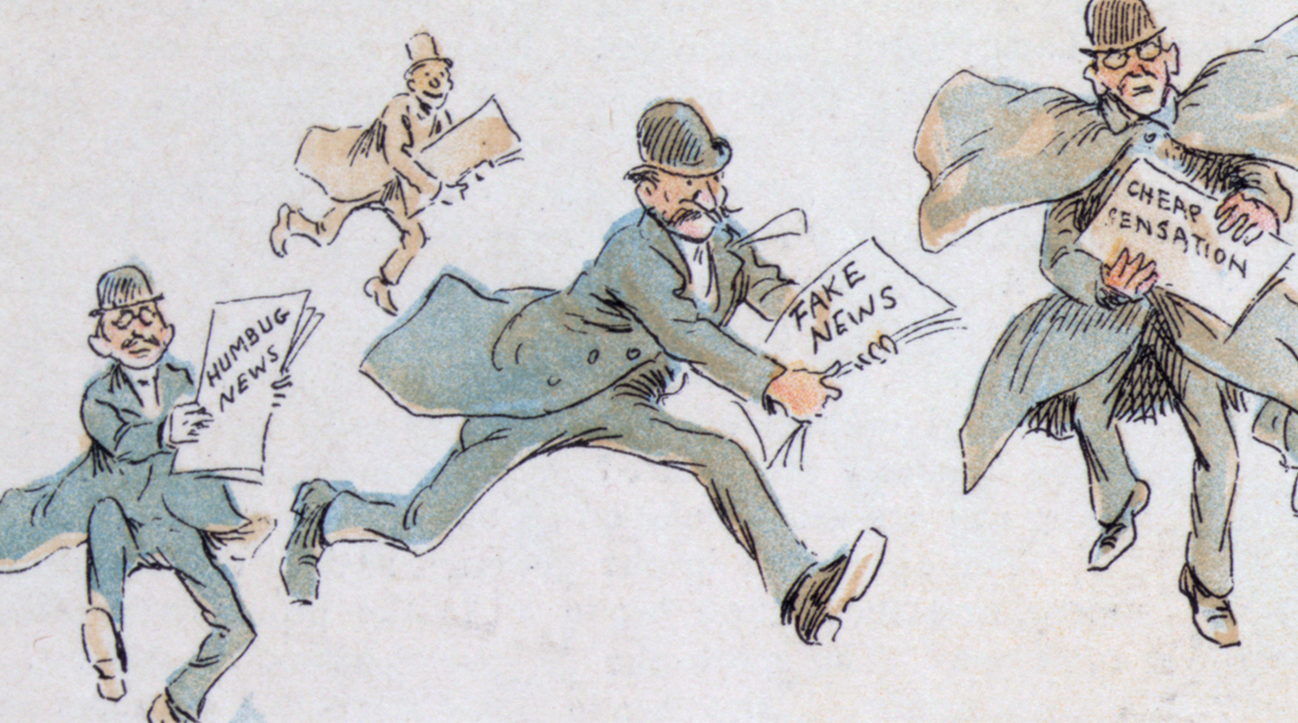
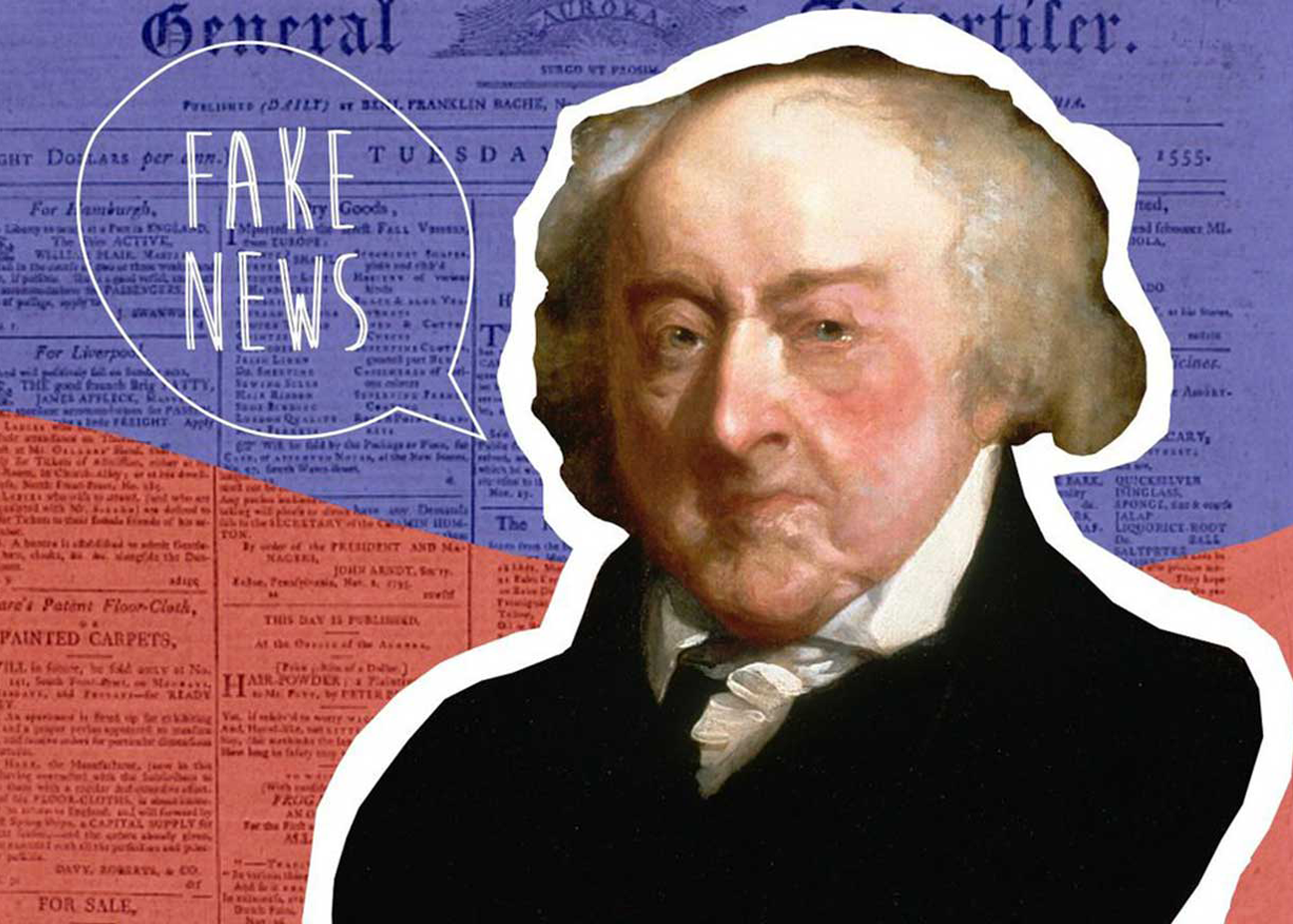
— Daniel Moynihan
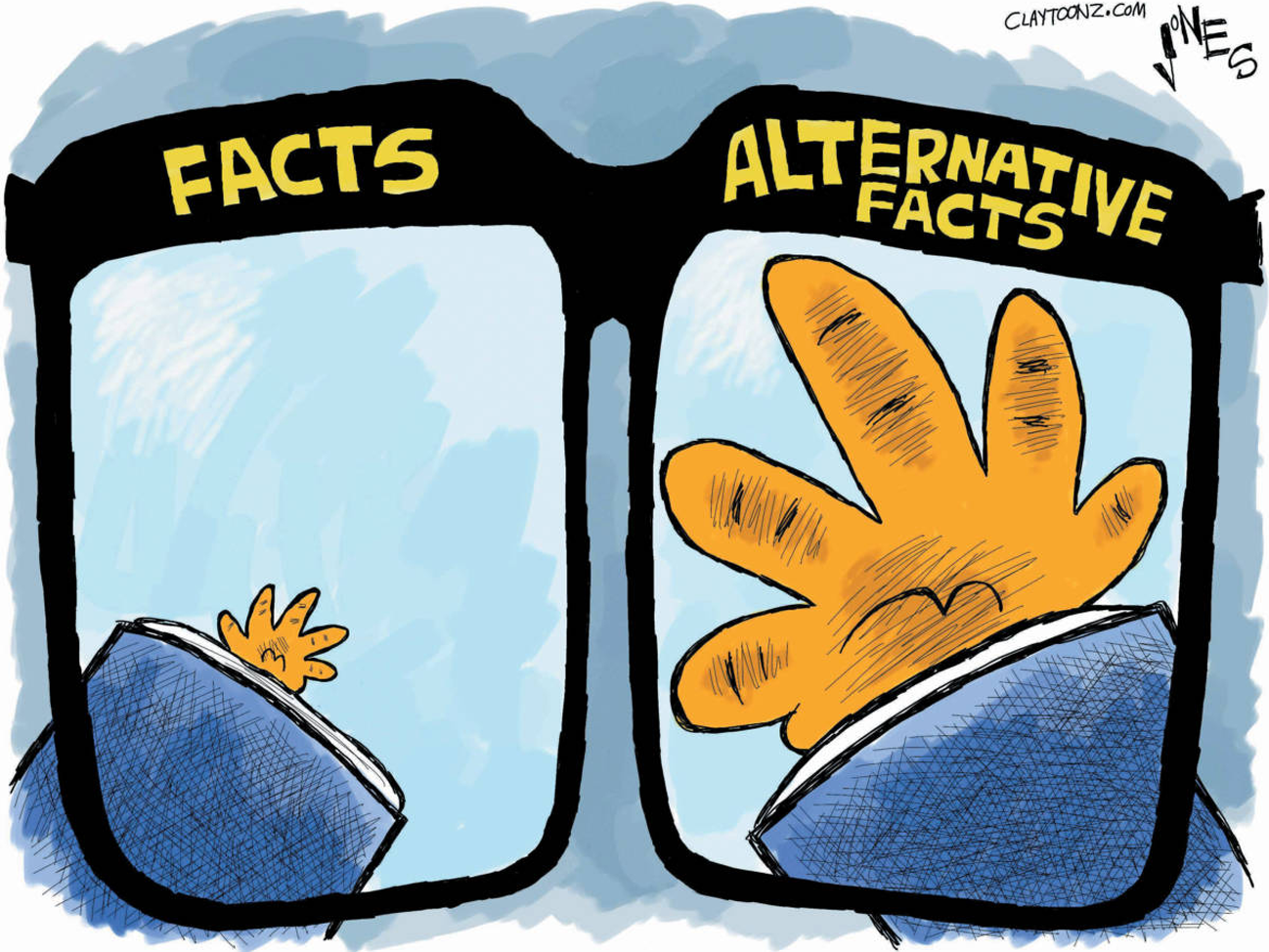
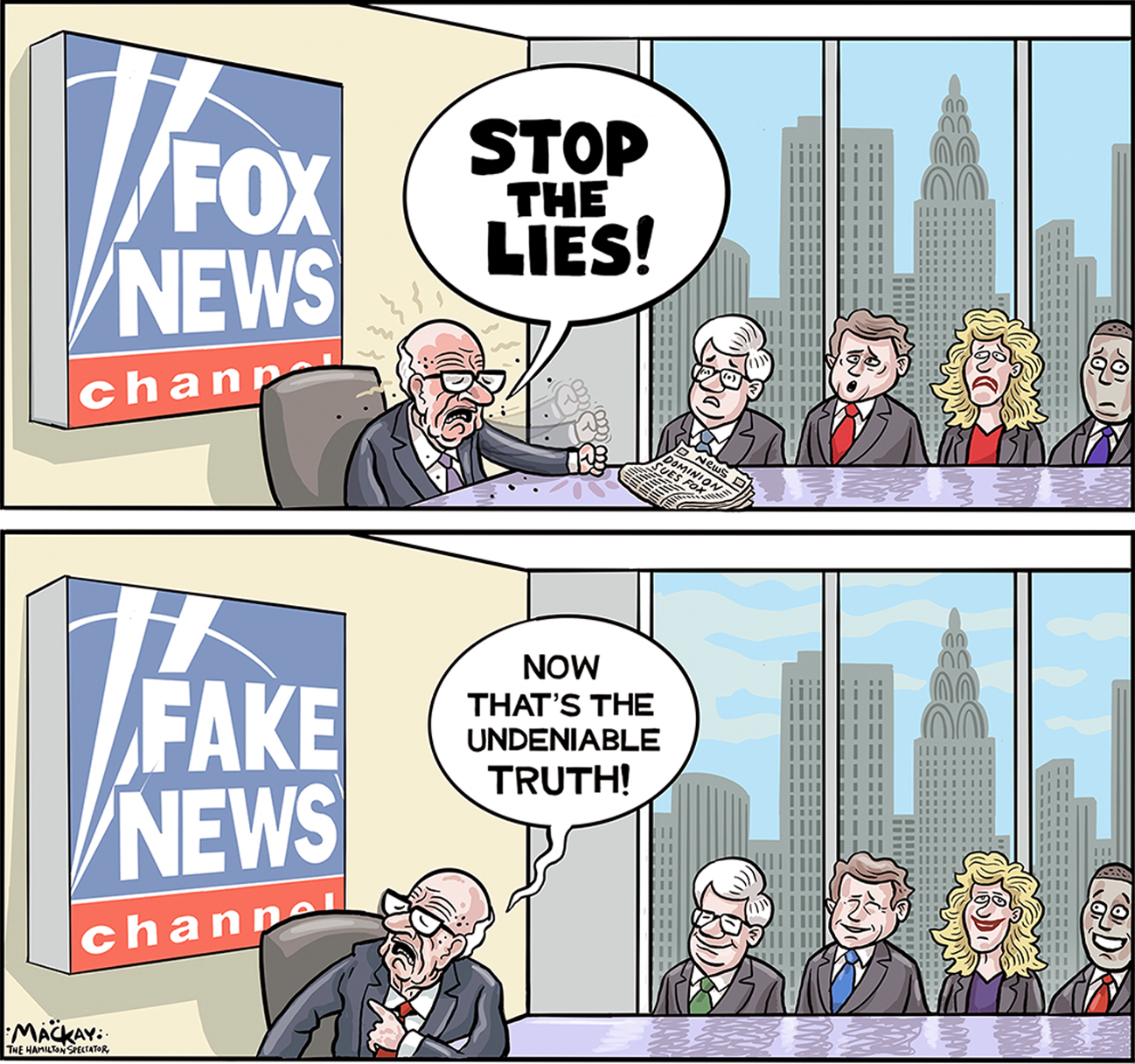
Truth isn’t truth
‘Truth isn’t truth’: Giuliani trumps ‘alternative facts’ with his Orwellian outburst. As a journalist wrote at the time, “when the definitive history of Donald Trump’s presidency comes to be written, many years hence, 11.02am on Sunday 19 August 2018 will surely be granted a special mention.” This is because that was the moment in time that the phrase was coined and it arguably might be said “to sum up the spirit of the [first] Trump era.”
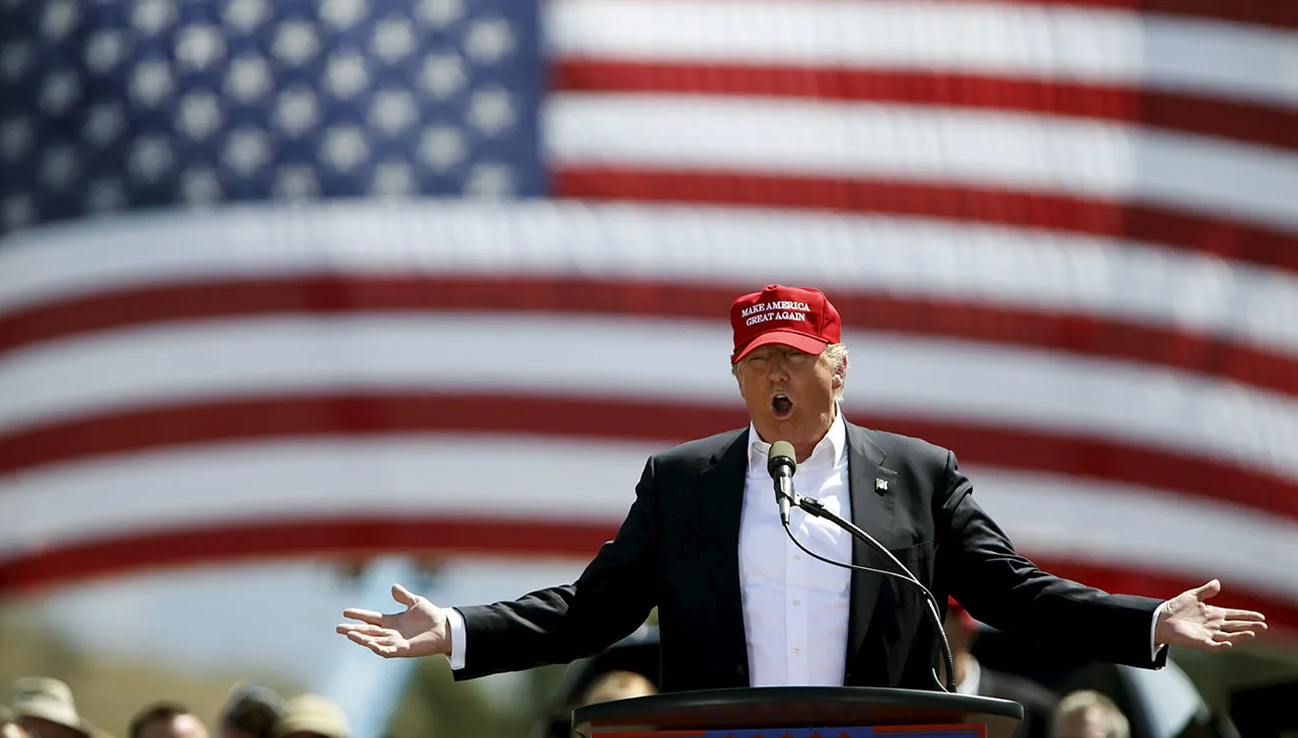
— Daniel Boorstin
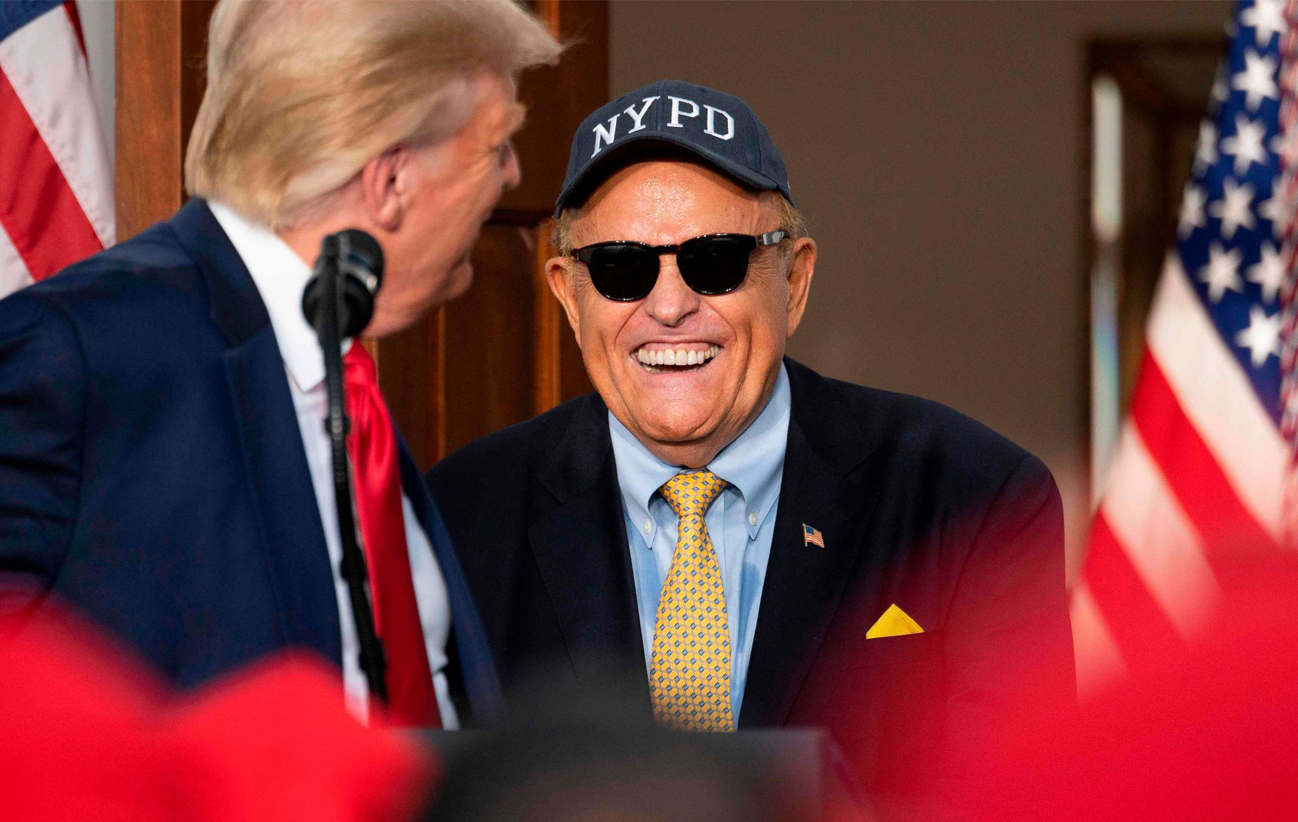
In a 2017 article for The Atlantic magazine — “How America Lost Its Mind” — Kurt Andersen writes that Americans were living in post-truth times:
Each of us is on a spectrum somewhere between the poles of rational and irrational. We all have hunches we can’t prove and superstitions that make no sense. Some of my best friends are very religious, and others believe in dubious conspiracy theories. What’s problematic is going overboard—letting the subjective entirely override the objective; thinking and acting as if opinions and feelings are just as true as facts. The American experiment, the original embodiment of the great Enlightenment idea of intellectual freedom, whereby every individual is welcome to believe anything she wishes, has metastasised out of control. From the start, our ultra-individualism was attached to epic dreams, sometimes epic fantasies—every American one of God’s chosen people building a custom-made utopia, all of us free to reinvent ourselves by imagination and will. In America nowadays, those more exciting parts of the Enlightenment idea have swamped the sober, rational, empirical parts. Little by little for centuries, then more and more and faster and faster during the past half century, we Americans have given ourselves over to all kinds of magical thinking, anything-goes relativism, and belief in fanciful explanation—small and large fantasies that console or thrill or terrify us. And most of us haven’t realised how far-reaching our strange new normal has become.

The NYT & misinformation (…?)
The point here is to let you, the reader, draw your own conclusions. The fog of war and vested interests are likely to forever cloud and muddy the precise events that occurred on October the 7th, 2023 (arguably, an informed and reasonable conclusion to draw would be one of inconclusiveness). A truth and reconciliation council (any time soon) and a universally agreed chain of events with preface causes and epilogue effects is most improbable (for the foreseeable future). What can, I think, be universally agreed upon was that that day has had cataclysmic ramifications within the region and across the globe.
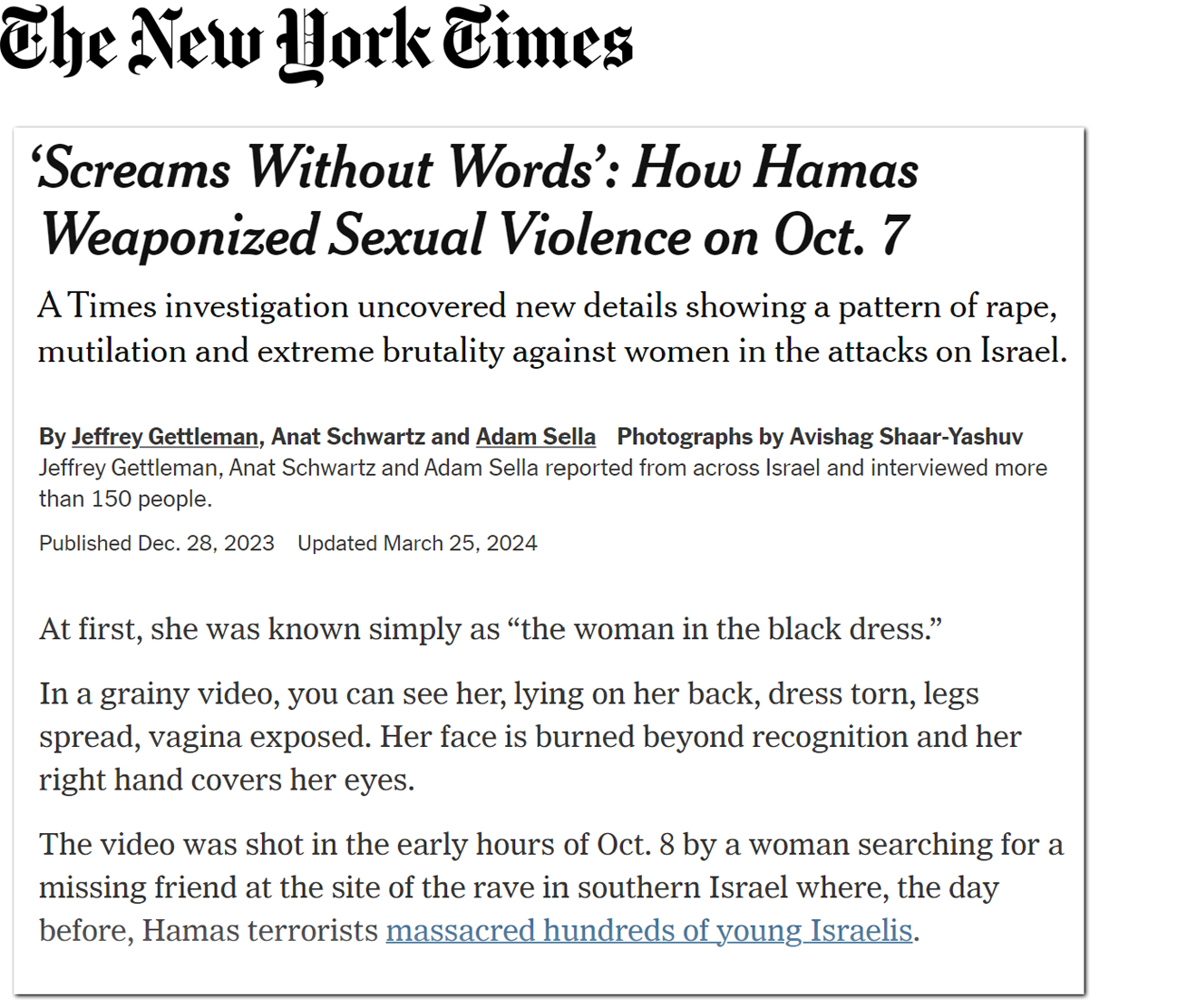
The above article “‘Screams Without Words’: How Hamas Weaponized Sexual Violence on Oct. 7,” published by The New York Times, was brutally shocking and (has subsequently become) highly controversial. The articles listed below cover this matter — they are broadly arranged chronologically as, the known (and unknown) facts change and crystallise with time. First, for context, I will point readers to a book and a report by Human Rights Watch (an NGO); I don’t claim the book by Eric Berkowitz to be faultless (far from it) but it does categorically demonstrate that, since time immemorial, men have dominated and defiled women and systematically curtailed their autonomy:

♦ Human Rights Watch (2024).
Berkowitz focuses on ‘sex crimes’ and how ‘sexuality’ has been codified in the law from Babylon, Mesopotamia and Ancient Greece up until the 19th c. in the West. As hinted to above, the majority of the book’s cases detail injustices committed by men against women. The book documents page after page of rape, endlessly approved and excused by the prevailing powers that be. As one reviewer puts it, the main takeaway of Sex and Punishment is that “anyone who thinks that sexual and reproductive autonomy is somehow an inalienable right needs a history lesson.” The 2024 Human Rights Watch report, “I Can’t Erase All the Blood from My Mind,” is linked to above for its assumed non-partisan status and meticulous nature (252 pages with hundreds and hundreds of references).
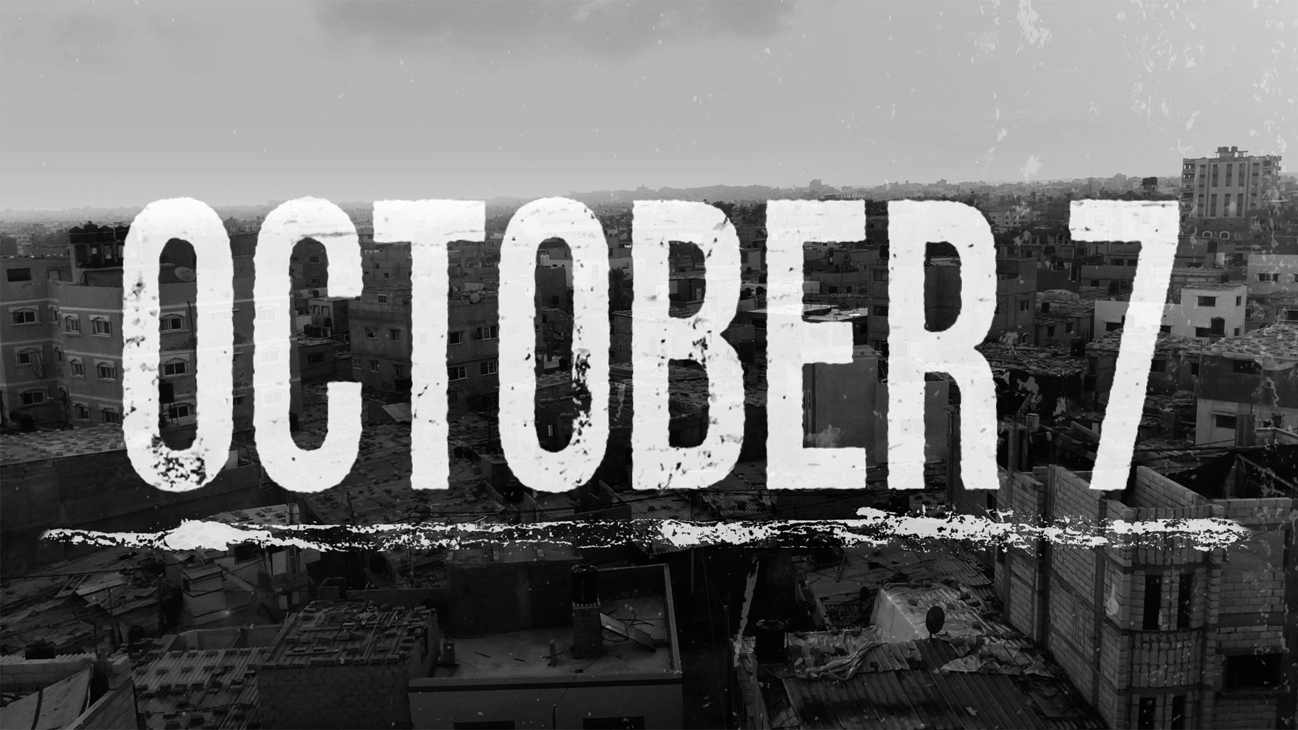
Al Jazeera’s Investigative Unit has carried out a forensic analysis of the events of October 7, when Hamas fighters launched an incursion into Israel. It finds “widespread human rights abuses by Hamas fighters and others who followed them through the fence from the Gaza Strip.” But, the investigation, which examined hours of footage from CCTV, dashcams, personal phones and headcams of killed Hamas fighters, has also found that “many of the stories that came out in the days following the attack were false.”
These include claims of atrocities such as the mass killing and beheading of babies as well as allegations of widespread and systematic rape – stories that were used repeatedly by politicians in Israel and the West to justify the ferocity of the subsequent bombardment of the Gaza Strip.
Articles on the matter:
Gettleman, J., Schwartz, A. &, Sella, A. (2023, December 28). ‘Screams Without Words’: How Hamas Weaponized Sexual Violence on Oct. 7. The New York Times. https://www.nytimes.com/2023/12/28/world/middleeast/oct-7-attacks-hamas-israel-sexual-violence.html
+972. (2023–2025). October 7 war. +972 magazine. https://www.972mag.com/topic/october-7-war/
The Gray Zone. (2023–2025). October 7. The Gray Zone. https://thegrayzone.com/tag/october-7/
Novara Media. (2023, December 6). Israel Attacks UN Women But Refuses Investigation Into Sexual Violence. Novara Media. https://youtu.be/BH0U8RJVXlU
Chotiner, I. (2023, December 10). How Hamas Used Sexual Violence on October 7th. The New Yorker. https://www.newyorker.com/news/q-and-a/how-hamas-used-sexual-violence-on-october-7th
Israel-Palestine News. (2024, January 4). Two reports debunk New York Times ‘investigative report’ of mass rape on October 7th. Israel-Palestine News. https://israelpalestinenews.org/two-reports-debunk-new-york-times-investigative-report-of-mass-rape-on-october-7th/
Adam, J. & Othman A. (2024, January 9). Coverage of Gaza War in the New York Times and Other Major Newspapers Heavily Favored Israel, Analysis Shows.
The Intercept. https://theintercept.com/2024/01/09/newspapers-israel-palestine-bias-new-york-times/
McKernan, B. (2024, January 18). Evidence points to systematic use of rape and sexual violence by Hamas in 7 October attacks. The Guardian. https://www.theguardian.com/world/2024/jan/18/evidence-points-to-systematic-use-of-rape-by-hamas-in-7-october-attacks
Boguslaw, D., & Grim, R. (2024, January 28). New York Times Puts “Daily” Episode on Ice Amid Internal Firestorm Over Hamas Sexual Violence Article. The Intercept. https://theintercept.com/2024/01/28/new-york-times-daily-podcast-camera/
Scahill, J., Grim, R, &, Boguslaw, D. (2024, February 28). “Between the Hammer and the Anvil” The Story Behind the New York Times October 7 Exposé. The Intercept. https://theintercept.com/2024/02/28/new-york-times-anat-schwartz-october-7/
Abunimah, A. &, Barrows-Friedman, N. (2024, February 29). Scandal grows around fraudulent New York Times “mass rapes” investigation. The Electronic Intifada. https://youtu.be/gfE3vasBQyE
Scahill, J. &, Grim, R. (2024, April 15). Leaked NYT Gaza Memo Tells Journalists to Avoid Words “Genocide,” “Ethnic Cleansing,” and “Occupied Territory.” The Intercept. https://theintercept.com/2024/04/15/nyt-israel-gaza-genocide-palestine-coverage/
Zhang, S. (2024, April 16). Leaked Document Shows NYT Censorship of Words Like “Genocide” in Gaza Coverage. Truthout. https://truthout.org/articles/leaked-document-shows-nyt-censorship-of-words-like-genocide-in-gaza-coverage/
Middle East Monitor. (2024, April 17). Cruelty of language: Leaked NY Times memo reveals moral depravity of US media. Middle East Monitor. https://www.middleeastmonitor.com/20240417-cruelty-of-language-leaked-ny-times-memo-reveals-moral-depravity-of-us-media/
Abunimah, A. (2024, March 1). NY Times found no 7 October rape victims, reporter admits. “https://electronicintifada.net/blogs/ali-abunimah/ny-times-found-no-7-october-rape-victims-reporter-admits
Al Jazeera. (2024, March 21) October 7: Forensic analysis shows Hamas abuses, many false Israeli claims. Al Jazeera. https://www.aljazeera.com/news/2024/3/21/october-7-forensic-analysis-shows-hamas-abuses-many-false-israeli-claims
Rozovsky, L. (2024, April 18). 15 Witnesses, Three Confessions, a Pattern of Naked Dead Bodies. Haaretz. https://www.haaretz.com/israel-news/2024-04-18/ty-article-magazine/witnesses-confessions-naked-dead-bodies-all-the-evidence-of-hamas-rape-on-oct-7/0000018e-f114-d92e-abfe-f77f7e3f0000
Gessen, M. (2024, July 20). What We Know About the Weaponization of Sexual Violence on October 7th. The New Yorker.
https://www.newyorker.com/news/the-weekend-essay/what-we-know-about-the-weaponization-of-sexual-violence-on-october-7th
Abunimah, A. (2025, January 6). Israel still can’t find any 7 October rape victims, prosecutor admits. The Electronic Intifada. https://electronicintifada.net/blogs/ali-abunimah/israel-still-cant-find-any-7-october-rape-victims-prosecutor-admits
Middle East Monitor. (2025, January 6). No rape allegations filed from 7 October, reveals Israeli prosecutor. Middle East Monitor. https://www.middleeastmonitor.com/20250106-no-rape-allegations-filed-from-7-october-reaveals-israeli-prosecutor/
Wikipedia. (2025, February 25). Sexual and gender-based violence in the October 7 Hamas-led attack on Israel. Wikipedia. https://en.wikipedia.org/wiki/Sexual_and_gender-based_violence_in_the_October_7_Hamas-led_attack_on_Israel
states of surveillance
The Pegasus Project is an international investigative journalism initiative that revealed governments’ espionage on journalists, opposition politicians, activists, business people and others using the private Pegasus spyware developed by the Israeli technology and cyber-arms company NSO Group.
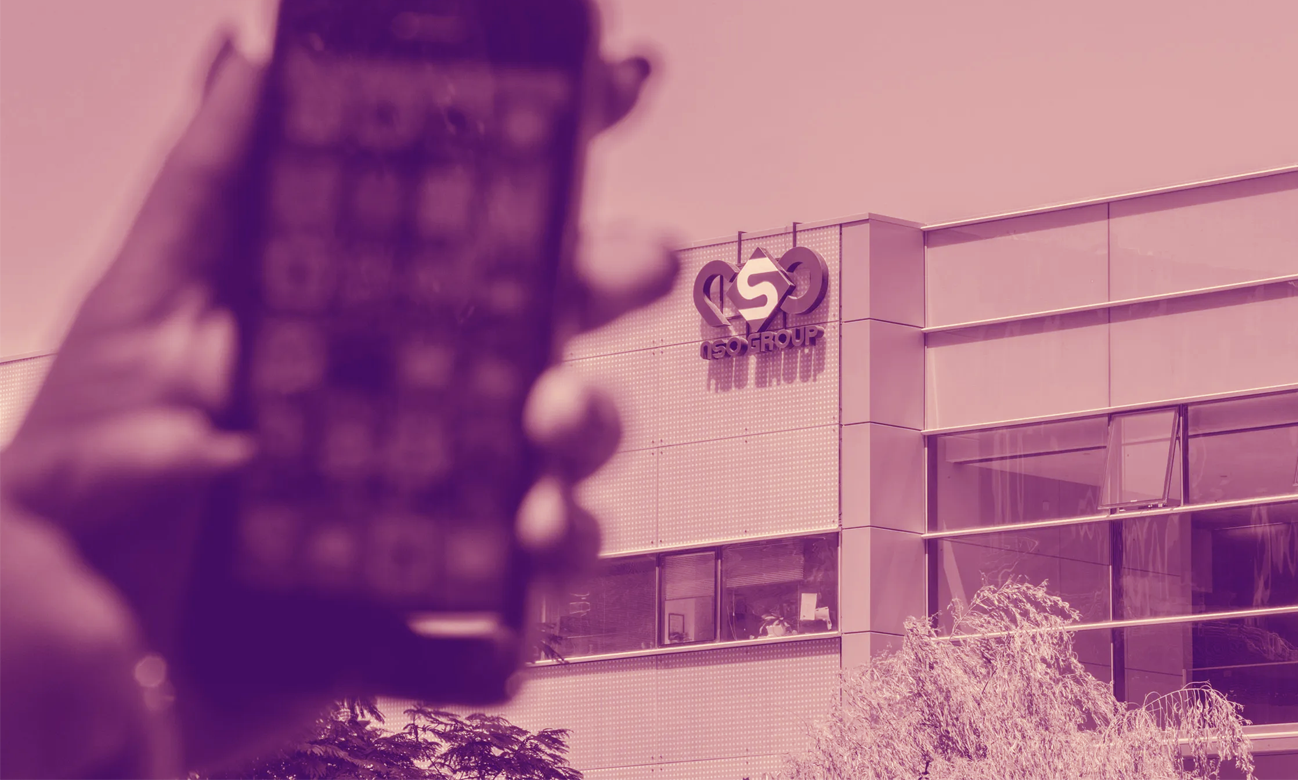
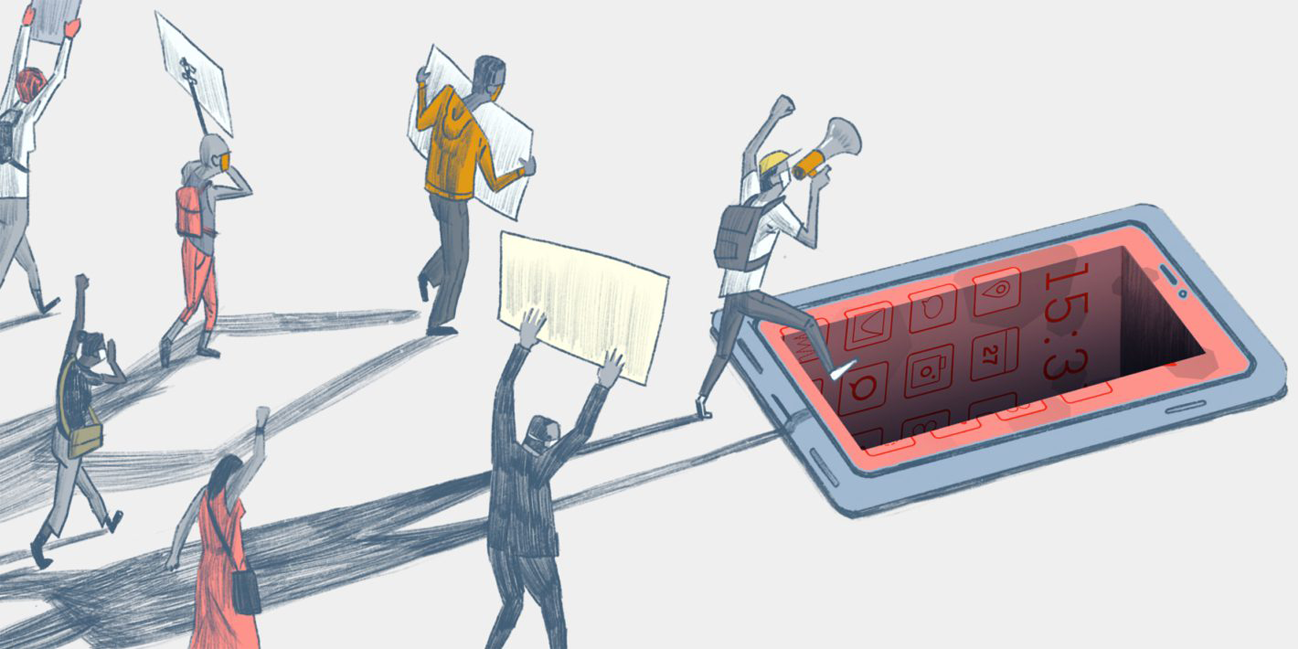
The investigation by The Guardian and 16 other media organisations suggests widespread and continuing abuse of NSO’s hacking spyware. The leak contains a list of more than 50,000 phone numbers that, it is believed, have been identified as those of people of interest by clients of NSO since 2016. Forbidden Stories, a Paris-based nonprofit media organisation, and Amnesty International initially had access to the leaked list and shared access with media partners as part of the Pegasus project, a reporting consortium. According to Priest (2021), “a UAE agency put Pegasus spyware on phone of Jamal Khashoggi’s wife months before his murder.” This, sh suggests — based on new forensics evidence — challenges NSO claims that the murdered journalist’s wife, Hanan Elatr, ‘was not a target.’” Kirchgaessner (2021) writes that there “definitely people who refer to the Pegasus spyware tool from NSO Group as a weapon.” For further information on this matter see: Amnesty International (2021), Cohn (2021), Forbidden Stories (2021), Stelter (2021), The Guardian (2021), The Washington Post (2022).

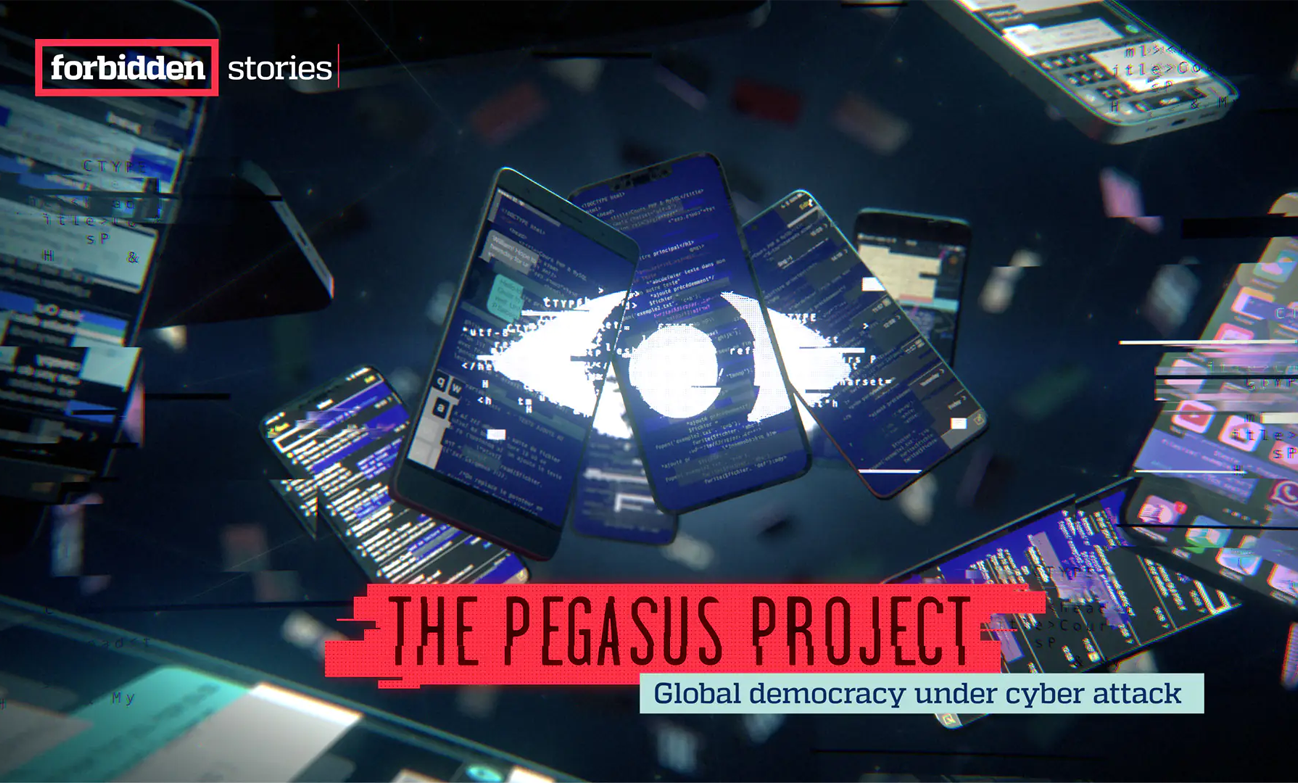
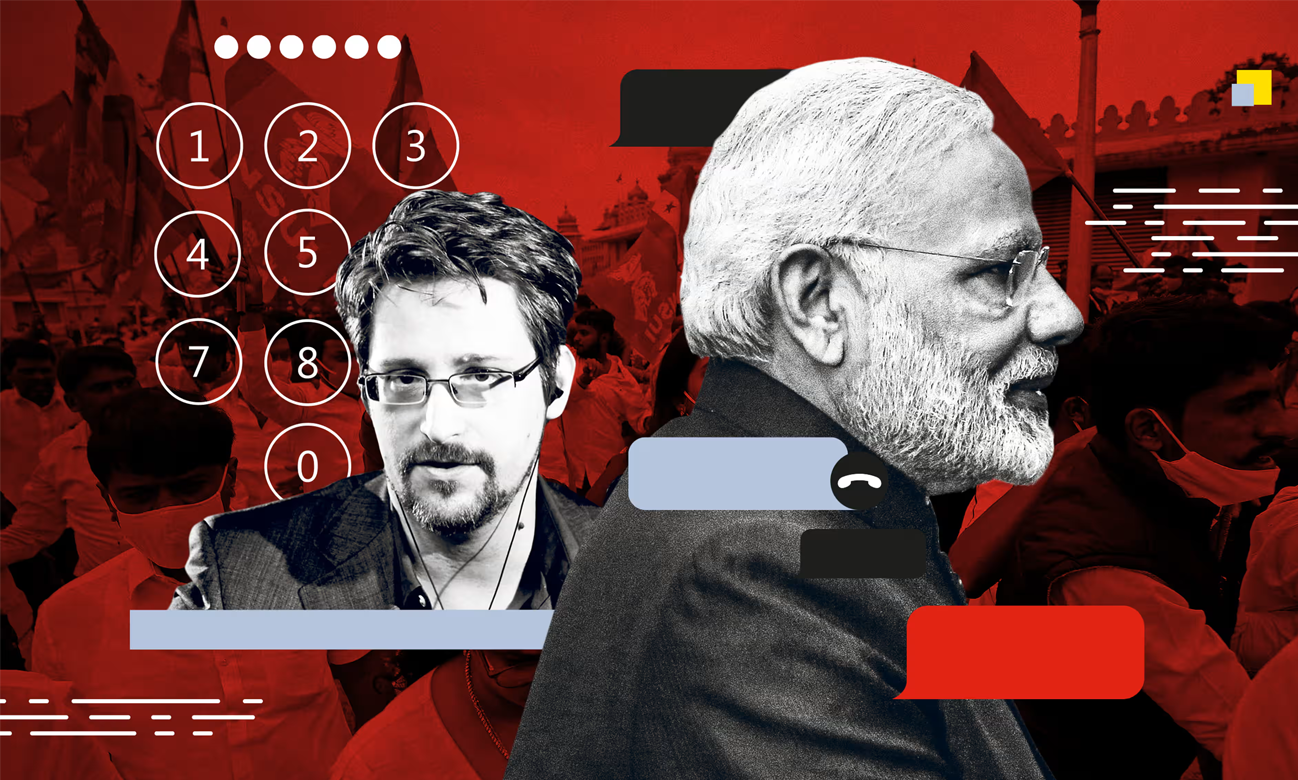
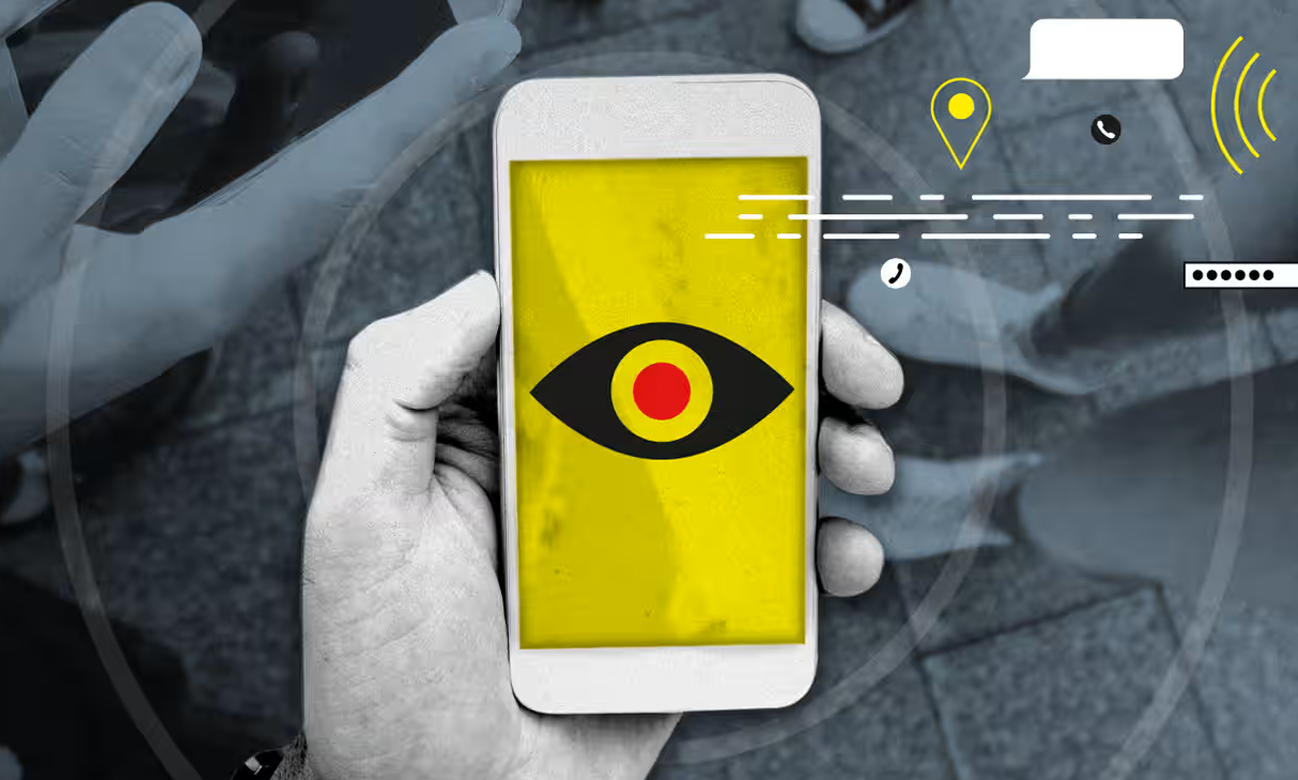
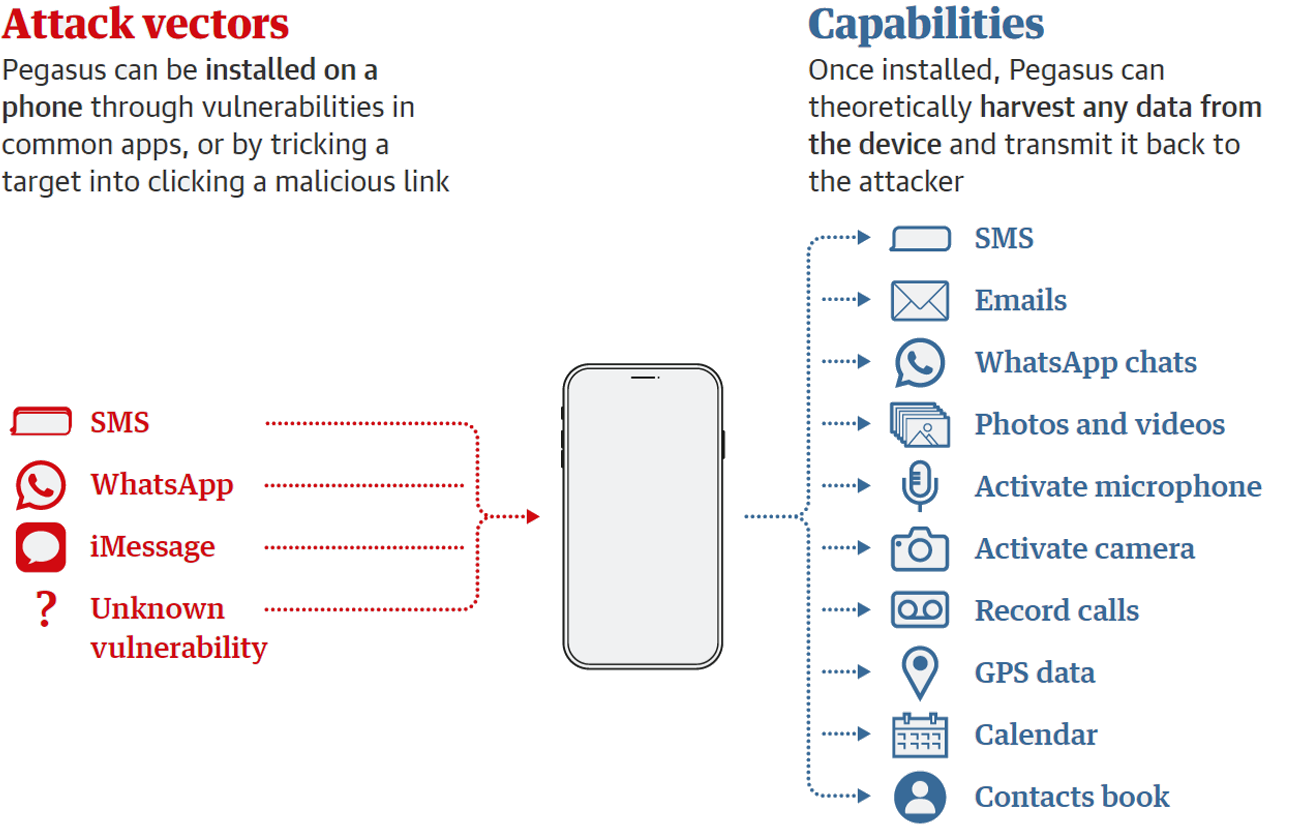
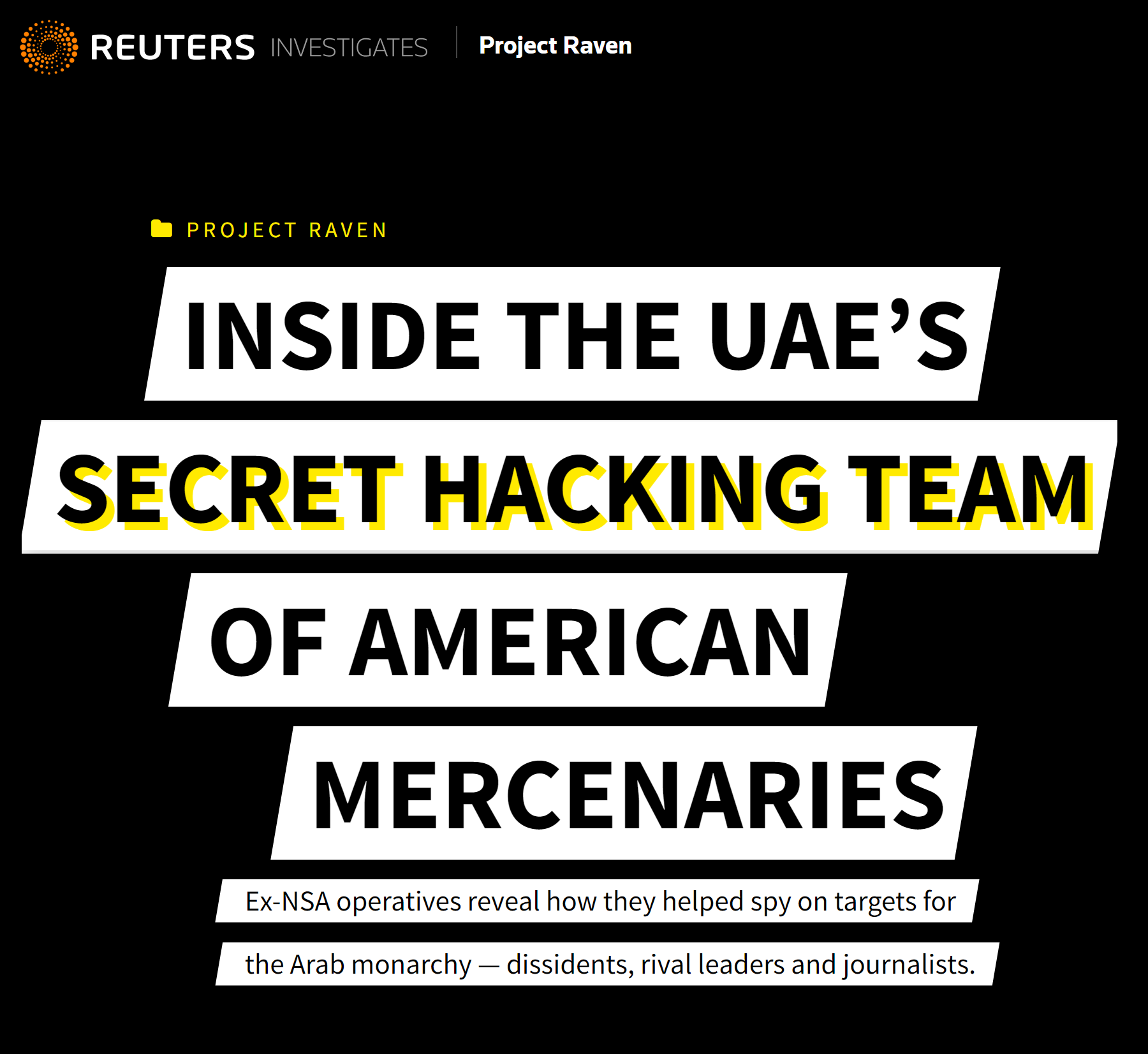
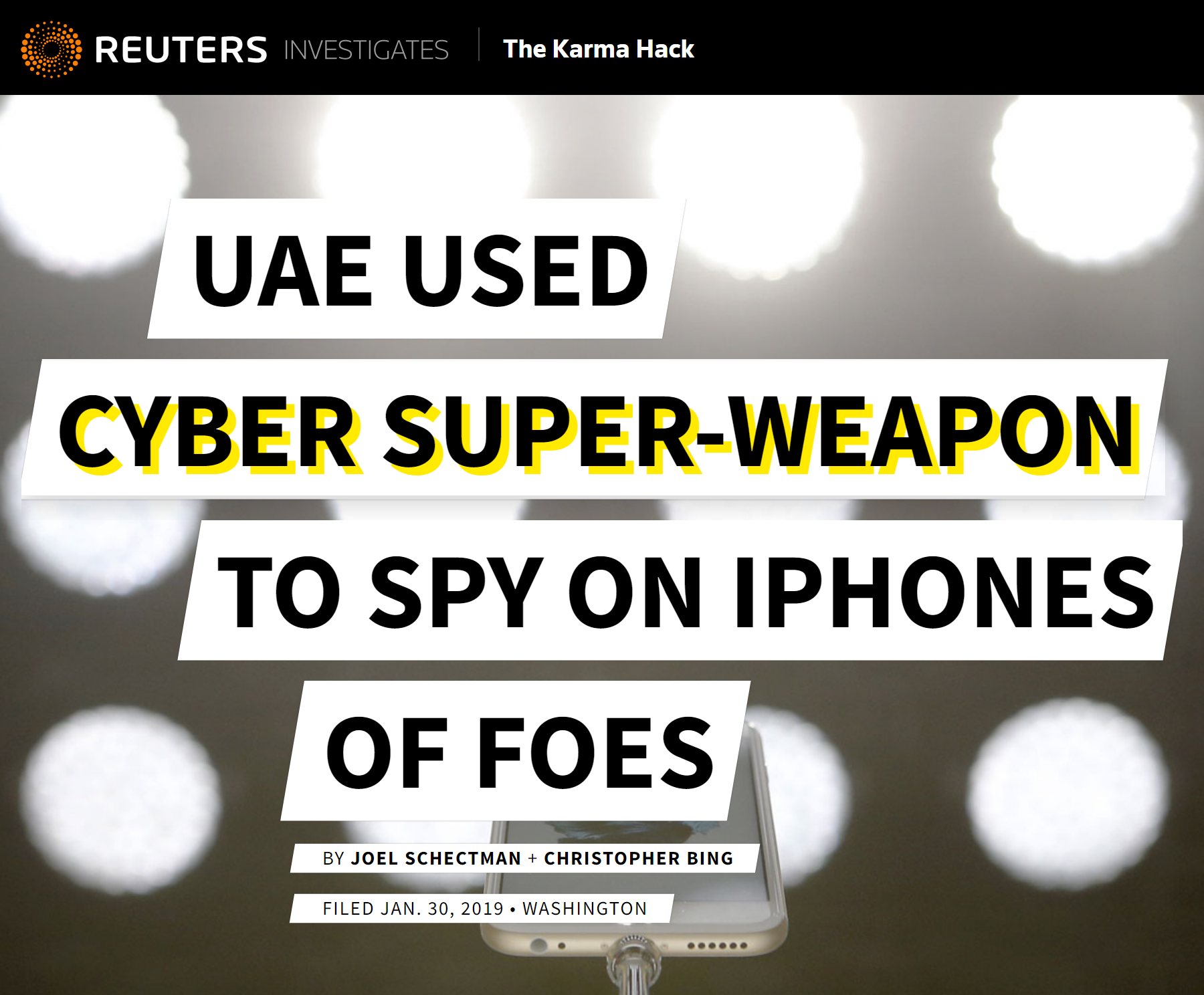
Et cetera
The U.S. president said in early 2025 that he wanted Palestinians to leave the occupied Gaza Strip permanently. This announcement (repeated many times) was widely condemned as ethnic cleansing.
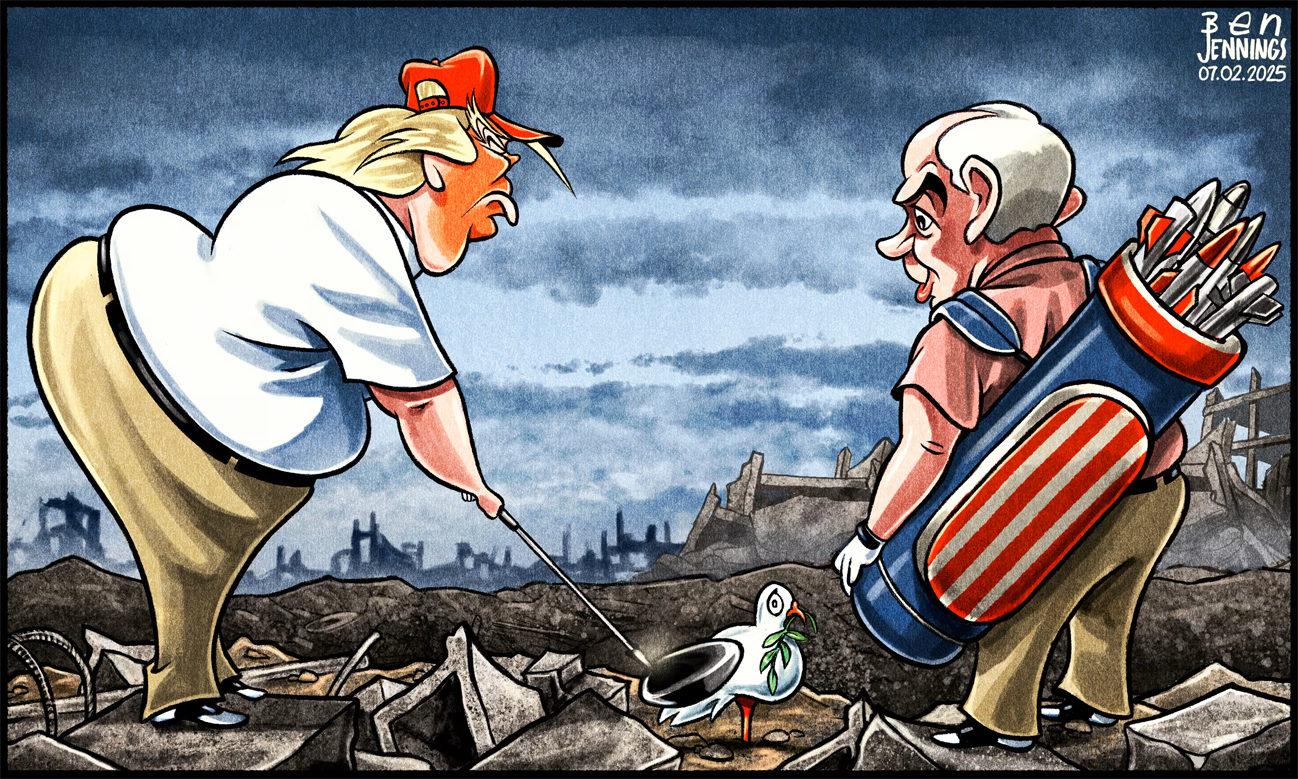
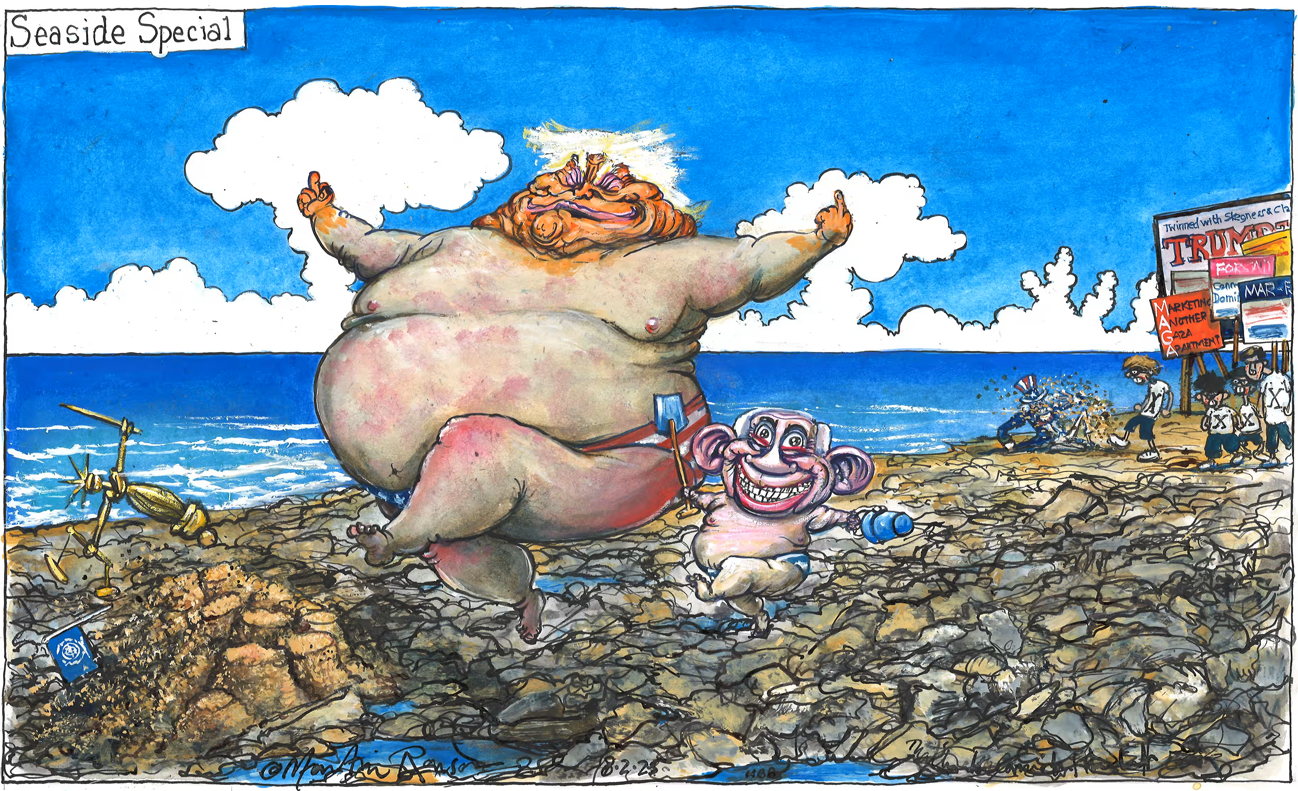
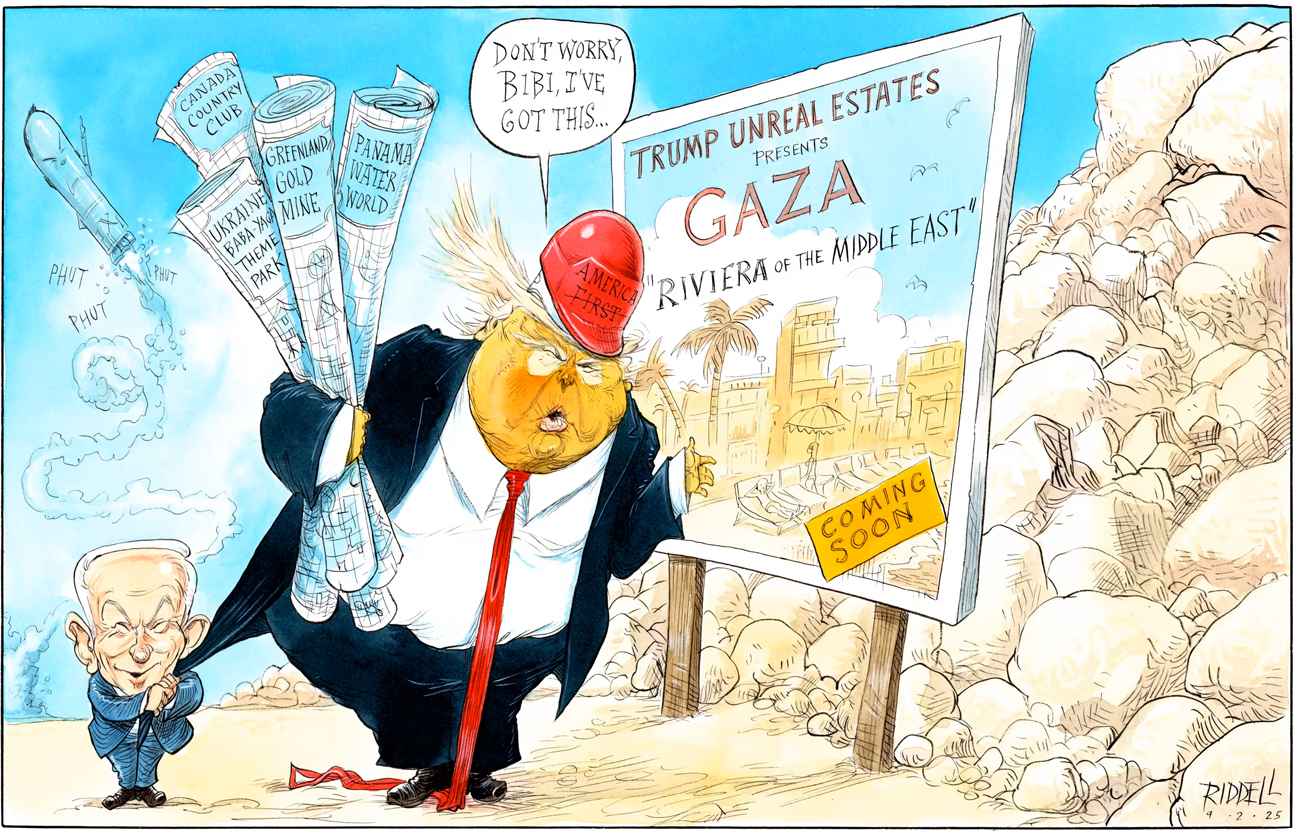
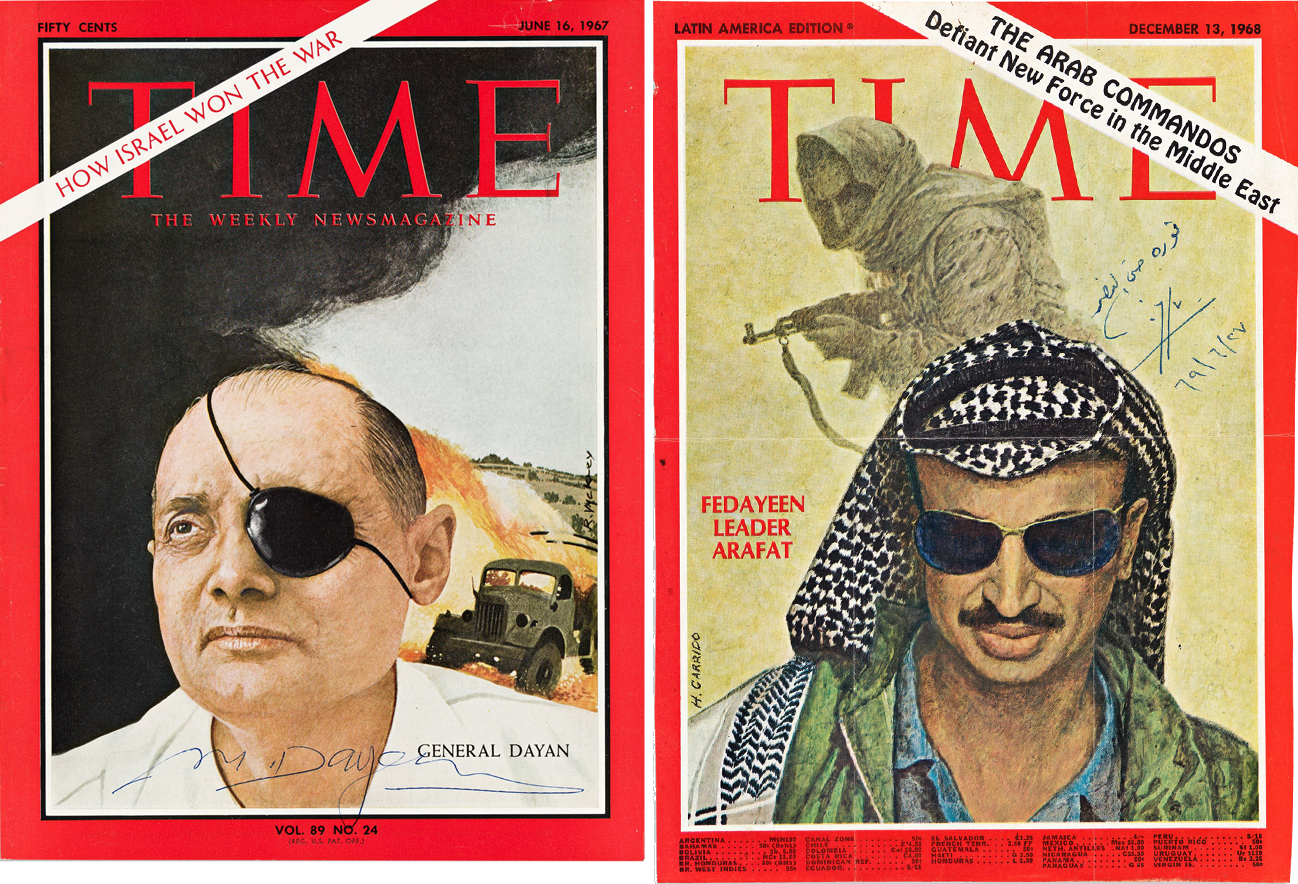
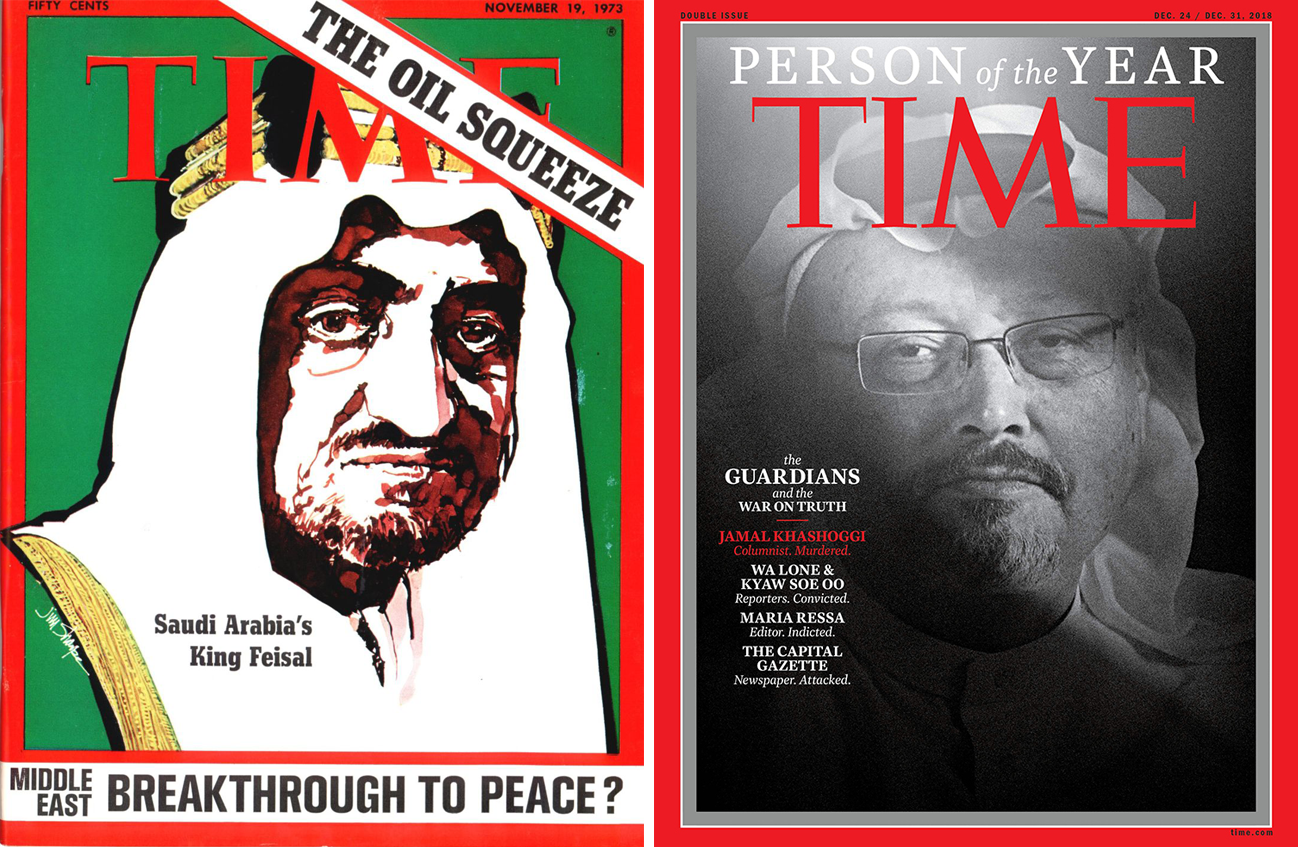
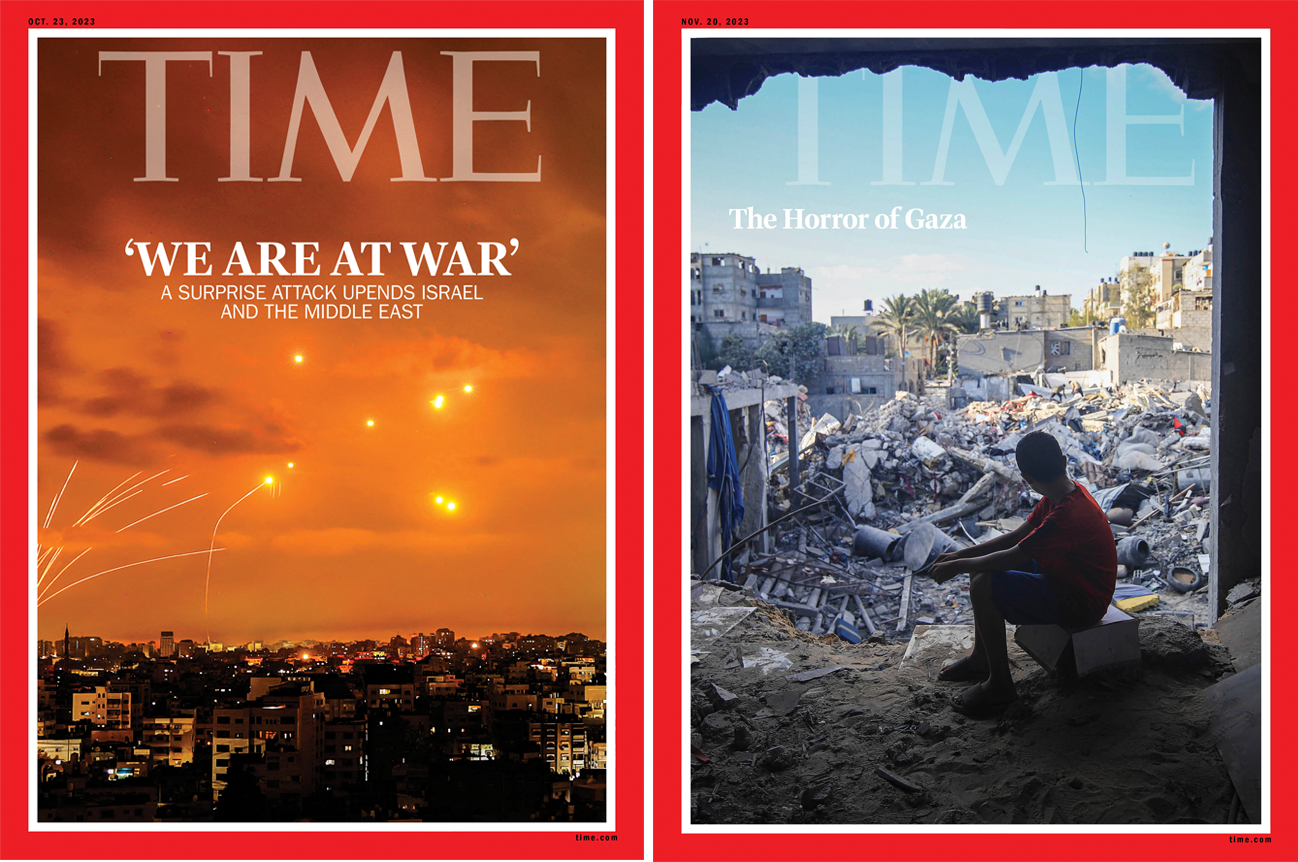
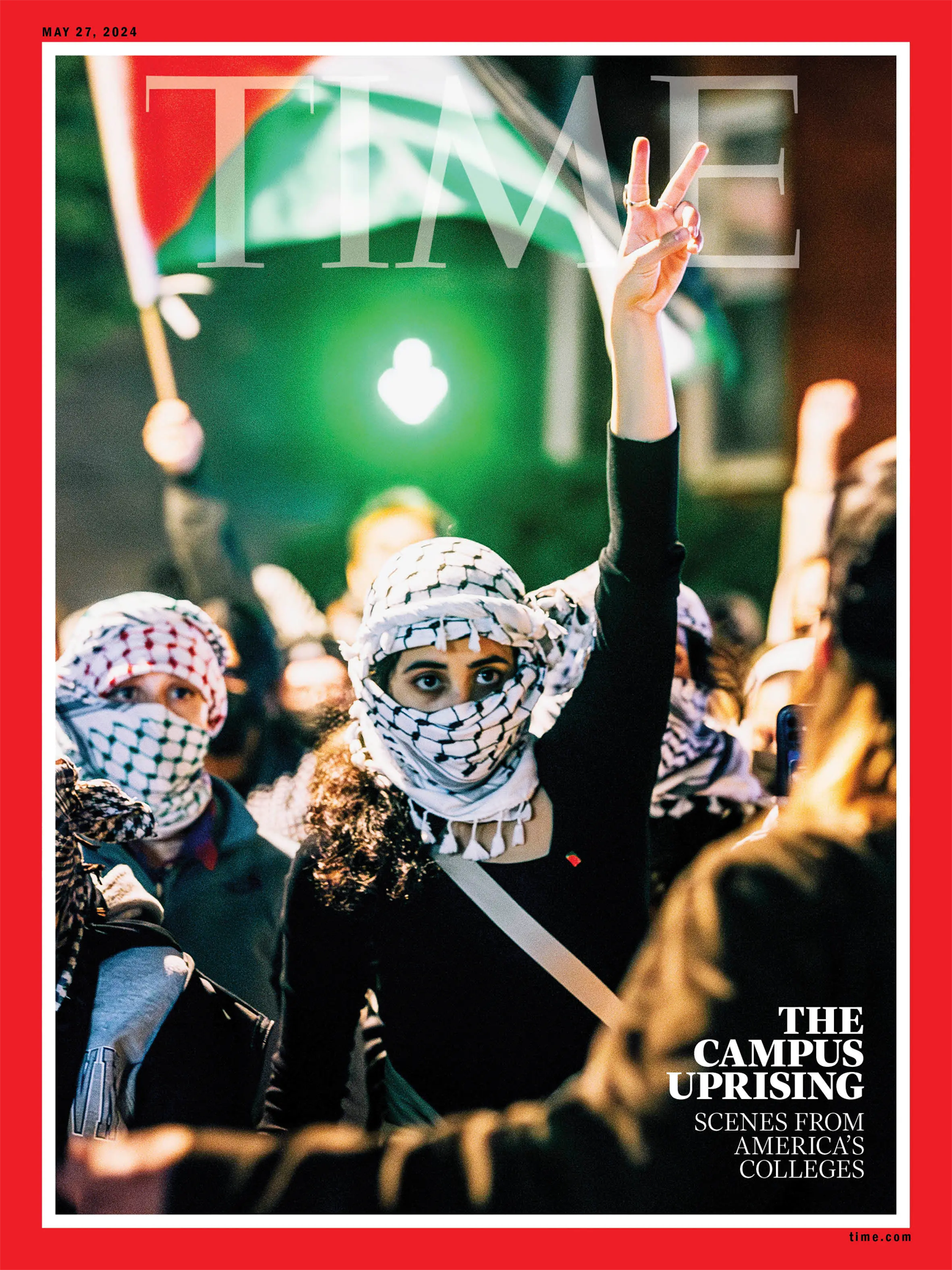
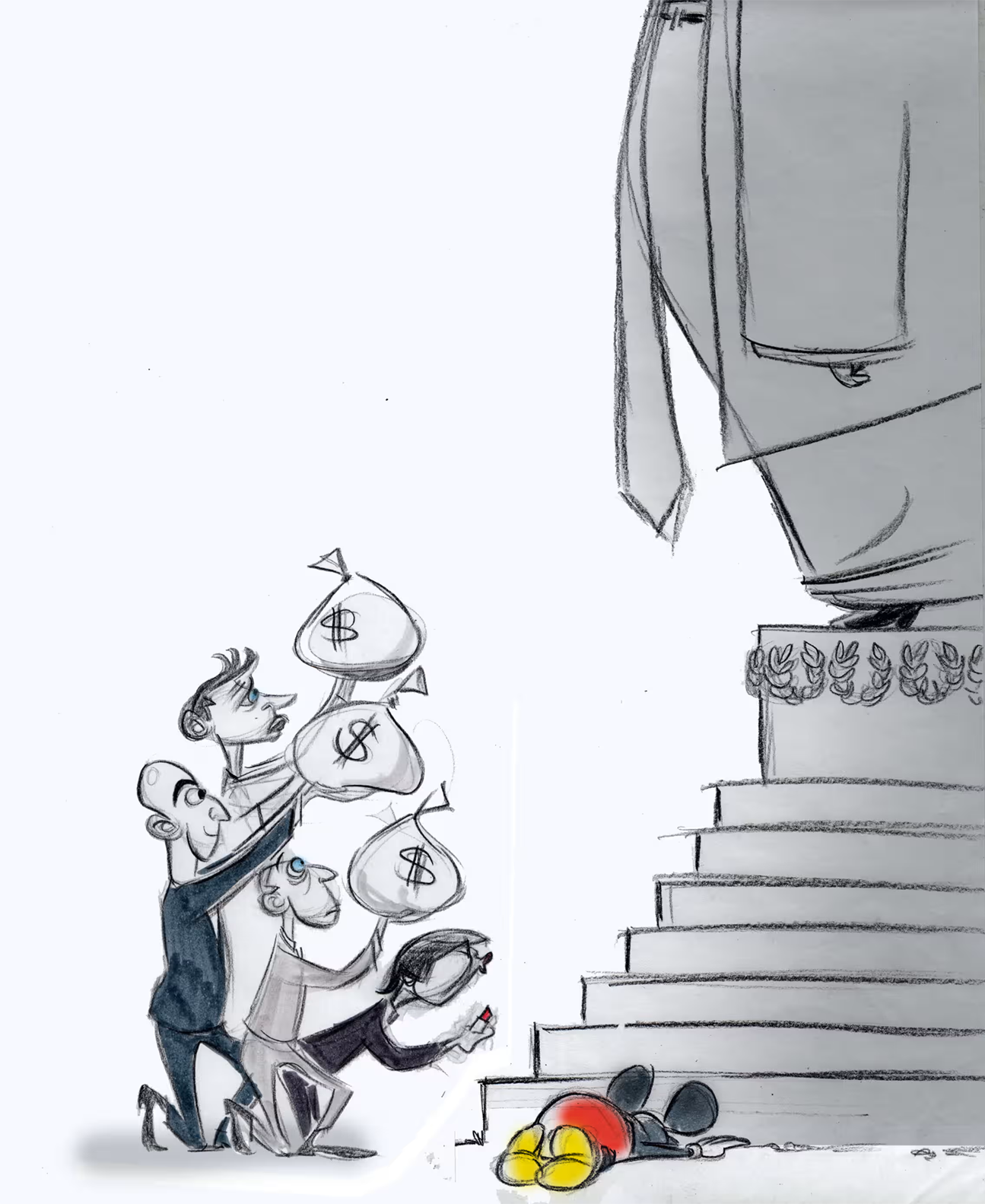

Endnotes
[1]
The instigator (if not architect/author) of Saudi Economic Vision 2030 (2016), Crown Prince Mohammed bin Salman has been the subject of two recent in-depth documentaries by the public, non-commercial broadcasters of the UK (BBC, 2024) and the USA (PBS, 2019) respectively. Both documentaries touch upon the killing of Jamal Khashoggi (Al-Rasheed, 2020, p. 334; Milanovic, 2020, pp. 1-2). As reported by Mazzetti and Hubbard (2019) , there was said to be a “secret campaign to silence dissenters—which included the surveillance, kidnapping, detention of Saudi citizens—over a year before the killing of Jamal Khashoggi. This is “according to American officials who have read classified intelligence reports about the [Saudi] campaign” (in this regard, see also: Government of the USA, 2021; Reporters Without Borders, 2022; G. Wood, 2022; P. Wood, 2022).
References
Al-Rasheed, M. (2020). Brute Force and Hollow Reforms in Saudi Arabia. Current history, 119(821), 331–337. https://doi.org/10.1525/curh.2020.119.821.331
Alshaer, A. (Ed.) (2019). A Map of Absence: An Anthology of Palestinian Writing on the Nakba. Saqi Books.
Amnesty International. (2021, July 18). Forensic Methodology Report: How to catch NSO Group’s Pegasus. Amnesty International. https://www.amnesty.org/en/documents/doc10/4487/2021/en/
Andersen, K. (2017, December 28). How America Lost Its Mind. The Atlantic. https://www.theatlantic.com/magazine/archive/2017/09/how-america-lost-its-mind/534231/
BBC. (2024). The Kingdom: The World’s Most Powerful Prince. [Television documentary]. London: British Broadcasting Corporation. https://www.bbc.co.uk/iplayer/episodes/m001zprm/the-kingdom-the-worlds-most-powerful-prince
Bennet, J. (2023, December 14). When the New York Times lost its way. 1843 magazine, The Economist. https://www.economist.com/1843/2023/12/14/when-the-new-york-times-lost-its-way
Bergman, R. (2018). Rise and Kill First: The Secret History of Israel’s Targeted Assassinations. Random House Publishing Group.
Berkowitz, E. (2013). Sex and Punishment: Four Thousand Years of Judging Desire. Saqi.
Bing, C., & Schectman, J. (2019a). The Karma Hack – UAE used cyber superweapon to spy on iPhones of foes. Reuters. https://www.reuters.com/investigates/special-report/usa-spying-karma/
Bing, C., & Schectman, J. (2019b). Project Raven – Inside the UAE’s secret hacking team of American mercenaries. Reuters. https://www.reuters.com/investigates/special-report/usa-spying-raven/
Chomsky, N. (2012). Making the Future: Occupations, Interventions, Empire and Resistance. Hamish Hamilton.
Chomsky, N. (2016). Who Rules the World? Henry Holt and Company.
Cohn, C. (2021, July 20). Pegasus Project Shows the Need for Real Device Security, Accountability, and Redress for Those Facing State-Sponsored Malware. Electronic Frontier Foundation. https://www.eff.org/deeplinks/2021/07/nso-group-leak-shows-need-real-device-security-accountability-and-redress-those
Deibert, R. J. (2023). The Autocrat in Your iPhone: How Mercenary Spyware Threatens Democracy. Foreign Affairs, 102(1), 72–88. Retrieved from https://www.foreignaffairs.com/world/autocrat-in-your-iphone-mercenary-spyware-ronald-deibert
Elgindy, K. (2019). Blind Spot: America and the Palestinians, from Balfour to Trump. Brookings Institution Press.
Erakat, N. (2019). Justice for Some: Law and the Question of Palestine. Stanford University Press.
Finkelstein, N. (2018). Gaza: An Inquest into Its Martyrdom. University of California Press.
Forbidden Stories. (2021, February 2). Pegasus Project: a worldwide collaboration to counter a global crime. Forbidden Stories. https://forbiddenstories.org/projects_posts/pegasus-project/
Government of the USA. (2021). Assessing the Saudi Government’s Role in the Killing of Jamal Khashoggi. Washington DC: Office of the Director of National Intelligence.
Herman, E. S., Chomsky, N. (1988). Manufacturing Consent: The Political Economy of the Mass Media. Pantheon Books.
Heron, P. (2018). ‘This book is not about Gaza. It is about what has been done to Gaza.’. [Gaza: an inquest into its martyrdom, Norman Finkelstein]. Socialist Lawyer, 80(October), 38–40. https://doi.org/10.13169/socialistlawyer.80.0038
Human Rights Watch. (2024). “I Can’t Erase All the Blood from My Mind” Palestinian Armed Groups’ October 7 Assault on Israel. Human Rights Watch. https://www.hrw.org/report/2024/07/17/i-cant-erase-all-blood-my-mind/palestinian-armed-groups-october-7-assault-israel
Karmi, G. (2015). Return: A Palestinian Memoir. Verso Books.
Khalidi, R. (2020). The Hundred Years’ War on Palestine: A History of Settler Colonialism and Resistance, 1917-2017. Profile Books.
Kirchgaessner, S. (2021, July 20). The Spyware Tool Tracking Dissidents Around the World. New Yorker. https://www.newyorker.com/news/q-and-a/the-spyware-tool-tracking-dissidents-around-the-world
Levy, G. (2024). The Killing of Gaza: Reports on a Catastrophe. Verso Books.
Loewenstein, A., & Moor, A. (Eds.). (2012). After Zionism: One State for Israel and Palestine. Saqi Books.
Mazzetti, M., & Hubbard, B. (2019, March 18). Saudi Prince Ran Brutal Campaign To Stifle Dissent. The New York times. https://www.nytimes.com/2019/03/17/world/middleeast/khashoggi-crown-prince-saudi.html
Milanovic, M. (2020). The Murder of Jamal Khashoggi: Immunities, Inviolability and the Human Right to Life. Human rights law review, 20(1), 1–49. https://doi.org/10.1093/hrlr/ngaa007
Muna, M., & Teller, M. (Eds.). (2024). Daybreak in Gaza: Stories of Palestinian Lives and Culture. Saqi Books.
Pappé, I. (2006). The Ethnic Cleansing of Palestine. Oneworld.
Pappé, I. (Ed.) (2015). Israel and South Africa: The Many Faces of Apartheid. Bloomsbury Publishing.
Pappé, I. (2017). Ten Myths About Israel. Verso Books.
Pappé, I. (2024). A Very Short History of the Israel–Palestine Conflict. Oneworld Publications.
PBS. (2019). The Crown Prince of Saudi Arabia. [Television documentary]. Arlington, Virginia: Public Broadcasting Service. https://www.pbs.org/wgbh/frontline/documentary/the-crown-prince-of-saudi-arabia/
Priest, D. (2021, December 21). A UAE agency put Pegasus spyware on phone of Jamal Khashoggi’s wife months before his murder, new forensics show. The Washington Post. https://www.washingtonpost.com/nation/interactive/2021/hanan-elatr-phone-pegasus/
Raz, A. (2024). Loot: How Israel Stole Palestinian Property. Verso Books.
Reporters Without Borders. (2022, September 30). Four years after orchestrating the killing of Jamal Khashoggi, the Crown Prince’s predator-in-chief Saud al-Qahtani remains protected and free. Reporters Without Borders. https://rsf.org/en/saudi-arabia-four-years-after-orchestrating-killing-jamal-khashoggi-crown-prince-s-predator-chief
Roy, S. (2006). Failing Peace: Gaza and the Palestinian-Israeli Conflict. Pluto Press.
Sabbagh-Khoury, A. (2023). Colonizing Palestine: The Zionist Left and the Making of the Palestinian Nakba. Stanford University Press.
Said, E. W. (2000). The End of the Peace Process: Oslo and After. Knopf Doubleday Publishing Group.
Stelter, B. (2021, July 19). Pegasus Project: Why 17 news outlets are working together to cover spyware on a mass scale. CNN. https://edition.cnn.com/2021/07/19/media/pegasus-project-spyware-reliable-sources/index.html
The Guardian. (2021, July 18). Revealed: leak uncovers global abuse of cyber-surveillance weapon. The Guardian. https://www.theguardian.com/news/series/pegasus-project
The Washington Post. (2022, February 2). Takeaways from the Pegasus Project. The Washington Post. https://www.washingtonpost.com/investigations/2021/07/18/takeaways-nso-pegasus-project/
Thompson, G. (2019). Legacy of Empire: Britain, Zionism and the Creation of Israel. Saqi Books.
Thrall, N. (2023). A Day in the Life of Abed Salama: A Palestine Story. Allen Lane.
Uniacke, R. (2021). Authoritarianism in the information age: state branding, depoliticizing and ‘de-civilizing’ of online civil society in Saudi Arabia and the United Arab Emirates. British Journal of Middle Eastern Studies, 48(5), 979–999. https://doi.org/10.1080/13530194.2020.1737916
Wood, G. (2022, March 3). Absolute Power. The Atlantic. https://www.theatlantic.com/magazine/archive/2022/04/mohammed-bin-salman-saudi-arabia-palace-interview/622822/
Wood, P. (2022, June 23). Is Biden ready to let MBS get away with murder? The Spectator. https://www.spectator.co.uk/article/is-biden-ready-to-let-mbs-get-away-with-murder/
| i | This is the website of Dr Emilie J. Rutledge who, with almost two decades’ worth of experience in managing, designing and delivering university-level economics courses, is currently Head of the Economics Department at The Open University.
 erutledge.com  Dr Emilie J. Rutledge Emilie has published over 20 peer-reviewed papers and is the author of “Monetary Union in the Gulf.” Her current research focus is on employability, the feasibility of universal basic incomes and, the oil-rich Arabian Gulf’s economic diversification and labour market reform strategies. On an ad hoc basis, Emilie provides consultancy on developing interactive university courses, alongside analytical insight on the political-economy of the Arabian Gulf. |
